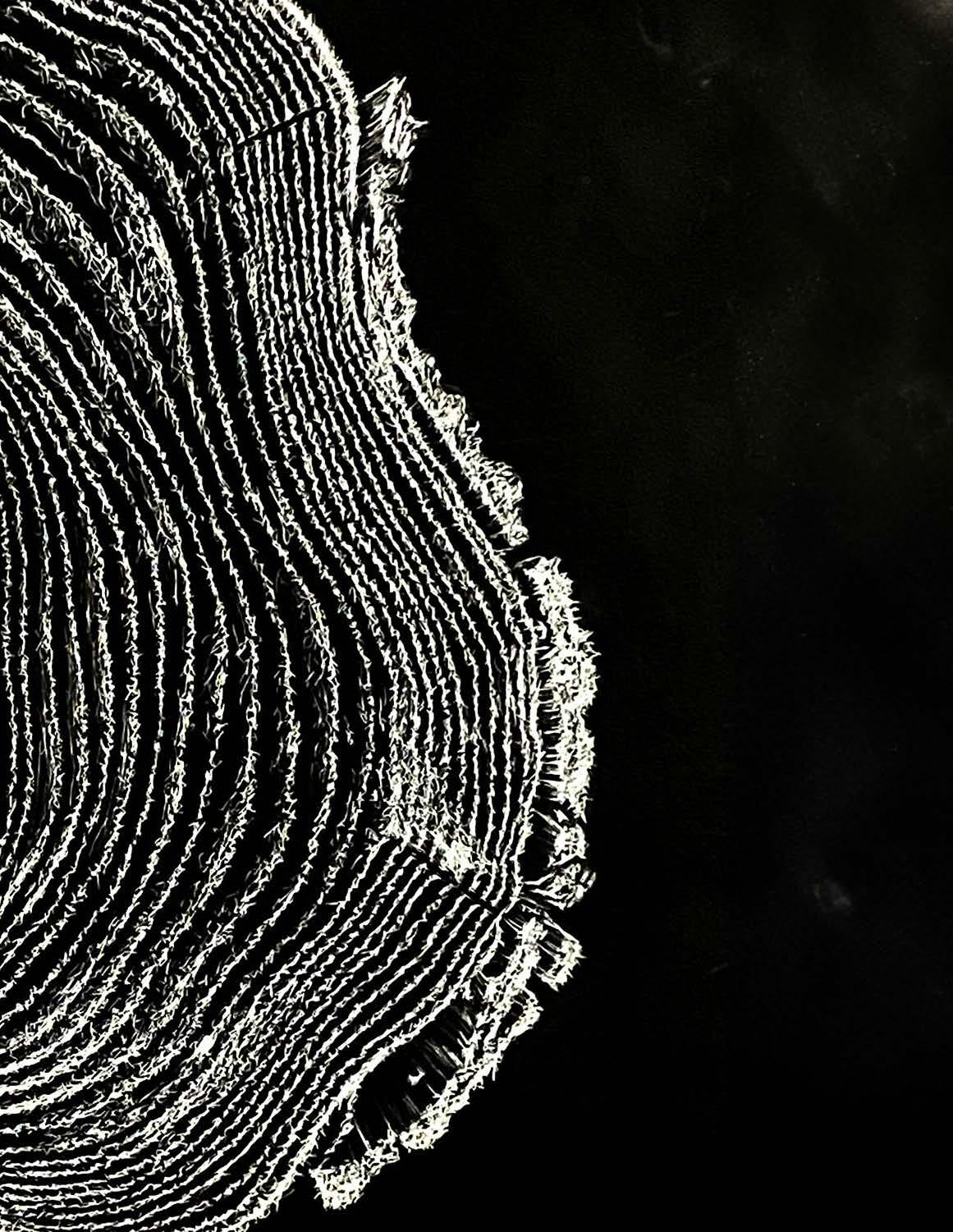
MAGAZINE
WINTER
THE
2024 THE CHANGEMAKERS ISSUE
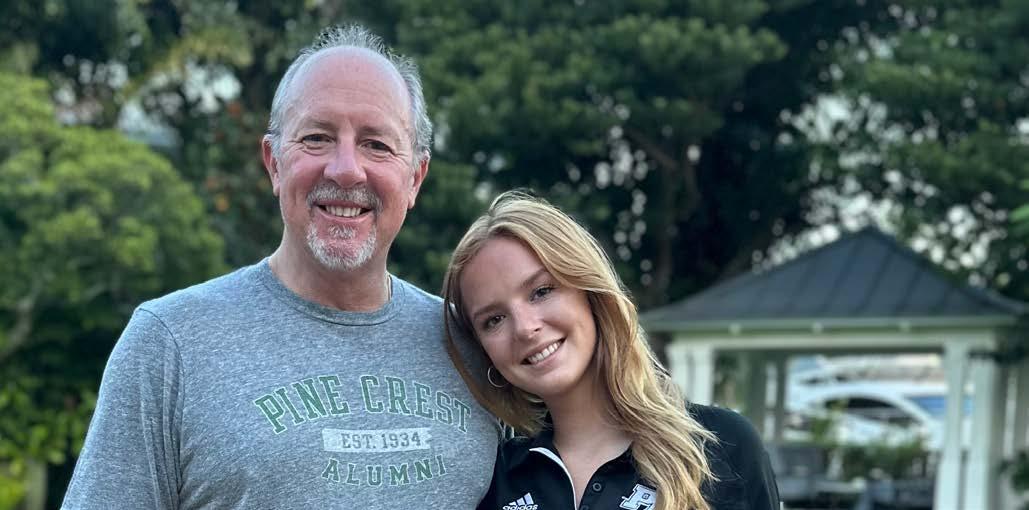
$7.3 M
IN FINANCIAL AIDS AWARDED FOR THE 2023-24 SCHOOL YEAR
WE ARE HONORED TO WELCOME NEW PANTHER LEGACY
FAMILIES TO PINE CREST FOR THE 2023-24 SCHOOL YEAR . Alumni credit their Pine Crest experience for shaping who they are today. This is the reason they have, in some cases, returned to Florida and have come back to Pine Crest. We are proud to recognize your family’s belief in our School!
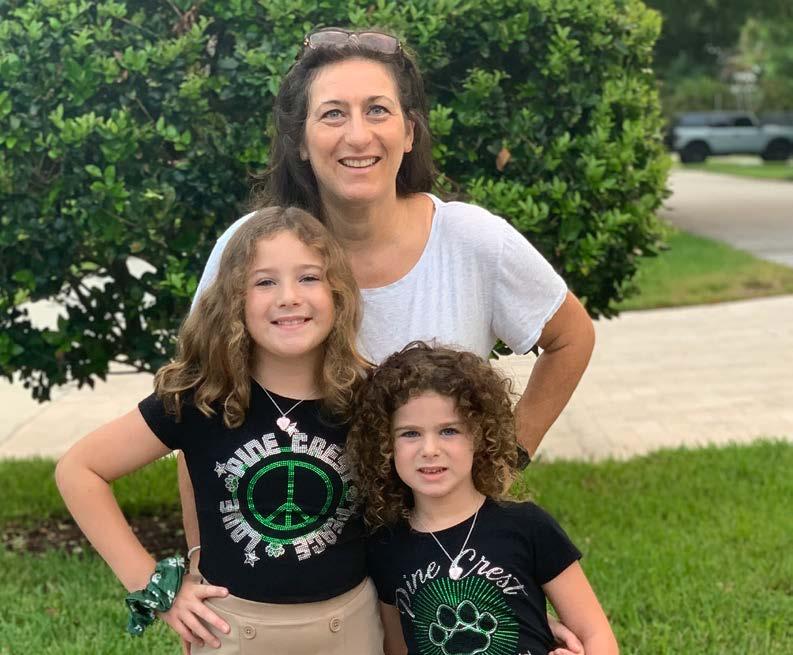
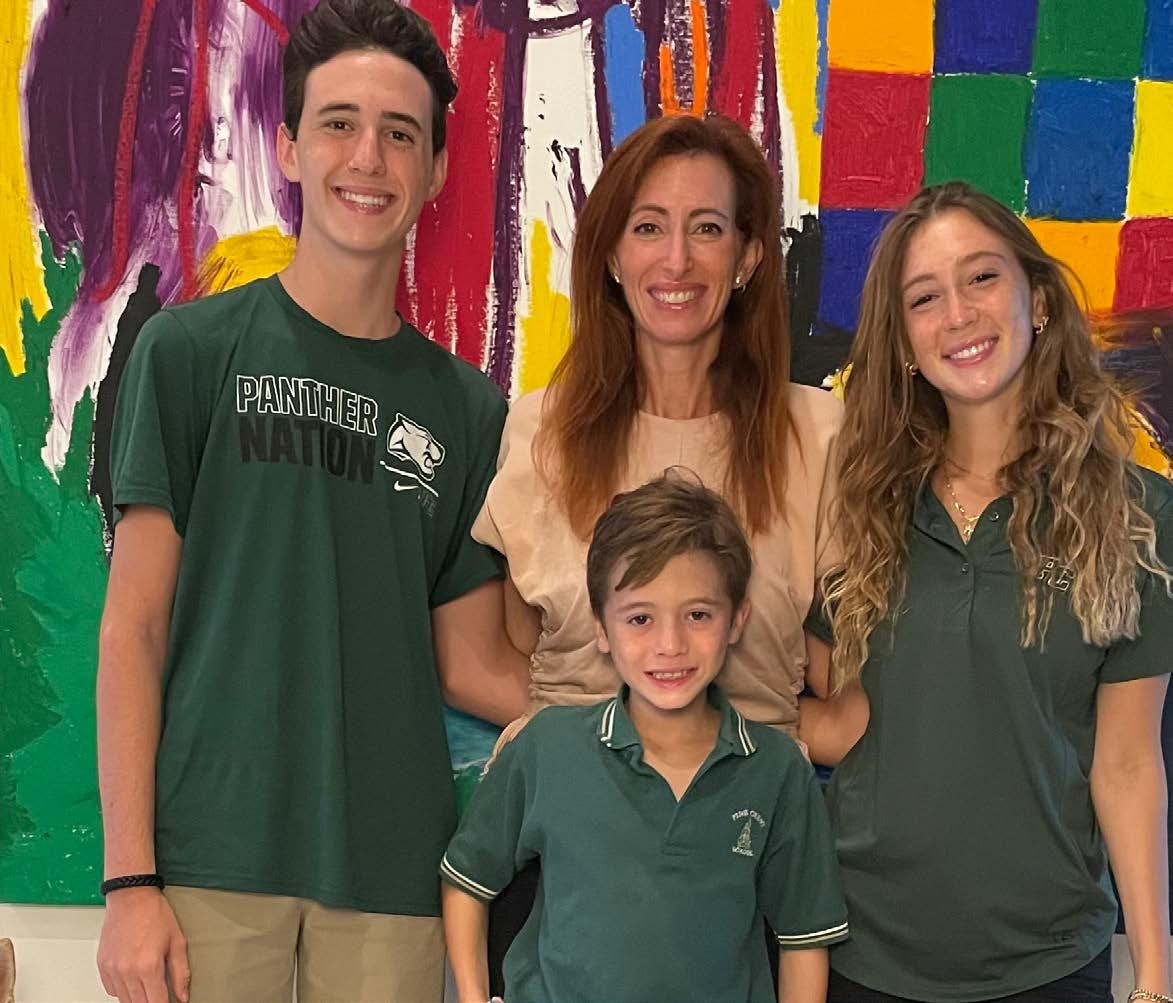
TO APPLY AND LEARN MORE, GO TO: www.pinecrest.edu/admission
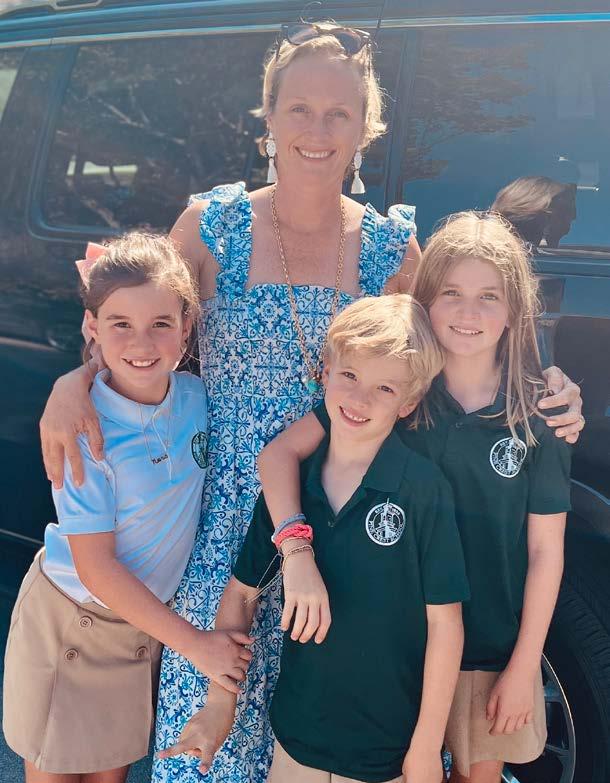
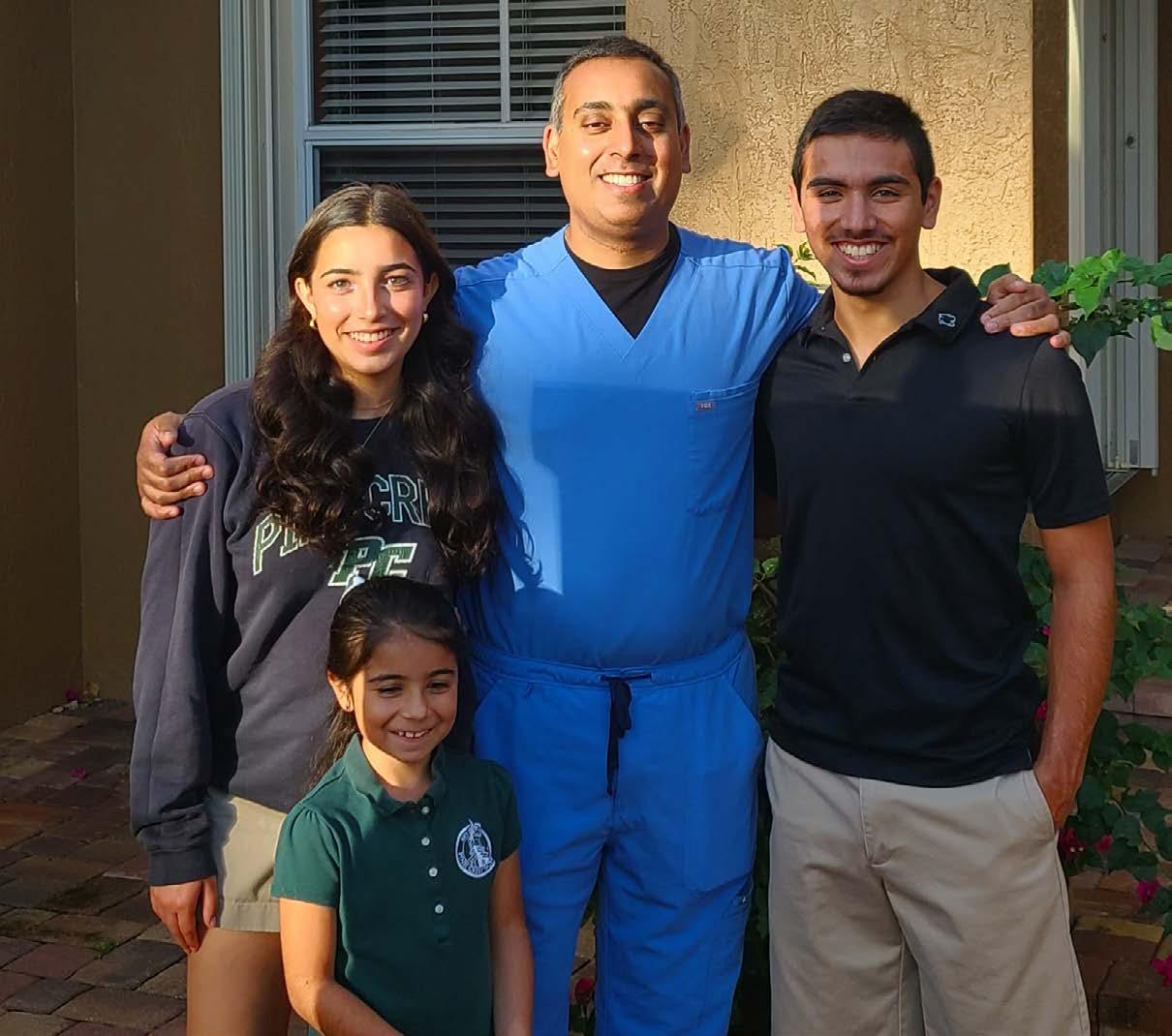
2 | PINE CREST SCHOOL
PINE CREST SCHOOL EXPERIENCE1
LEGACY STUDENTS ENROLLED AT PINE CREST 312 TEACHERS IN EVERY LOWER SCHOOL CLASSROOM 2 LOWER SCHOOL WEEKLY ENRICHMENT COURSES, STARTING IN PRE-KINDERGARTEN 7
ROBOTICS TEAMS 35
STEVE ’87 AND PAIGE ’24 HUDSON
MAYA ARISON ’92, LILA ’33, AND ELLA ’36 SPEIER
VANESSA (PORUDOMINSKY) ’93, MIA ’25, KOBI ’27, AND ZAK ’32 WEITZMAN
KATE (MURPHY) ’98, MONICA ’31, NORA ’33, AND JACK ’35 VOLTZ
SAMEER ’97, SHAUN ’24, ANJALI ’26, AND SARINA ’34 SATIJA
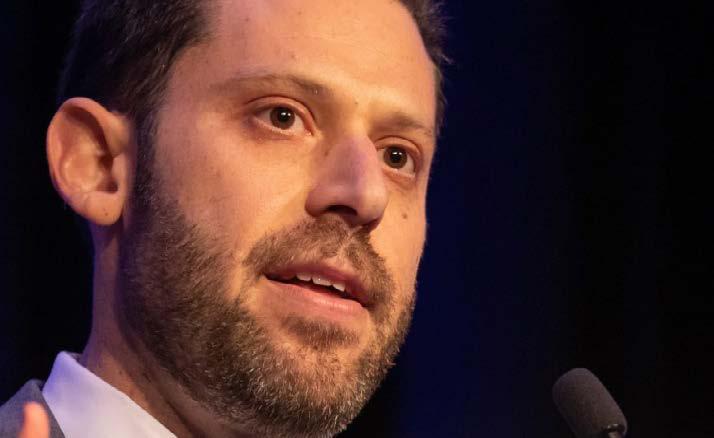
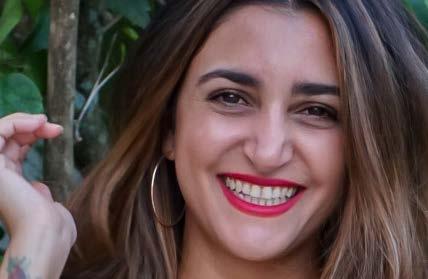
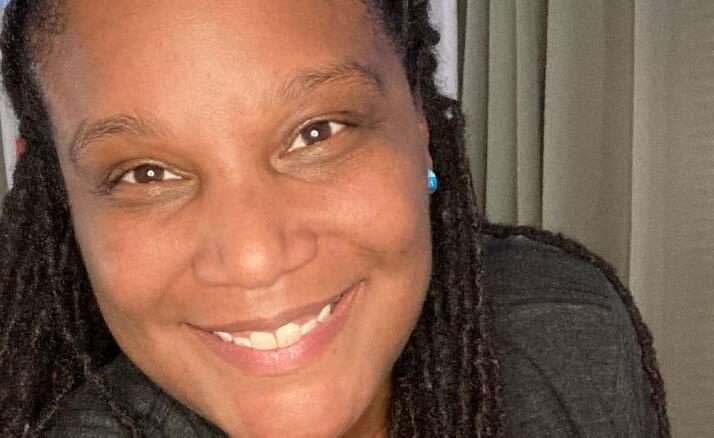
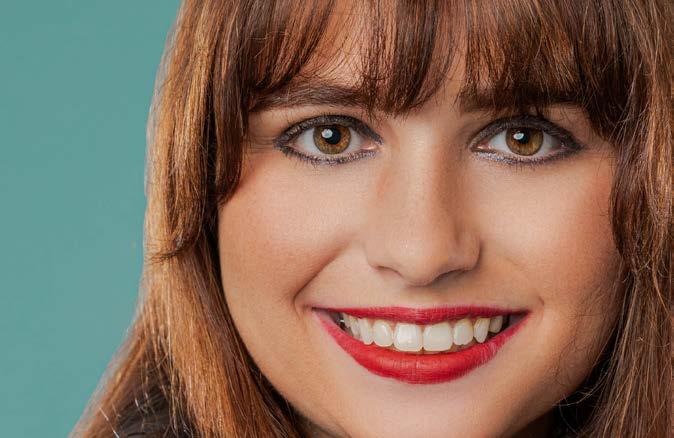
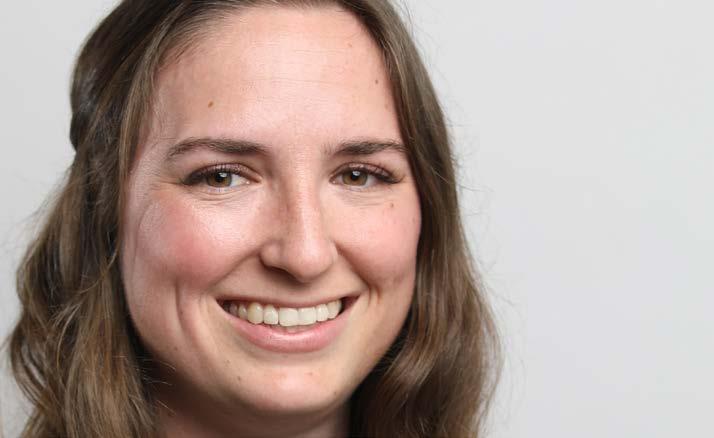
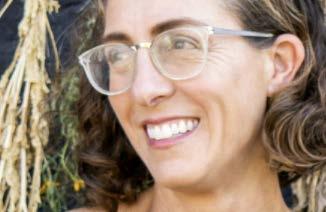
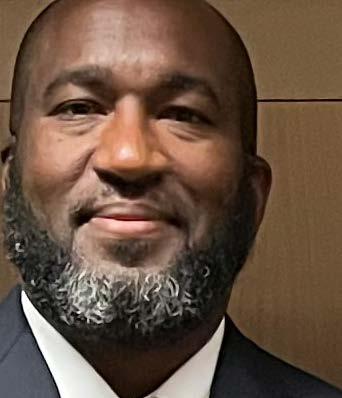
SHAPING THE FUTURE OF SCIENCE
FOSTERING THE ENTREPRENEURIAL SPIRIT LEADERSHIP
EDITORS
Christine Dardet
Andrea Vallejo
COVER ART
Leah Walters ’24
CONTRIBUTORS AND PROOFREADERS
Sara Pearl Adler ’24
Shatarah Betts
Jillian Conway
Kristi Combs, Ed.D.
Rachel Fallet-Lax
Jennifer Gordinier
Katherine Ganden
Meghan Hammond
Amanda Holender
Antoine Khouri
Keri Kolettis
Meagan Obst
Lisa Ockerman, Ed.D.
Logan Schwedelson ’25
DESIGNER
Michelle Samplin-Salgado
Red Sofa Designs, Inc.
PINE CREST SCHOOL | 3
ADVOCATING FOR GRIEFSUPPORTING COMMUNITIES ARON WEINGARD ’03
IN PODCASTS JAIME LEGAGNEUR ’97
EXPRESSIONS IN ALIGNMENT RAANAH AMJADI ’09 POWER
IN ACTION HALEY
’12
CHAMPION FOR EQUALITY STERLING CHAMPION ’08 FINDING WASTE IN WEALTH JENNIFER
’94 A LIFE IN MUSIC AND EDUCATION MR. ANTOINE KHOURI
ADVOCACY
MOSS
A
SILBERT
IN MIDDLE SCHOOL PINE CREST SCHOOL ATHLETICS REINTRODUCES WRESTLING 42 | 46 | 50 | 6 | 10 | 14 | 18 | 22 | 28 | 32 | THE CHANGEMAKERS Contents 36
CURRICULUM
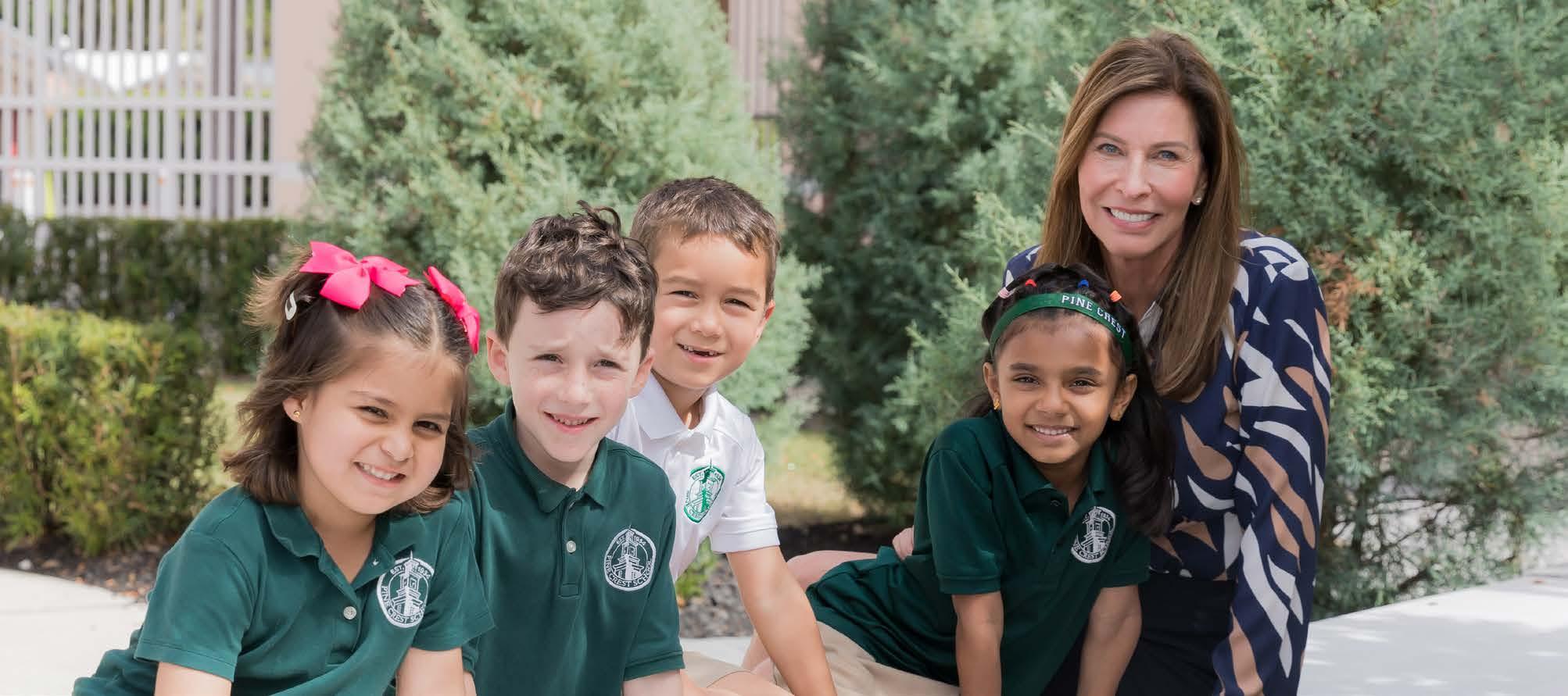
DEAR PINE CREST SCHOOL COMMUNITY,
IT IS TRUE THAT ONE OF THE FEW THINGS WE CAN CONSISTENTLY COUNT ON IN LIFE IS CHANGE. Indeed, change can be daunting, uncertain, and uncomfortable. Yet, progress is impossible without it.
Oftentimes, we are hesitant to act on a new idea because it is different, unproven, or imperfect, failing to realize that working through imperfection teaches us invaluable lessons, providing the framework necessary for the next triumph.
In this issue of The Magazine, you will be re-introduced to members of the community who truly embody the characteristics and values of a Pine Crest education; innovation, courage, compassion, persistence, leadership, and a growth mindset.
The individuals you will read about did not allow themselves to be defined by their failures. Rather, they employed forward thinking, understanding that each setback, both great and small, made room for new developments. Building on each challenge, these changemakers saw stepping stones to open the doors to the future, from giving a voice to local communities; shaping the future of science; advocating for those in their greatest time of need, to nurturing young entrepreneurs.
Stepping boldly into the future, readily avoiding a walk back into what is familiar
and comfortable, this collection of alumni, faculty, and staff was willing to take the risk of forging their own paths, no matter how unexpected or unconventional. Their breakthroughs were discovered in knowing when to pivot, when to put one idea to rest, and when to try something new. The individuals in this magazine have been set apart by the fact that they kept pushing forward with vision and empathy. They have focused their energies not on fighting the old, but embracing the new.
Perhaps most inspiring is that even with all they have accomplished, our changemakers have not stopped dreaming; they continue to push themselves, unwilling to settle into current successes, setting their sights instead on passionately pursuing more.
It is my hope that after you read this publication, you too will feel empowered, enlightened, inspired, and even propelled into action to become the change in the world that you want to see.
With gratitude,
 Dr. Dana Markham ’18H President
Dr. Dana Markham ’18H President
4 | PINE CREST SCHOOL
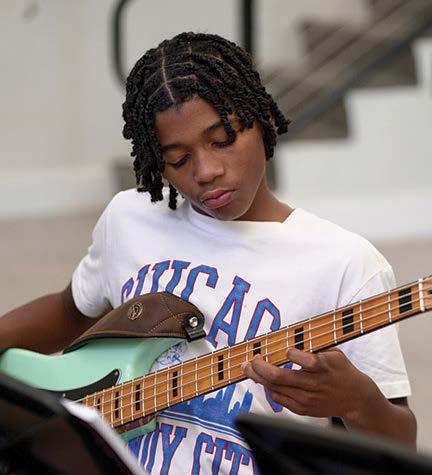
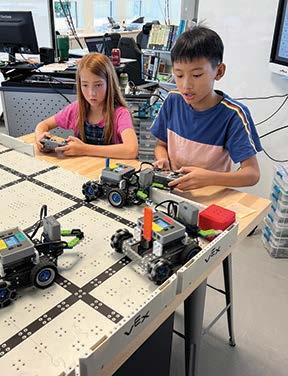
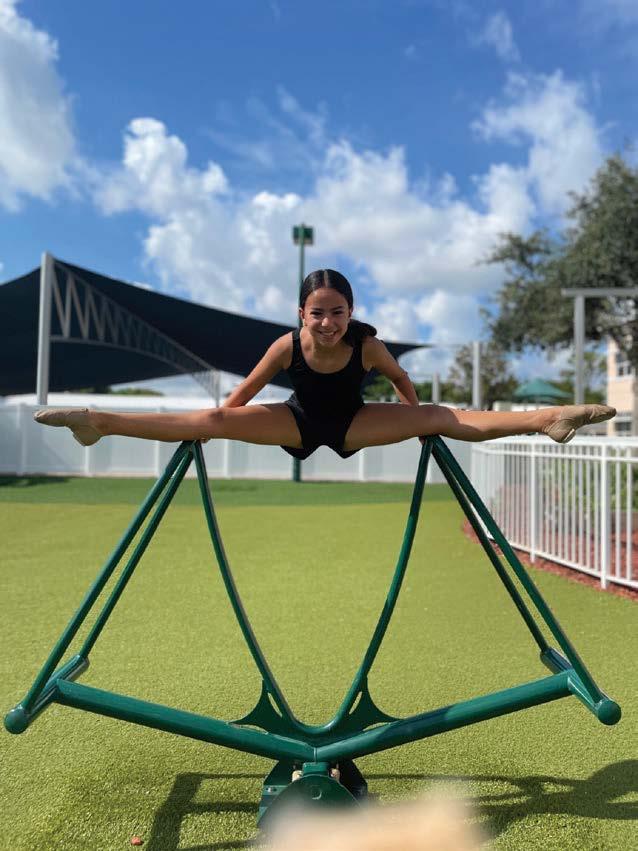
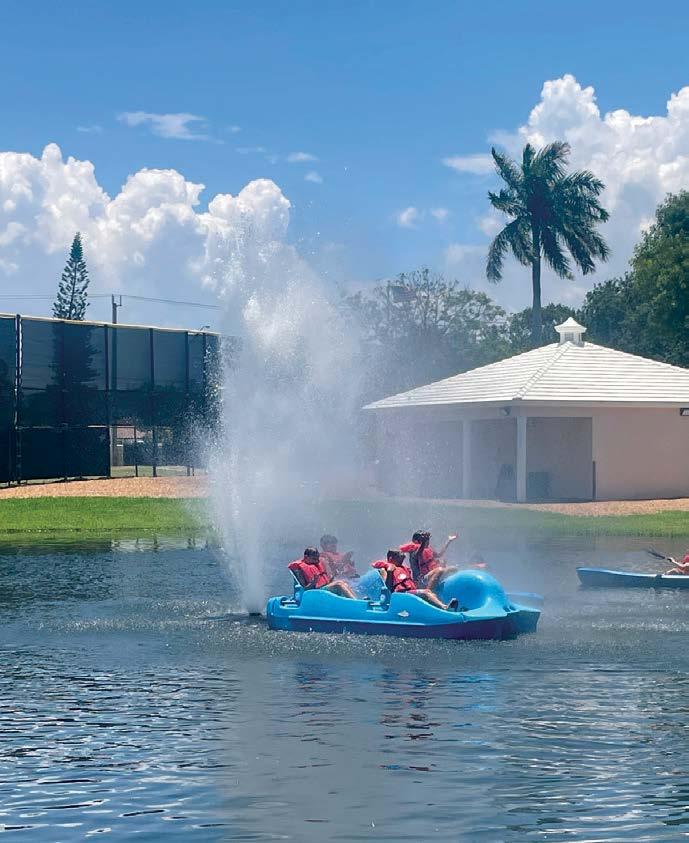
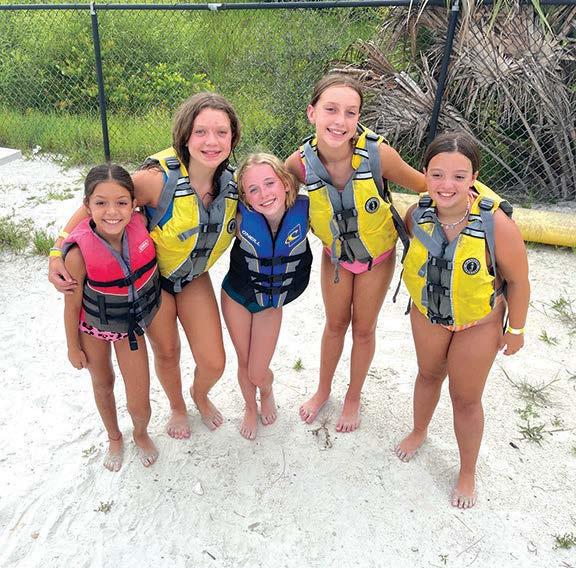
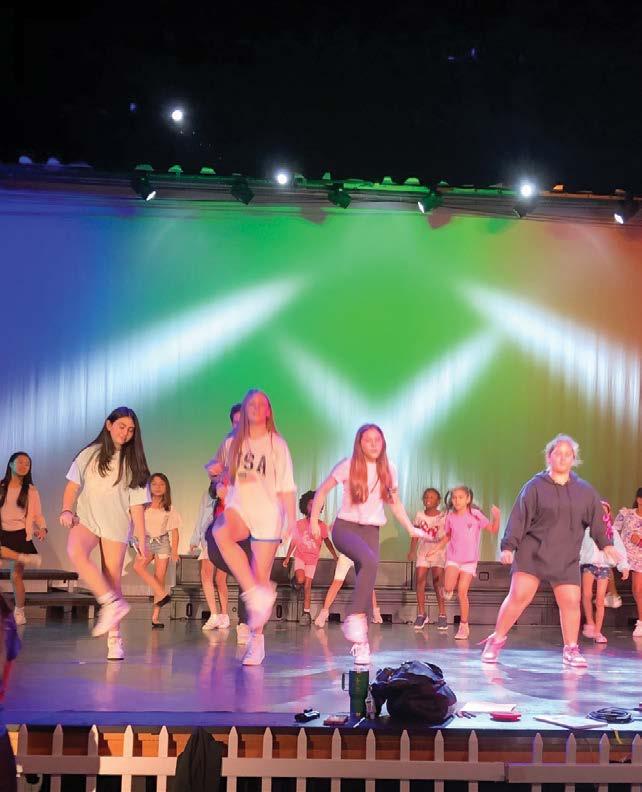
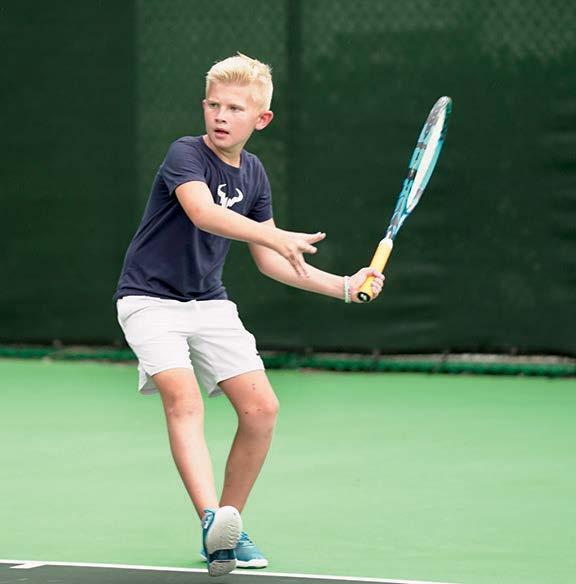
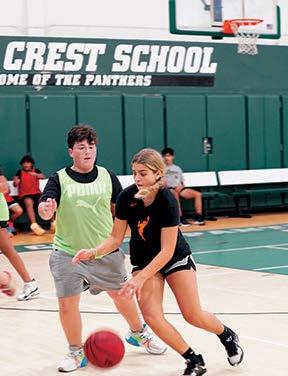
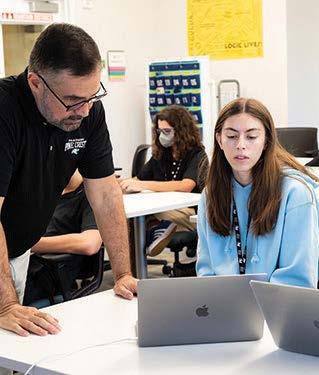
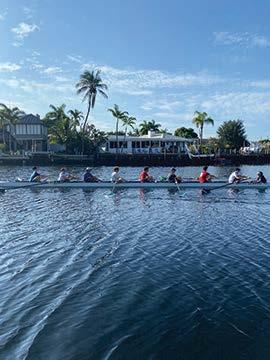
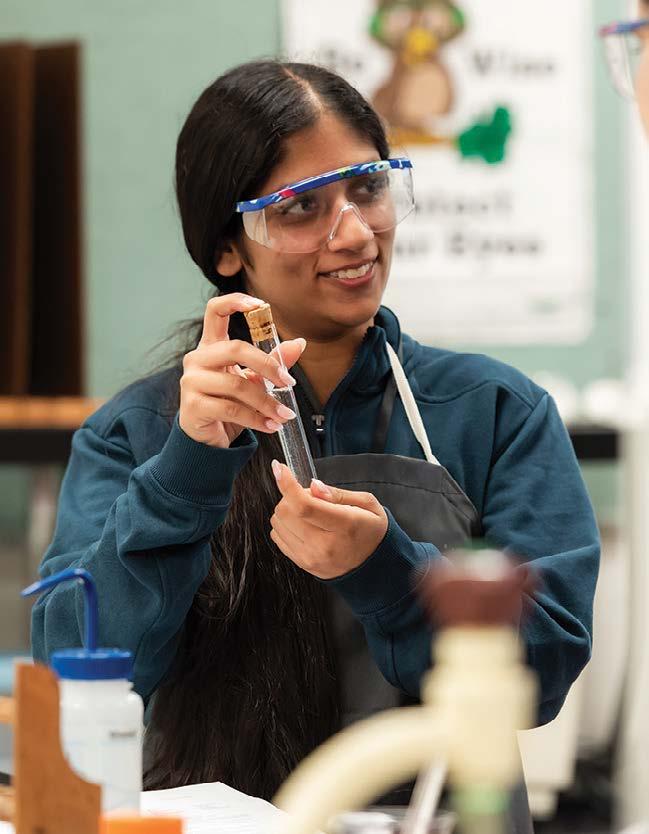
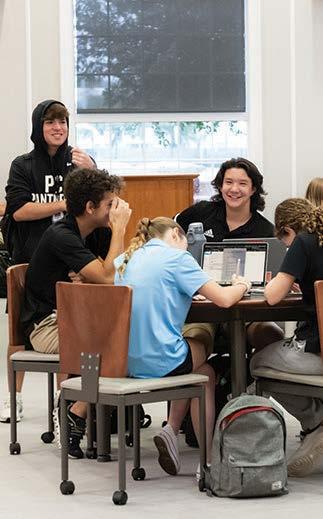
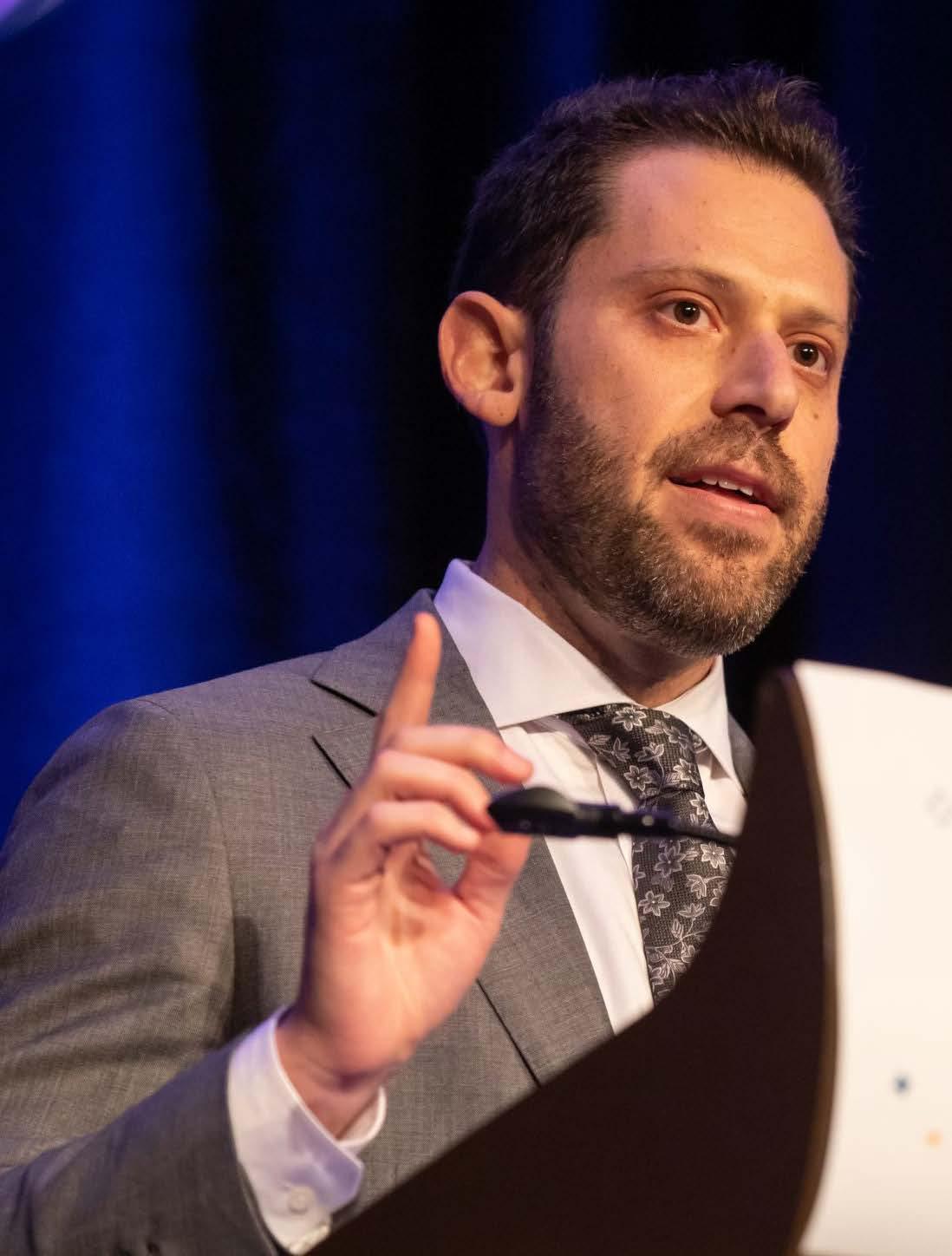
I AM PROUD THAT EXPERIENCE CAMPS IS LEADING THE WAY BY CULTIVATING A MORE EMPATHETIC, KIND, AND CONNECTED WORLD .”
–ARON WEINGARD ’03
CHANGEMAKER
Advocating for Grief-Supportive Communities
AARON WEINGARD ’03 RECALL S that some of his fondest childhood memories were attending a sleep-away camp in Maine. He was unaware of it at the time, but his connection to this camp would prove to be a profound influence on his life and the lives of thousands of grieving children.
Graduating from the University of Florida with a Bachelor of Science degree in Finance and then a Master of Science in Entrepreneurship, Aron’s career path led him initially to management and eventually to the wealth management industry. What is unique—and not an obvious step based on his background—is the fact that he has become a nationally recognized leader in the space of childhood grief.
“In 2009, I was approached by the owners of my childhood summer camp,” he said. “They asked me if I would help them start a one-week overnight camp for boys who had experienced the death of a parent, sibling, or primary caregiver. I jumped at the opportunity.”
“Experience Camps is a national, no-cost program for grieving children who have experienced the death of a parent, sibling or primary caregiver. Our one-week, overnight summer camp, yearround programs, and content help to reframe
the experience of grief and empower kids with the necessary coping skills to move forward with their lives. Through compassion, connection, and play, Experience Camps allows grieving children to embody a life full of hope and possibility.”
Aron has been a volunteer counselor for the last 15 years and currently serves on the Board of Directors as the Fundraising Chair and the Board Development and Governance Chair. He co-led the organization’s expansion, along with fellow alumnus Brian Klein ’03, to serve children from the Southeast of the United States. In 2022, he was recognized as America’s Most Charitable Wealth Advisor under 45 by the Invest In Others Charitable Foundation.
“There are 6 million grieving children in the country,” said Aron. “We have grown the camp program from hosting 27 boys at one location to helping thousands of children across programs in Georgia, Maine, Pennsylvania, Michigan, California, and most recently, Washington, D.C. and Hawaii.”
He continued saying, “Sadly, the only thing guaranteed in life is death, yet 70% of Americans say they don’t know what to say or do when someone is grieving. Beyond the week-long camp,
PINE CREST SCHOOL | 7
Experience Camps is leading the national effort to create a grief-supportive culture.”
“A grief-supportive society is composed of people who feel more comfortable and better equipped to support those around them who are grieving—from classmates, friends, coworkers, and family members,” said Aron. “Experience Camps has done an amazing job of simplifying things to make a situation that often feels overwhelming, intimidating, and abstract—especially for those who haven’t experienced death in their own lives—easier to navigate.”
“Grief never goes away, and it can hit you at unexpected times,” he continued. “We’re seeing more grief-conscious actions—there have been significant efforts among corporations to give customers the option to opt out of Mother’s Day emails, for example, because those types of holidays are very hard for grieving people.”
Experience Camps works across the country, year-round to raise awareness with local childhood grief-support organizations, religious organizations, and schools.
“We do that in a number of ways,” said Aron. “We have published thought leadership on the topic and launched a campaign to help people talk about grief, going beyond ‘sorry for your loss.’ We host and speak on panels, publish articles— we also have a huge social media presence reaching millions, especially on TikTok and Instagram.”
EXPERIENCE CAMPS IS A PLACE WHERE KIDS CAN GO TO LEARN THEY AREN’T ALONE. THEY MAKE GREAT FRIENDS, REDISCOVER JOY, AND ULTIMATELY GAIN CONFIDENCE IN THEMSELVES AND THEIR FUTURES.”
“One of our goals is to impact children beyond the bunk and reach them where they are. For many kids today, that happens through gaming,” he said. In collaboration with Connected Camps, an online learning platform powered by youth Minecraft experts, Experience Camps launched ‘ExperienceCraft.’ ExperienceCraft is a server on Minecraft for children aged nine to 16 who have experienced the death of a parent, primary caregiver, or sibling.
The goal of ExperienceCraft is to provide an opportunity for grieving children to connect year-round as they play Minecraft. Like the summer camps, there is a mixture of volunteers and paid clinicians moderating the server, and it has been designed to be fun. The server features building challenges and a memorial garden where children can honor their loved ones. ExperienceCraft was named a finalist in Fast Company’s Innovation by Design Award, which honors the best design in software or digital products.
“Experience Camps is a place where kids can go to learn they aren’t alone,” he said. “They make great friends, rediscover joy, and ultimately gain confidence in themselves and their futures. The organization is primarily staffed by volunteers, 10 of whom graduated from Pine Crest. Ashley Laughlin ’02 serves as the National Senior Program Manager and Brian Klein ’03, who served as the founding Program Director for the boy’s Southeast camp, recently joined our Board of Directors. It is special that so many fellow Pine Crest alumni have dedicated their time to the program and it has been incredible to watch them make a life-changing impact for themselves and hundreds of children.”
Sharing what the camp experience is like, Aron said “The camp is 80% play and 20% organized bereavement activities facilitated by licensed clinicians. We offer group therapy, art, music, and writing; kids feel comfortable expressing grief in different ways so it’s important to provide a diversity of outlets for them.”
Aron shared one aspect of his work that motivates him to continue pushing forward, and that is the transformation he’s witnessed among countless campers.
“It is amazing to see children come back year after year,” he said. “One of our campers said that it was during the first summer that he realized he wasn’t alone. The second year, he learned he could talk about his sister who had passed away. The third year, he learned he could help young boys who felt like he did not long ago.”
Looking ahead, Aron is invigorated about the organization’s expansion to open more camps, create a grief-supportive cul-
8 | PINE CREST SCHOOL
ture in the United States, and reach more of the country’s 6 million affected children through innovative technologies and partnerships.
“There are three ways people can support Experience Camps—and ultimately children that are grieving,” Aron said.
• Help us reach more grieving children—you can introduce individuals, families, or institutions (churches, synagogues, hospitals) to our organization.
• Help us support grieving children by volunteering as a counselor—the heart of Experience Camps is our volunteer base. It’ll be the best experience of your life!
• Help us serve more grieving children via financially supporting—donate or refer us to a foundation.
The growth of the program over 15 years has been astounding. I am proud that Experience Camps is leading the way by cultivating a more empathetic, kind, and connected world.”
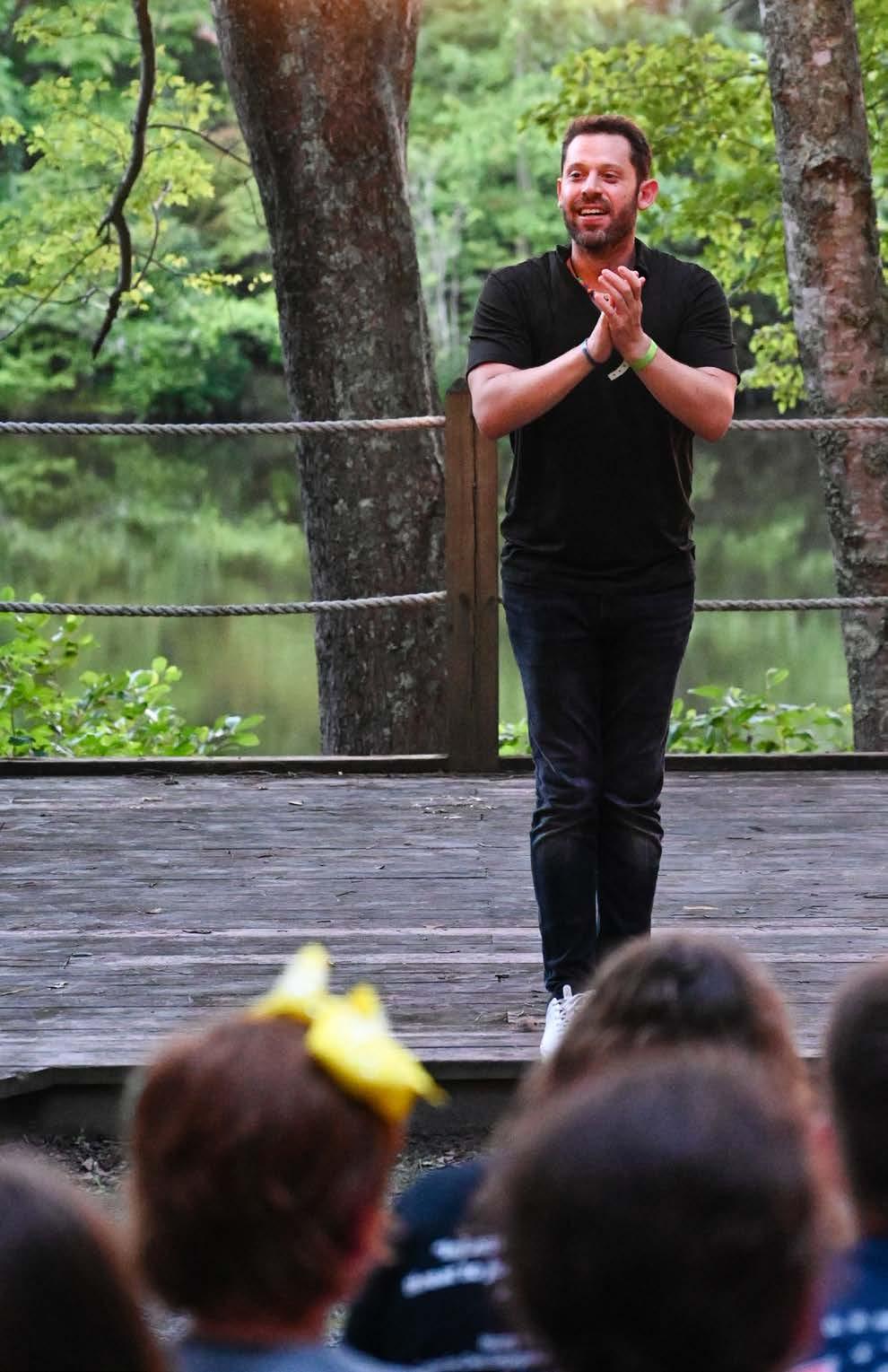
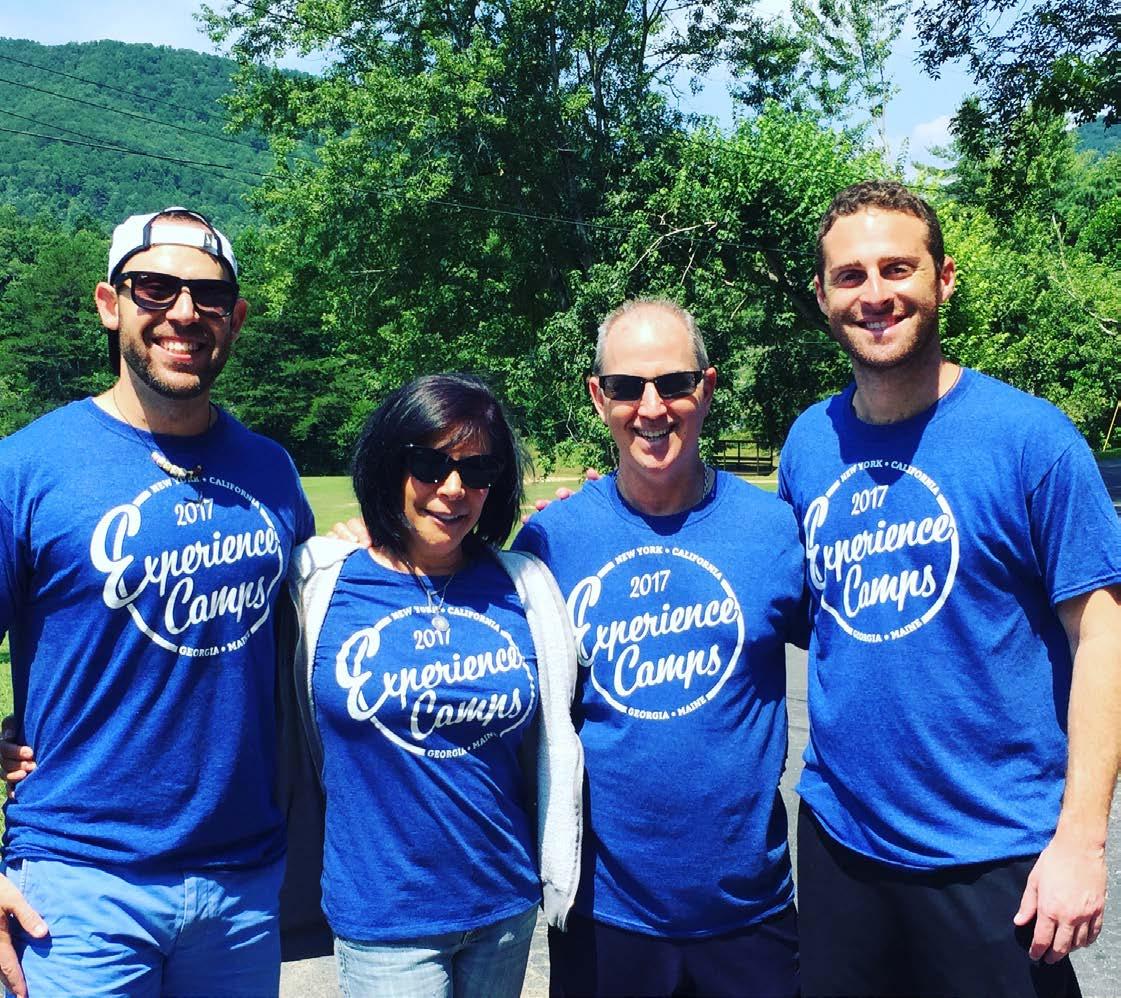
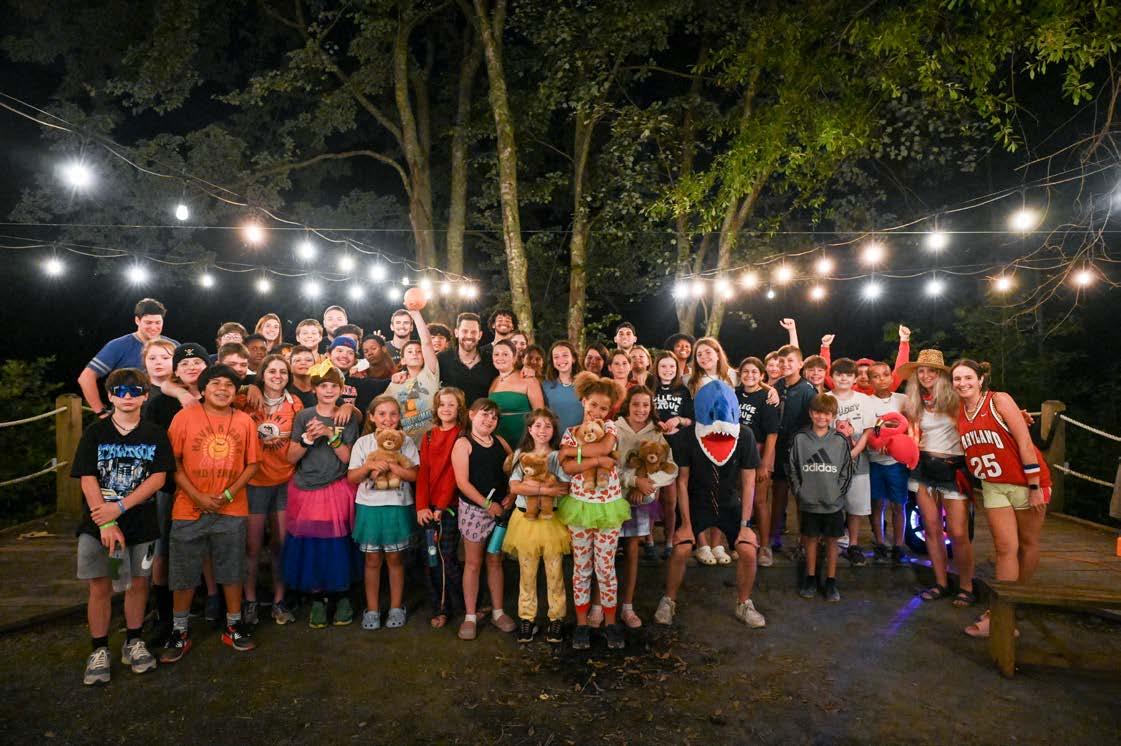
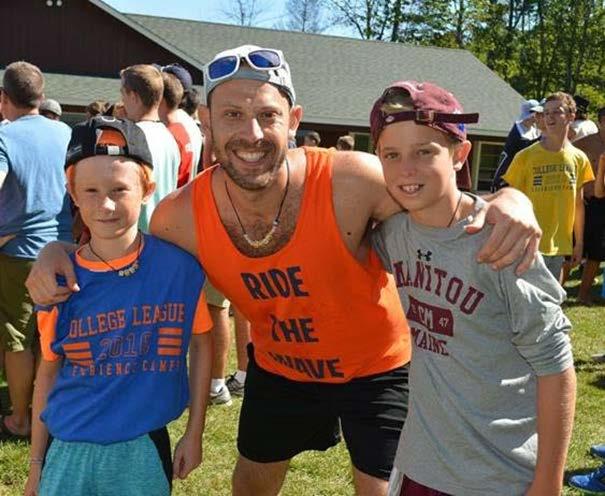
PINE CREST SCHOOL | 9

I HAVE THE PRIVILEGE OF HELPING PEOPLE TAKE THE FIRST STEP TOWARD BECOMING AWARE OF THEIR MIND-BODY SYSTEMS ...SO THEY CAN PLACE THEIR OWN WELLBEING AT THE CENTER OF THEIR LIVES.”
–RAANAH AMJADI ’09
CHANGEMAKER
Expressions in Alignment
AAS A SENIOR COMMUNICATIONS MANAGER at the high-pressure, high-production institution that is Microsoft, Pine Crest alumna Raanah Amjadi ’09 was also highly visible within the company. “I started working for Microsoft right out of college, and a lot of my time there in the beginning was figuring out what I did not want to do,” Raanah says. “I wasn’t an engineer and I wasn’t someone who wanted to be in spreadsheets all day. Halfway through my experience, I had tried several different things and eventually started down this path of storytelling through marketing and communications. That path then led to me doing some really incredible things like presenting with the CEO of Microsoft.”
Raanah explains how her time at Pine Crest helped lay some of the foundation for finding her niche. “In high school, I was a total drama fanatic,” she said. “Mr. Harrington really helped me nurture that part of myself. I thought that stage in my life would be over as an adult, so finding a new relationship with performance through keynotes and product demos at Microsoft was wonderful. I was really enjoying my time there— then Covid hit.”
In 2020, at the height of the COVID-19 pandemic, Raanah says that everything began to shift for her. “With COVID, I just started experiencing severe burnout,” she said. “My routine was very mundane; I was in isolation, I wasn’t going anywhere, and I essentially took the same 800 steps around my house over and over daily.”
Feeling the stress and anxiety of the circumstances, Raanah decided to take six weeks of mental health leave. She left her home in Washington for some of that time and returned to Florida, seeking to reflect and reset. “My body
was super safe, but my mind was in chaos. I was feeling so much stress, so much grief, so much fear, constant stimulation, and it all felt very disjointed. So when I went home to Florida, my intention was to re-align the two—mind and body. I needed to pull away from the virtual world and focus on just the basics of health. That meant eating really nourishing foods, moving my body, and being surrounded by family and community.”
Raanah goes on to explain the silver lining she was able to find in her personal COVID experience. “While this pandemic was terribly tragic and heart-wrenching for so many,” she said, “I do think that for many other people, it granted perspective on how they wanted to live their lives for their own values and morals, particularly when the world was seemingly on fire. For me, those early days of quarantine allowed me to strip away many of the distractions and hone in on the most important things to me, which were holistic selfcare, service, togetherness, community, and being in relationships with people.”
Raanah describes the catalyst for starting on the path toward a major career change.
“It was in these moments at home that I began to realize one of the biggest things I love about my culture, Persian culture, is understanding that food is medicine, and our relationship with that,” Raanah said. “Ayurveda, which is the nutritional sister science to yoga, really was a huge influence on why my culture has this knowledge. I immediately felt strongly connected with it.” According to the Johns Hopkins Medicine online portal, Ayurveda is a “natural system of medicine that originated in India over 3,000 years ago.” While it loosely translates as “knowledge of life,” it is rooted in the belief that health and wellness
PINE CREST SCHOOL | 11
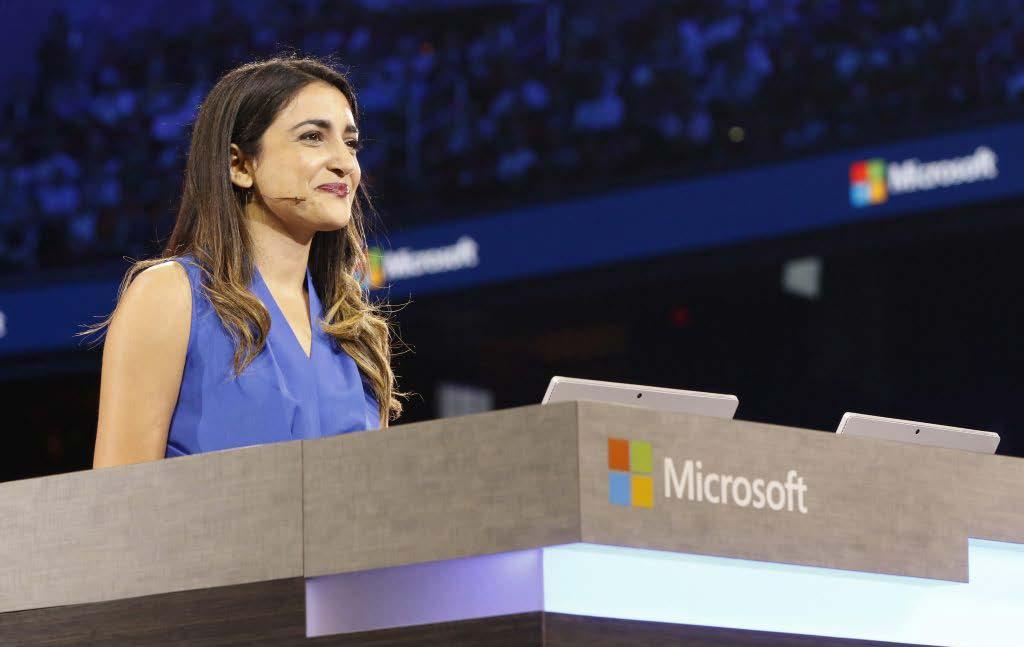
depend on a delicate balance between mind, body, and spirit.
“Being in Florida is when all of those elements just came back to center for me,” Raanah said. ”So I decided to try something new, and I signed up for an Ayurvedic wellness counselor program. I figured, best case scenario, it would be a potential new career path, and worst case scenario, I would just end up learning some good stuff for myself. Two months in, I realized that this is what I wanted to do. I also knew that I wanted my definition of impact to be closer to home, so I made plans to quit my Microsoft job in December 2021, which was challenging.”
Some may view leaving a lucrative, high-powered corporate career as drastic, unwise or even irrational. But Raanah explains why she felt comfortable with making the change. “Growing up in the high-achieving Pine Crest culture and then going into a high-achieving Duke culture and moving directly into a high-achieving Microsoft culture, you have a very specific lens on success and how that looks. Why would you just walk away from that, right? Why would you leave the fast track and the security? But for me, it was just realizing that the corporate institution wasn’t going away. And all of my collective experience was coming with me—that part I wouldn’t lose. So this became my time to experiment with the structure of my life; experiment to see what stuck.”
Raanah launched her business, Lili Jade, a combination of both her mother’s maiden name and her father’s surname, in March 2022. Currently, Raanah’s credentials include Certified Ayurvedic Wellness Counselor, certified life coach, and postpartum doula. Her objective is to help clients realign with their well-being to find self-sustaining joy, purpose, and vitality. She provides an array of services that include one-on-one coaching, group workshops, and strategic consulting, all serving to teach clients how to identify and sustain balance.
“Through this work, it’s been fascinating to see just how many people don’t listen to their bodies, because they don’t know how,” Raanah said. “In American culture, we get used to living with ailments, like heartburn for example, and we grow to accept them as part of life. Everything we see on TV sells us quick fixes for physical or mental symptoms of imbalance; we’re so focused on management that we forget these symptoms are signals that something isn’t working right within our system. Instead of slapping a band-aid on things, I want to support people in shifting their understanding of the root causes of their issues so they can address those things holistically, for the long term.”
Raanah’s passion is evident as she continues reflecting. “I love what I do; I love that I actually have an opportunity to be in service to people directly, and that my definition of community has
been expanding. I have the privilege of helping people take the first step toward becoming aware of their mind-body systems and coaching them through their challenges so they can place their own well-being at the center of their lives.”
Raanah shares the long-term vision for her company. “The goal I have for all of my clients is for them to do a couple of sessions with me, and then never come back. I want my profession to become obsolete overtime. My goal is for people not to need a health or wellness counselor anymore because knowledge and understanding of one’s well-being become widespread and individuals have the skills to apply as needed.”
Raanah wasn’t aware at the time that she started this journey, but the enthusiasm for her new found purpose would soon be tested.
“I was diagnosed with multiple sclerosis (MS) in July of 2022, and that’s been fun.” The sarcasm and humor in Raanah’s voice are not lost as she begins describing another unexpected turn of events in her life. “I went on a family trip to Italy, and we were eating delicious food and drinking all the good wine, but it was so hot – in the 90s everyday. About a week into the trip, I started to lose sight in my left eye. It was like a black curtain descended into my field of vision, and I could tell that it seemed worse in the heat. It was horrifying, but even more so in a foreign country, away from all the comforts of my own medical system.”
After a few appointments with local doctors, it was determined that Raanah was suffering from optic neuritis, or inflammation within her optic nerve. “When I returned home, I completed additional testing, bloodwork and an MRI. While I was waiting for the results of the MRI, my right hand and arm began to go numb and weak and I couldn’t grip very well. Then I started having electrical shock sensations move up and down my leg, and at that point I felt like I already knew that it was going to be MS.”
The Mayo Clinic defines MS as a “potentially disabling disease of the
12 | PINE CREST SCHOOL
brain and central nervous system, where the immune system attacks the protective sheath of nerve fibers, causing disruptions in the communications between the brain and the rest of the body.” Currently there is no cure for the disease, but there are treatments that can aid in recovery from the attacks, manage symptoms, or even alter the course of the disease.
“My diagnosis was confirmed within the next week,” says Raanah, “and it was tough. I won’t run from that. Many years ago, this disease represented something very different; for most people, it meant a near-complete loss in abilities and quality of life. But treatments have come a long way, and luckily my disease progression was identified really early before there had been enough time for my body’s systems to deteriorate significantly.”
Given the changes Raanah had made in her profession, she shares that she felt better equipped to face the disease head-on. “Even though I’d gladly give it back any day, the recent change in my career and my journey toward a more holistic approach to all the things in my life left me feeling like I had been training for this moment,” she says. “In a weird way, it was easier for me to integrate my ‘new normal’ because it felt like another layer of purpose. If I can tackle my own diagnosis and help someone else living with MS move through it with grace and ease, then I’m ok with that.”
As Raanah continues, she describes how things feel like they are coming full circle for her. “When I graduated from Duke and moved from my family across the continental U.S., I realized that finding my own relationship with culture and community was important to me. I feel like this journey I’m on is my own way of carrying my culture forward, even if I’m doing it in a context that’s ‘non-Persian.’ But I also see the kinship and togetherness reflected in the Pine Crest community. I was a lifer, and I grew up with my classmates.”
Raanah becomes emotional as she recalls sharing her diagnosis for the first time publicly. “Friends from Pine Crest that I hadn’t spoken to in years began
pouring out love and support in ways I couldn’t begin to fathom, even more so than friends from other chapters of my life. There’s just something special when you grow up with someone. You know their parents and you’ve been in each other’s homes. We’ve seen one another evolve from goofy little kids into phenomenal adults. So even when it’s something that I am not always tapped into, it’s nice to know that the Pine Crest community is always there.”
Thinking back fondly of her time at Pine Crest, Raanah has parting words of wisdom to share with current students, particularly the seniors. “Don’t discount your joy. I think going to school in such a prestigious, high-achieving environment lends for many potential pathways and careers that are all meaningful. But as you go through that process, pay attention to what lights you up. What about a certain experience leads to the joy and the energy that sustains you? It’s ok if it’s not your job. It’s ok if the thing that makes you happy doesn’t make money. Feeling that bliss is your body’s way of telling you that you are in alignment with something. Do the work to find out what that something is. Don’t stop at the face value of that experience, but go deeper. Then you can pattern match, and you can go find those qualities in the other elements of your life, and you too can find what nourishes your soul.”
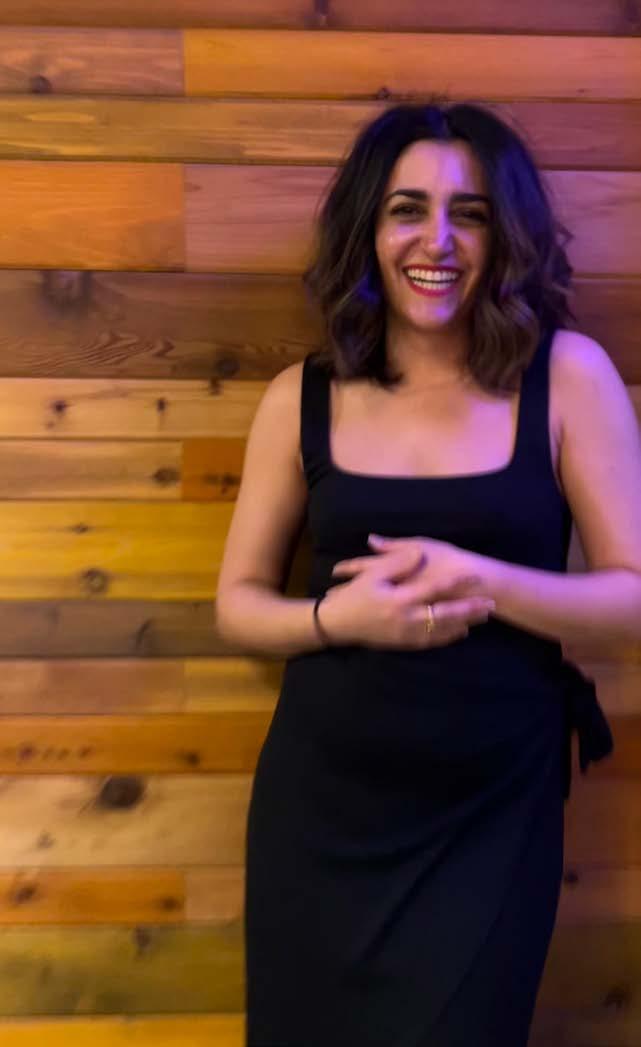


IF I CAN TACKLE MY OWN DIAGNOSIS AND HELP SOMEONE ELSE LIVING WITH MS MOVE THROUGH IT WITH GRACE AND EASE , THEN I’M OK WITH THAT.”
PINE CREST SCHOOL | 13
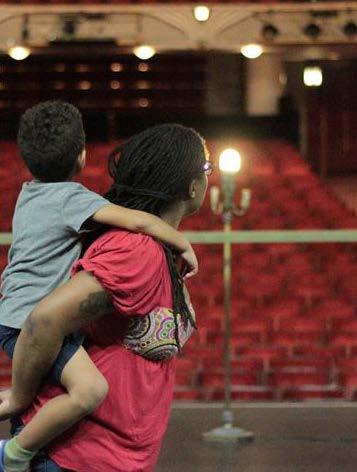
I FELT I COULD BRING WOMEN TOGETHER AND HELP OTHER MOMS BE SUCCESSFUL. THAT IS HOW I STARTED THE POWER MOMS NETWORK— AND THAT IS SOMETHING I AM REALLY EXCITED ABOUT. ”
–JAIME LEGAGNEUR ’97
The Power of Podcasts
JJAIME LEGAGNEUR ’97 HAS BEEN PROACTIVE IN THE PURSUIT OF HER EDUCATIONAL AND CAREER GOALS since graduating from Pine Crest. Wanting to experience something new while staying warm, Jaime attended Tulane University in New Orleans for her undergraduate degree.
“It was such a great decision because my parents are from Haiti, and the cultural background and influences in New Orleans felt like taking a piece of home with me while still being able to experience something very new and different.”
“I fell in love with my AP Psych class while at Pine Crest. I was fascinated with the mind and wanted to continue those studies. My father encouraged me to consider going to medical school, taking a path toward psychiatry. I thought about it, and decided to become an EMT while I was in school instead; it was a less formal route, and I didn’t end up pursuing psychology medically,” Jaime said.
While she loved studying psychology, she was exposed to an entirely different subject matter that changed Jaime’s career trajectory. “As a sophomore, I had the opportunity to sit in on a financial accounting class at the business school, and was shocked that I loved it! I thought ‘Hmm…I think I want to go into business.’ My dad is an entrepreneurial person and that felt like a good fit for me. At the time, Tulane had four majors in the business school. I wanted to study information systems management, but that degree program was in the engineering school which had a bunch of classes I wasn’t really interested in taking. So, I took a look at the curriculum of the business school and pitched a new major for Information Systems Management to the Dean of the Business School, and they accepted it! So I double majored in information systems management and finance with a minor in psychology.”
After graduating from Tulane, and seeing her brother complete his law degree, Jaime decided to
apply to law school. She attended the law school at the University of Virginia, but quickly found that it was not for her. At that point, Jaime went back to her “plan A:” information systems. “I had been fascinated with computers ever since I was a child and my dad brought home a ‘throw away’ computer from his office. I decided to start a career in data analytics, and I applied for an entry level position at a company. During the interview process, I noticed that there was a position available for a structured query language (SQL) reporting analyst and decided that was what I would like to do. I asked if it would be possible for me to accept the entry level role I applied for while being trained in tandem by the manager of that department to move into the SQL role,” she explained.
“When the manager in the reporting department heard that, he wanted to speak to me directly. He gave me two weeks to learn the coding language and said if I passed a test I could have the role. So I ran to the library and got a book on SQL and just poured myself into it. I learned SQL and got the job! That started my 15-year career as a data analyst.”
While a career in data analytics was enjoyable, Jaime shared that after 14 years in the field, she was beginning to feel unfulfilled. “I had gone as far as I could go,” she said. “I started to look for something new and different so I wouldn’t feel so stuck. I had no idea what that new and different was, but I was hungry for a change—and then it landed in my lap!”
A long time fan of a local radio show, the KVJ Show, Jaime remembers when radio shows began re-posting their broadcasts as podcasts. “I loved listening to their morning show,” she said, “and when they would flip their show to the podcast, I would listen to it on repeat!” The show was purchased by another media company and began to change, upsetting superfans like Jaime.
PINE CREST SCHOOL | 15
CHANGEMAKER
“I was afraid they were going to take it off the air,” she said. “I reached out to the radio hosts to see what I could do. I started a campaign on X (formerly known as Twitter) and then joined forces with another fan who was doing the same on Facebook. We took the ‘KVJ Nation’ name and built a campaign around it. We created a big enough fuss that we ended up on the news, and other radio shows even began talking about what we were doing. Our campaign worked, and the show is still on the air today,” said Jaime excitedly.
Running this campaign uncovered a hidden talent Jaime had for digital marketing. “I thought ‘maybe this is the answer!’ That is what fell in my lap— something to highlight my untapped potential in digital marketing,” she said. “I felt that if I created my own business doing digital marketing then I’d be doing what I love for a living. But that was immediately followed by ‘how do you build a business doing what you love?’ Then I realized, ‘I have a bunch of friends doing what they love, so I should ask them!’”
Shortly thereafter, Jaime created her first podcast, a show called “Curve the Cube” in 2014. Recording a podcast meant that Jaime could share the insight and thoughts of her friends to inspire others. “The show was kind of a hit,” she continued. “I interviewed people where they were. I got to interview congresswoman Lois Frankel; my friend and fellow Pine Crest alumni Amir Arison ’96, David Abeles ’97, and many others from the Pine Crest community!”
In 2017, Jaime attended Podfest, a podcasting conference where she decided to conduct short interviews with podcasters about why they love podcasting, and produce an episode from it. Throughout the process, Jaime said two things happened. First, her love for the medium was reaffirmed, and she better understood the power and impact of podcasts on communities and listeners. Secondly, she met many people who became a support system for her. Through this network, she landed her first job as a podcast producer for the Horse Radio Network, producing their live shows and learning more about the business side of podcasting. It became increasingly clear that her next step was to convert her digital marketing company to a podcast production company—so she did.
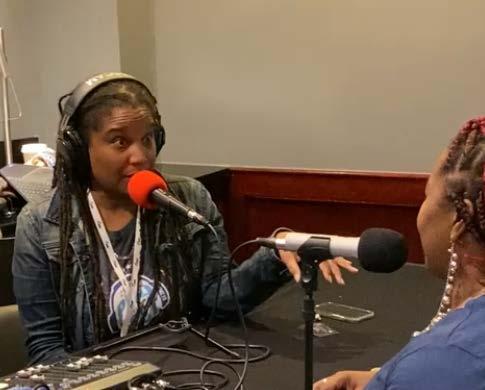
Today, Jaime is the Founder and President of Flint Stone Media. She serves as a producer for about 60 shows and developed the initial podcast curriculum for the Connecticut School of Broadcasting. While her shows have won several awards and she has personally received numerous honors, the most meaningful has been from Podcast Magazine which recently named Jaime to their 40 Over 40 list of top podcasters.
I FELT THAT IF I CREATED MY OWN BUSINESS DOING DIGITAL MARKETING THEN I’D BE DOING WHAT I LOVE FOR A LIVING .”
One of the prominent areas of Jaime’s work is supporting local voices and tourism in Florida. Her passion for amplifying community discourse and works comes from wanting to support the many friends she has in various news and entertainment industries.
“There were a lot of instances when a local newscaster had to read a script—the same script that local news reporters across the country had to read,” Jaime said. “When I started to ask about this, I learned that it was a contractual obligation to read these scripts on air and that made me angry. I feel that people shouldn’t have to say things they aren’t comfortable with, and they also shouldn’t have to risk their livelihoods. As my friends went into the news and wanted to give honest, unbiased reports, they were being asked to be biased. In my efforts to build a podcasting network, I realized that I could create a platform for people leaving the traditional news industry who still wanted to tell local news and stories from the perspectives they wanted without feeling tethered or restrained.”
Jaime says having a platform created an opportunity and the ability for storytellers to do what they love without limitations. “The other driver,” said Jaime, “is the idea of voices being silenced or manipulated—that didn’t sit well with me. In my adult life, working with other people, being in the corporate space, you feel like you have to temper your personality to adjust to company culture or to fit in. That stifles creativity, ideation, innovation and that never sat well with me. I wanted people to be free to express themselves.”
“The extra sweet spot that podcasts hit that TV doesn’t is that podcasts are passive. When I turn on the TV and I’m getting ready, I have to pop my head out to look at the screen; you have to look to fully experience the content,” said Jaime. “Podcasts allow you to listen passively while you do the dishes or go for a jog. Even the podcasts that are filmed and posted to YouTube allow you to listen only while still experiencing that content and filling in all the wonderful spaces with your mind.”
16 | PINE CREST SCHOOL
Reflecting on what differentiates podcasting from radio, Jaime said it hits a few points perfectly.
“It is on-demand,” she began. “You can listen when you want to and choose the type of content you want. You can turn the radio on anytime you want, so that aspect is also on-demand, but what’s not in your control is what song is going to be playing. With podcasts, you select the episodes to explore. In this age of instant gratification, we’re busy, and we want to hear what we want when we want. If you have a show about fishing, your listeners are not scanning and scanning and thinking ‘Oh I guess I’ll listen to this.’ No! They go to their podcast platform, type in ‘fishing’ and are given dozens of options to choose from.”
Jaime’s latest professional project combines her passion for elevating voices and empowering moms.
“A couple of months ago I was in Scottsdale, Arizona for the Mom 2.0 Summit,” Jaime said. “I had never been to the conference before, but I was invited to be on their podcast panel. Typically, the conferences I attend are podcast-centric, so it was interesting to be around moms in other professions and have different conversations. I realized how much of my experience in building my business was shared by other women. Two things came to light; one is that the journey of motherhood has given me all kinds of superpowers that have helped me be successful. For example, the ability to burn the midnight oil and get things done, the patience needed to keep going after facing countless ‘no’s’, and the ability to manage different personalities has helped me as I grow my team.”
“The other realization I had,” Jaime continued, “is how many of us women have received wonderfully sound advice from male mentors who often don’t understand what it is like to build a business as a mother. I would like to have more conversations with other mothers who understand the effort needed and the reality of how challenging it can be to accomplish their goals. It may take the man who recommends an idea three months to see it through, but it may take me five or six. I no longer have to be down on myself about that. Let’s have real conversations where we can support each other. It was an aha moment where I felt I could bring women together and help other moms be successful. That is how I started the Power Moms Network— and that is something I am really excited about.”
Expanding on the Power Moms Network, Jaime shares that there are a myriad of topics to discuss. “You can lose yourself in your motherhood,” Jaime said. “It made me sad that there isn’t enough permission given for mothers to exercise self care. Moms don’t have to lose themselves in motherhood. As I said, there are many superpowers I have developed and that my friends have developed as mothers that are being parlayed into successes. There are so many ways to experience motherhood, and that is what I wanted to do with the Power Moms in general—create a platform where mothers can come together and support each other. They can help each other explore their powers with an emphasis on self-care and support for each other. I wanted this to be a network for more mothers to lock arms and be able to find themselves again in their journey of motherhood.”
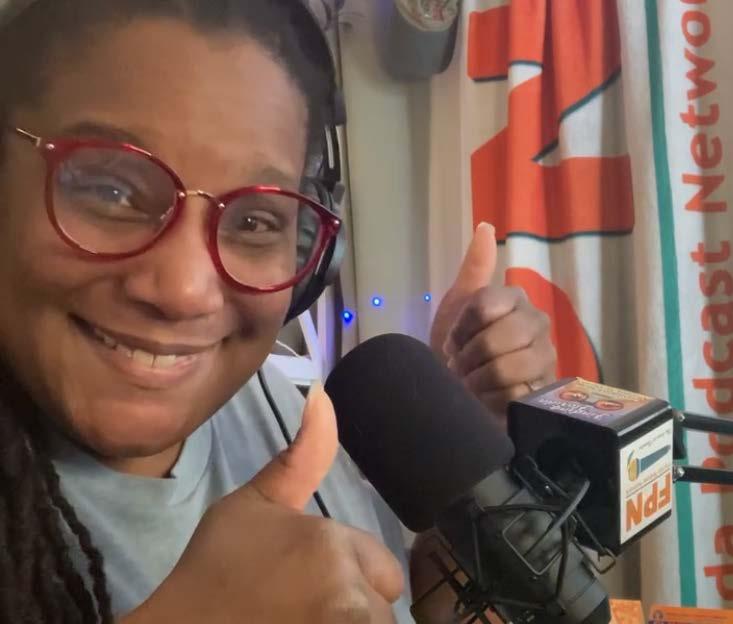
Jaime continues on with her vision for the Power Moms Network as she approaches the groups first advisory meeting.
“I have an entire community kit with all the ways people can get involved, a pre-launch phase of launching the flagship show as a testing ground of what that show is supposed to be and what our content offering will bring. I bridged my other show, Podcasting Your Brand, as a partner show. I want to include shows that inspire and teach you.”
“As I started talking about a vision for the Power Moms, I realized I was striking a nerve; rather than starting by building content, I am building out the community. I have a robust list of powerhouse women who want to be involved. I want us to come together as an advisory board to meet and understand our collective potential. We have two directives: First, I want to know everyone’s skillset and what they want to contribute so they don’t overwhelm themselves. Next will be working with these women to find a network sponsor; someone who supports us in totality. Beyond that, it will come down to moms spreading the word about this network to grow this community.”
Jaime sees the future of the podcasting industry being easier for new voices and storytellers to join.
“I think there will be a shift in listeners’ needs and therefore a change in the services we offer as an agency. Where we will be needed more as a service provider is in helping make podcasts work—form relationships around your podcast so they can grow. And editing! Some people still prefer human editors over artificial intelligence. Because more people are entering the space, we as an industry can help facilitate better community relations, expanding where we can to give our communities greater platforms for reaching their members.”
Stream the Power Moms Network wherever you listen to podcasts or visit PowerMomsNetwork.com for podcast episodes and download the community kit to learn how you can get involved.
PINE CREST SCHOOL | 17
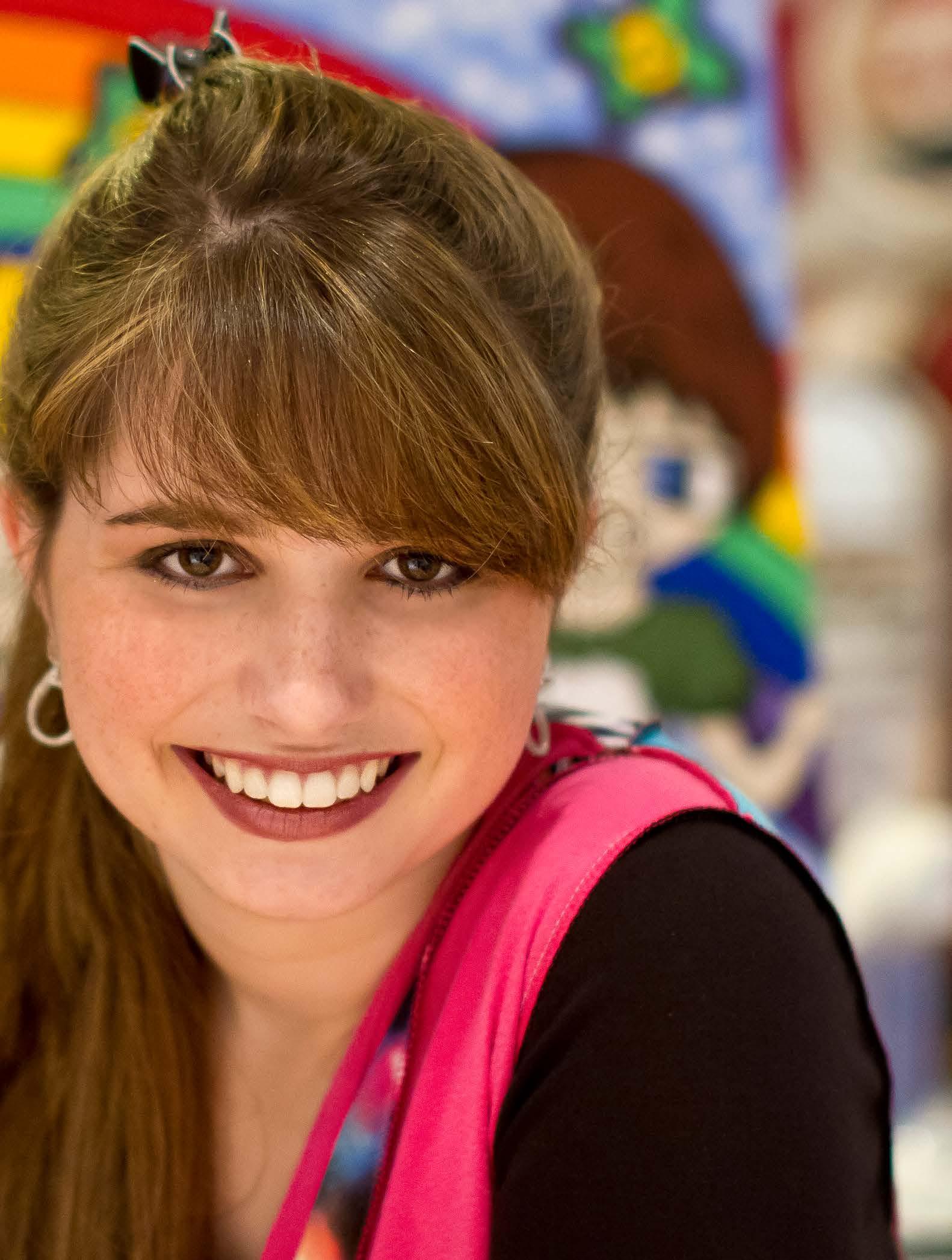
I’VE BEEN ONE OF THOSE FORTUNATE ENOUGH TO HAVE MY VOICE HEARD , SO I WORK EVERYDAY TO ENSURE THAT OTHER PEOPLE WITH ABILITIES LIKE MINE ARE HEARD AS WELL.”
HALEY MOSS ’12
–
CHANGEMAKER
Advocacy in Action
HHALEY MOSS ’12 WAS OFTEN VIEWED BY HER PEERS AS A SHY STUDENT, WITH A TENDENCY TO KEEP TO HERSELF IN SOCIAL SETTINGS. It would take some time to discover that while she may have been timid at times, she would prove herself to be a dynamic voice for change.
Haley was born in Boca Raton, Florida, but shortly thereafter her parents moved a bit further west to the city of Parkland. She was like any other child at that young age, bright-eyed and full of wonder for her growing world, until her parents noticed that there may have been something different about her.
“I was doing things like putting together puzzles with 100 and 200 pieces. But I also hadn’t been very verbal. Instead of talking, I would just scream. By the time I was three years of age, my parents realized that something was off,” she says.
After seeing several specialists, Haley’s parents finally received a formal diagnosis. They were informed that she was autistic, but her mother and father decided not to share that with her right away. In fact, they would not disclose that to Haley until she was nine.
According to the Autistic Self Advocacy Network (ASAN), autism is defined in simple terms as “a developmental disability that affects how people experience the world around them.” Autistic people come from every community, every background and every walk of life. Every individual living with autism has a unique path, but the ASAN highlights that there can also be common markers such as “thinking differently, processing senses differently, communicating
differently, moving differently, and socializing differently.” Some autistic people may need help with daily living, while others may not.
“When my parents finally did tell me about my autism, they compared it to Harry Potter, and told me that I had magical powers. They told me that I was different, but that it wasn’t bad. Rather, it made me extraordinary, and as a family, we chose to focus on my strengths and celebrate those, instead of dwelling on any weaknesses,” Haley says.
“I’m sure you could find plenty of folks who disagree with the tactic my parents used, but I’m grateful they handled things that way,” Haley explains. “It allowed me to focus on just being a kid. Once they shared that information with me, though, it did help me understand some things about myself a bit better. For example, like many autistic people, I have very specific, fixed routines. So I can be fearful of things like trying new foods, or anxious about being in a setting where I’m surrounded by lots of new people. Autism helped explain why I would sometimes be nervous about eating in social situations, or why I found it challenging to make friends.”
By the time Haley entered the eighth grade, she had changed schools three times in three years as a result of some of the challenges she faced.
“I went to a different school each year from sixth to eighth grade,” Haley said. “That’s how I ended up at Pine Crest Fort Lauderdale for eighth grade, even though we lived closer to the Boca campus. My parents figured that going into ninth grade, it would be one less change I’d have to navigate if I was already on that campus.”
PINE CREST SCHOOL | 19
It was during her time at Pine Crest that Haley continued to build her confidence, discover more of her strengths, and find her voice. “Certain things came to me with ease, like studying, because I have a great memory. Art was another major outlet for me, and I found that it sometimes allowed me to express myself better than I could verbally. My art teacher at Pine Crest, Ms. Barbara Smith, was hugely supportive.”
In fact, Haley demonstrated such a unique talent through art that she began showing and selling her pieces in art shows by the age of 14. As she received more recognition for the paintings, her mother, Sherry Moss, encouraged her to donate some of the proceeds back to the community and the organization that initially helped Haley and her family – the University of Miami’s Center for Autism and Related Disabilities.
Haley went to school one morning just days before the art show and handed a flyer for the event to her English teacher, Mr. Patrick. Having never disclosed her diagnosis outside of an Autism-related conference the year before, Haley found herself having to make a split-second decision about what to say when Mr. Patrick asked why she was supporting the Center for Autism and Related Disabilities. Haley announced to the class that it was because she herself is autistic, and, as Haley recalls, the decision changed her life forever. Revealing her truth encouraged Haley to begin speaking openly about her experiences, hoping to be a voice for other children like her who faced similar challenges.
Writing proved to be another gift of Haley’s, as she wrote, illustrated, and published her first book at just 15 years old.
Titled ‘Middle School: The Stuff Nobody Tells You About’, the book is intended to be a guide for neurodiverse, middle school-aged students who are trying their best to navigate the very nuanced environment of middle school.
“I think I was most trying to combat that idea of ‘Be yourself, just not like that,’ which is so prevalent among middle school students,” says Haley. “I just wanted to feel like I belonged, and I knew that other children in my position wanted the same thing.”
Haley would go on to write two more books that represented different stages in young adulthood and would eventually publish a third centered on navigating neurodiversity in the legal profession, which is where Haley began her professional career .
According to authors Nicole Baumer, M.D., M.Ed. and Julia Freuh, M.D. of Harvard Health Publishing, neurodiversity “describes the idea that people experience and interact with the world around them in many different ways; there is no one ‘right’ way of thinking, learning, and behaving, and differences are not viewed as deficits.” This is the ideology Haley began to move forward with as a primary focus
of her work.
After attending the University of Florida for undergraduate studies, Haley received her Juris Doctorate from the University of Miami School of Law. She practiced healthcare litigation from January 2019 to December 2019, and by that time, she had become such a visible advocate for neurodiversity that it was not long before her schedule was filled with appearances and speaking engagements. So many were the commitments, in fact, that Haley pivoted away from practicing law exclusively, and began her own business as a keynote speaker and educator.
Explaining why she is so passionate about advocating for others and their mental health, Haley shared her personal motivation.
“Other people are constantly trying to write the narrative for those who are neurodivergent. We hear about how and
ART WAS A MAJOR OUTLET FOR ME , AND IT SOMETIMES ALLOWED ME TO EXPRESS MYSELF BETTER THAN I COULD VERBALLY. MY ART TEACHER AT PINE CREST, MS. BARBARA SMITH, WAS HUGELY SUPPORTIVE.”
why we are the way we are from ‘experts’ and doctors all the time. But no one can better explain why certain things are challenging for me than I can. I’m the expert on myself. And I’ve been one of those fortunate enough to have my voice heard, so I work everyday to ensure that other people with abilities like mine are heard as well,” Haley says.
“It shouldn’t be a surprise to anyone that someone on the autism spectrum is practicing law or doing something amazing. It shouldn’t be the exception; it should be normal—part of everyday life.”
While Haley is eternally grateful to have had opportunities to advocate for others like her, she is quick to remind us that there is still considerable work to be done.
“People
like to pin the advocate label on me, or say that I’m bringing greater awareness to neurodiversity. But honestly, I don’t even like the term ‘awareness’. Awareness is simply knowledge or perception of something. So technically, we all already have an awareness.” Haley explains that she’s
20 | PINE CREST SCHOOL
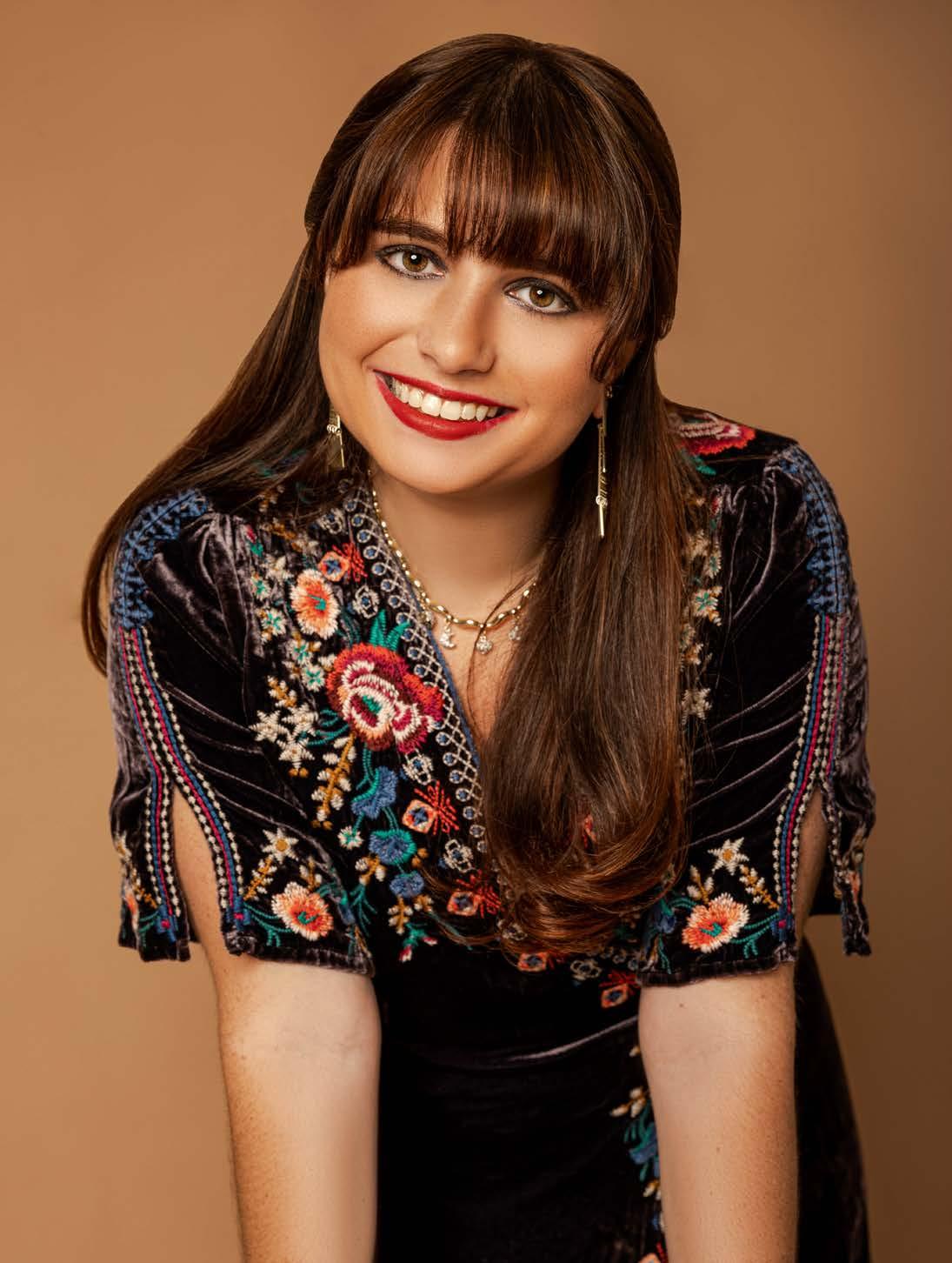
looking to continue moving toward an acceptance framework. “I continue this work because I really believe it’s time that we move past awareness to acceptance and action.”
Haley believes that constructs like the Americans with Disabilities Act (ADA) have been instrumental for advancing our understanding of neurodiverse individuals, but that we’ve reached a point where things should be evolving to another level. “Yes, we still have a long journey ahead, but I think we’re at a place where all bodies and minds should be accepted. When neurodiverse individuals have a seat at the table, we all win; organizations become more equitable, inclusive, productive, and innovative.”
Haley’s dedication is fueled by a desire to be afforded the same independence and ownership of thought that neurotypical people may take for granted. “I don’t want other people setting the limits for what neurodiverse individuals can and cannot do,” she stressed, emphasizing her message that access is for everybody. “We should be setting those limits for ourselves, no differently than those who are neurotypical do. It’s simply about giving equal opportunity and access to people with different abilities. How we get there may look different, feel different, and sound different, but ultimately, we want to achieve the same goals in life.
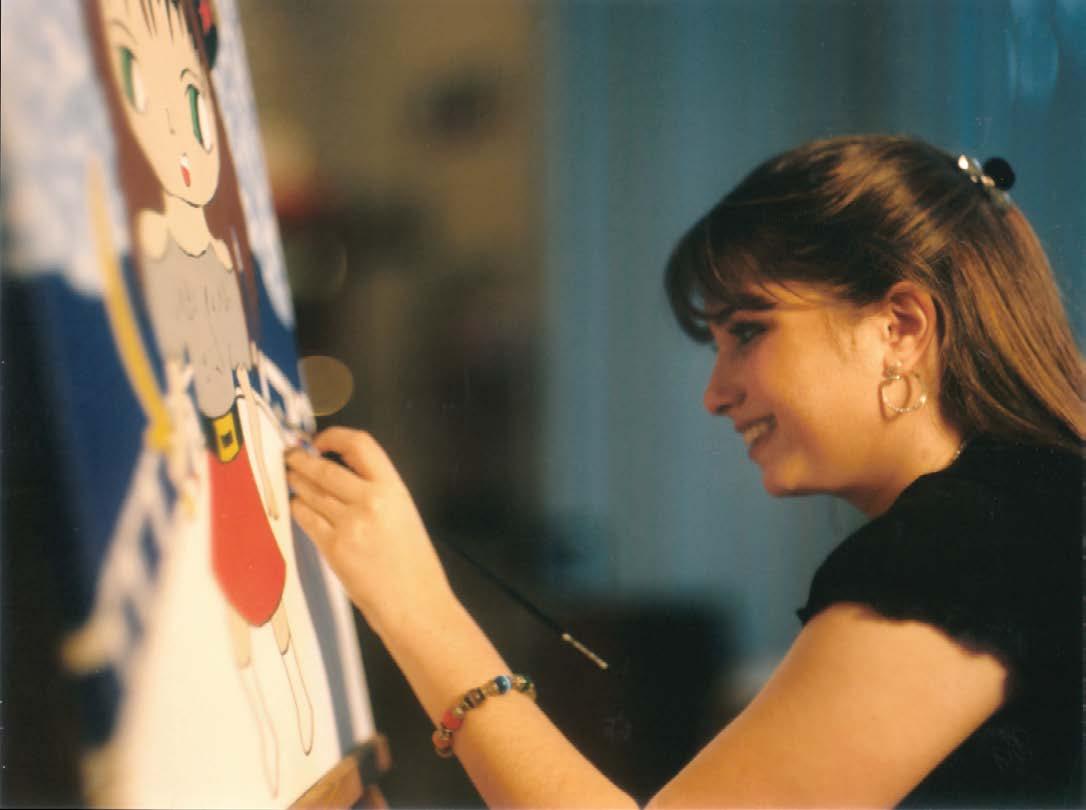
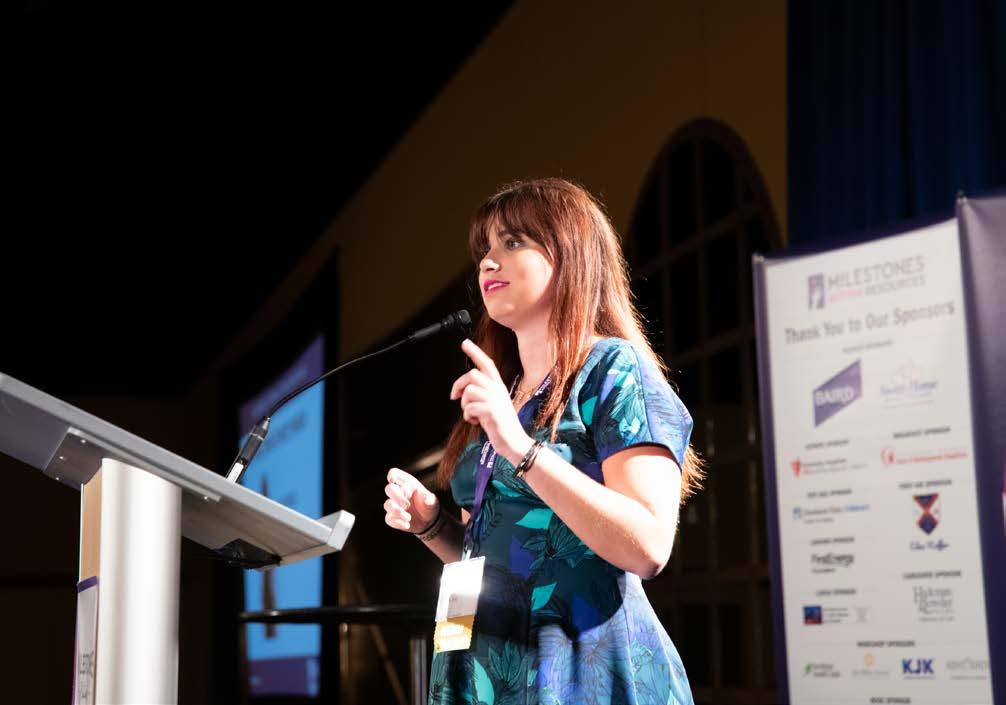
IT SHOULDN’T BE A SURPRISE TO ANYONE THAT SOMEONE ON THE AUTISM SPECTRUM IS PRACTICING LAW OR DOING SOMETHING AMAZING. IT SHOULDN’T BE THE EXCEPTION; IT SHOULD BE A NORMAL PART OF EVERYDAY LIFE .”
PINE CREST SCHOOL | 21
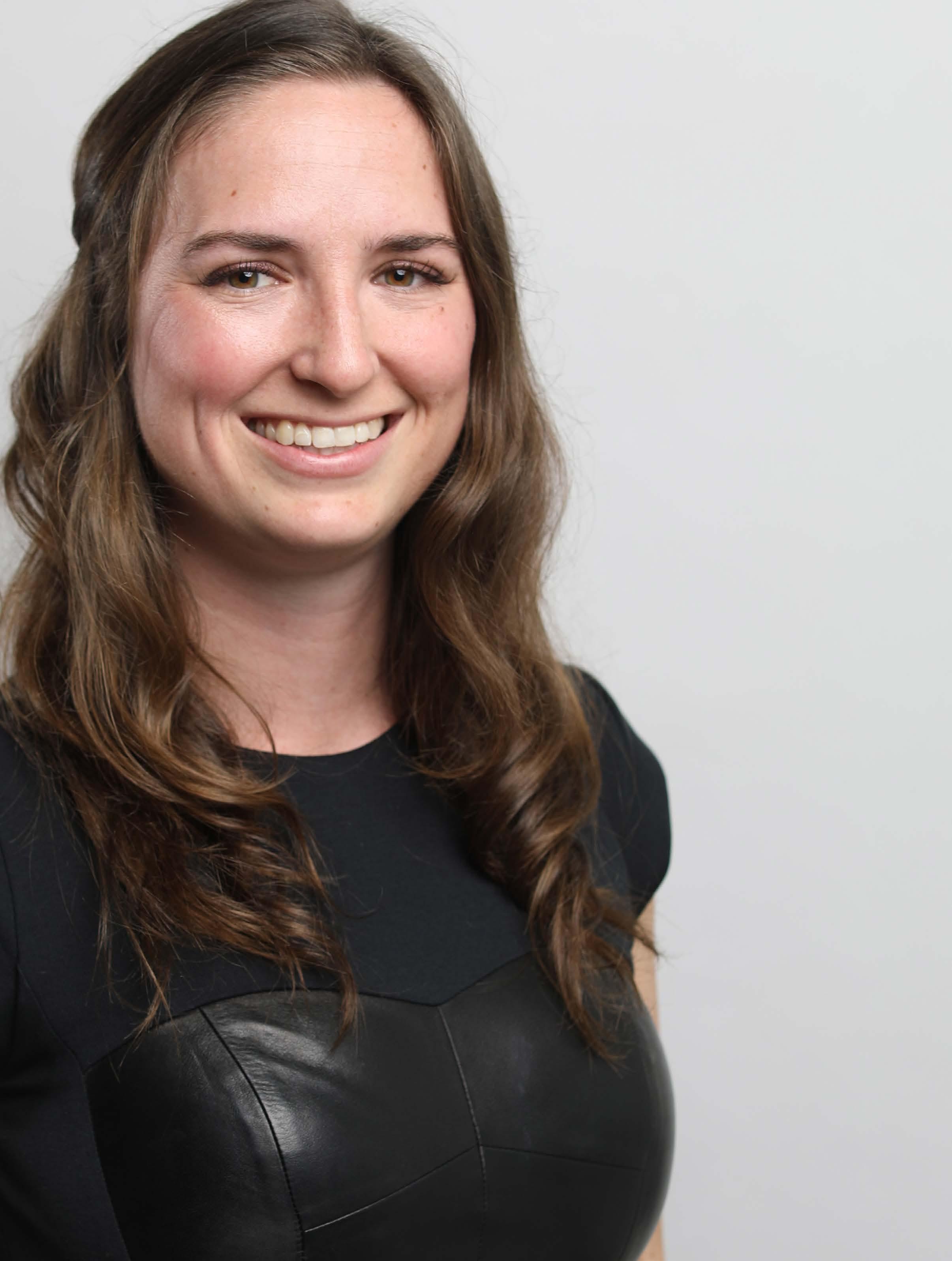
IT’S NO LONGER SIMPLY ABOUT HOW MUCH A COMPANY CAN PROFIT, BUT NOW MORE THAN EVER, PEOPLE ARE ASKING ‘HOW IS THIS IMPACTING PEOPLE AND THE PLANET?’ ”
– STERLING CHAMPION ’08
A Champion for Equality CHANGEMAKER
SSTERLING CHAMPION ’08 CREDITS her time as a Pine Crest student-athlete for much of her professional success. “Pine Crest has honestly played a huge role in my journey thus far,” she said. “Some of the most important doors to open for me came from my connections to Pine Crest.”
As a captain of both the girls’ lacrosse team and the cross country team, and the school’s first two-time All-American women’s lacrosse player, Sterling described the skills she acquired in athletics as an asset that she later realized not all people possess. “I learned so much from playing sports, and it shaped me in so many ways. Teamwork, discipline, time management, resiliency, and not being discouraged by failure are among the most important pieces of that foundation, and they taught me that I can persevere through just about anything.”
Upon graduating from Pine Crest, Sterling went on to play college lacrosse all four years at Tufts University, where she majored in Bio-Psychology. “I initially went in under the pre-med track, but as I began to look down the road at what that path meant over the next several years, I realized that I didn’t really like how rigid and all-consuming that path would’ve been,” she said.
Sterling explained that while she remained classified as a Bio-Psych major because of her interest in the subject, she realized that what she really wanted was to work in music. “It was always a passion of mine, but I didn’t fully understand that you could actually have a career in it. At the time I made that choice, I wasn’t necessarily very happy, so choosing a career in something that made me
and others happy was a big deal for me,” she said.
Sterling began exploring the field, not as a musician, but in the live performance arena working behind the scenes. This included production, concerts, events, festivals, and conferences, and eventually, she parlayed that into managing artists.
“Throughout this time,” said Sterling, “I typically held multiple jobs, supplementing the music work with other things here and there. So I’ve actually been working outside of the scope of what would be considered a ‘normal’ job for a long time now. I’ve really tried to maintain as much independence in my work life as possible, because that’s always been really important to me.”
Sterling further detailed the varied professional experience she has had. “I’ve worked in a corporate environment, management, and hourly jobs. It’s allowed me to accrue a perspective of what it’s like to work for all types of people and all types of companies. In that sense, I’m very well-rounded and I have a pretty good understanding of many different people and therefore an ability to empathize with their different situations. I do think that’s a big part of why I have success doing what I do now.”
Before describing her current work, Sterling dove deeper into the journey that led her there, highlighting some of the challenges she faced that truly began to shape her path.
“One thing that stood out to me, and was pretty unexpected if I’m being honest, was finding that the corporate environment I was a part of was a difficult environment for a woman; I was always working under men in charge. What I found was
PINE CREST SCHOOL | 23
that being a woman really impacted how people treated me and what they thought I was capable of. Coming out of college, I wasn’t really anticipating that. It actually held me back in my career for some time, because I found myself frustrated and confused as to why that was the case. I wasn’t raised to believe that as a woman, I could do any less. I wasn’t treated that way in school either, so it was a bit troublesome and eye opening.”
Seeking a bit more stability, Sterling took her first full-time job outside of music in 2016 at an ad agency. “I was hired as the Office and Culture Coordinator. I feel like it must have been the universe calling me to it because the position seemingly came out of nowhere. I was tasked with running the office, creating programming and steering the culture within the company,” Sterling said. She explained why it was such a pivotal time for her. “This became a significant position for me because it was the first time I worked under female leadership; our Chief People Officer, the head of Human Resources (HR), was a woman. It changed my entire perspective on what going to work could be. She treated everyone fairly and was intentionally respectful of our time. She showed gratitude, was honest, and transparent. It was what I needed the whole time but didn’t know was possible.”
There was another dynamic that Sterling explained as key at the time. “My boss was also pregnant when I worked for her, so as a byproduct, I began learning about parental leave and state laws and policies for it. I began diving deeper into structural workplace inequalities as they pertained specifically to women, and while it was interesting to learn about, the lack of consideration and protection for women was disheartening as well.”
One day in 2017, Sterling began preparing for one of the weekly themed happy hours she hosted at work, with the theme of this particu -
lar event set as International Women’s Day. “In an effort to honor that,” she said, “I decided that I was only going to purchase food and beverages from women-owned brands. I went online thinking there would be some sort of centralized database holding that information, but I found nothing that was helpful. I ended up just walking up and down grocery aisles and flipping over packages, looking up LinkedIn pages, combing through articles and having to do a lot of my own research. It turned into a very intensive research project and I just thought to myself, ‘It shouldn’t be this hard.’”
I COULD FIND PLENTY OF PRODUCTS THAT WERE LABELED CERTIFIED ORGANIC, OR FAIR TRADE... AND ASKED MYSELF, ‘WHY WASN’T THERE A CERTIFICATION REPRESENTING WOMEN IN THE WORKPLACE?’ ”
“I couldn’t find items with a women-owned label, but I could find plenty of products that were labeled certified organic, or fair trade,” Sterling said. “I applied that same concept to gender-based ownership, and asked myself, ‘Why wasn’t there a certification that represented women in the workplace?’”
This was the pivotal moment when the entire idea, the basis for Sterling’s
company, hit her at once. “As I mentioned before, I’ve always had a fairly entrepreneurial spirit. I just hadn’t felt like any of my ideas were worth pouring time and effort into. This, however, was something that I really believed was important and could have a huge impact. It seemed simple, but even early on I understood that it had the potential to affect how we spend, what companies we patronize, and even how we prioritize who we support as consumers.”
Sterling ventured to a public library in New York City (NYC), where she was living at the time, to comb through their databases and find out how many women-owned companies existed, what percentage of employees were hired, etc.
She found that, as of 2017, roughly 40-42% of companies in the US are 51% owned by a woman or women, with an additional 10% of companies having gender-equal co-ownership. That meant that over half the companies in this country are owned by women. What was more shocking to Sterling, however, was learning that in general, those companies only see 4% of all revenue, and they only hire approximately 8% of all eligible employees.
“I saw this as a major problem,” she said, “and I became even more invested in and passionate about using my idea to contribute to some sort of solution. I really wanted to help bring awareness to these companies and give them more capital to scale, grow or hire people. Whether it stems from a lack of funding, resources, or inequitable levels of education, there are several reasons why historically, women are not set up to succeed in this world of business we have.”
Thus, the Syndicate for Human Equity, Incorporated, or The SHE Mark, was born.
As listed on the company website, “The SHE Mark is a benefit corporation that verifies the work being done across industries to prioritize equal inclusion of all women in the course of business and makes it easier to communicate
24 | PINE CREST SCHOOL
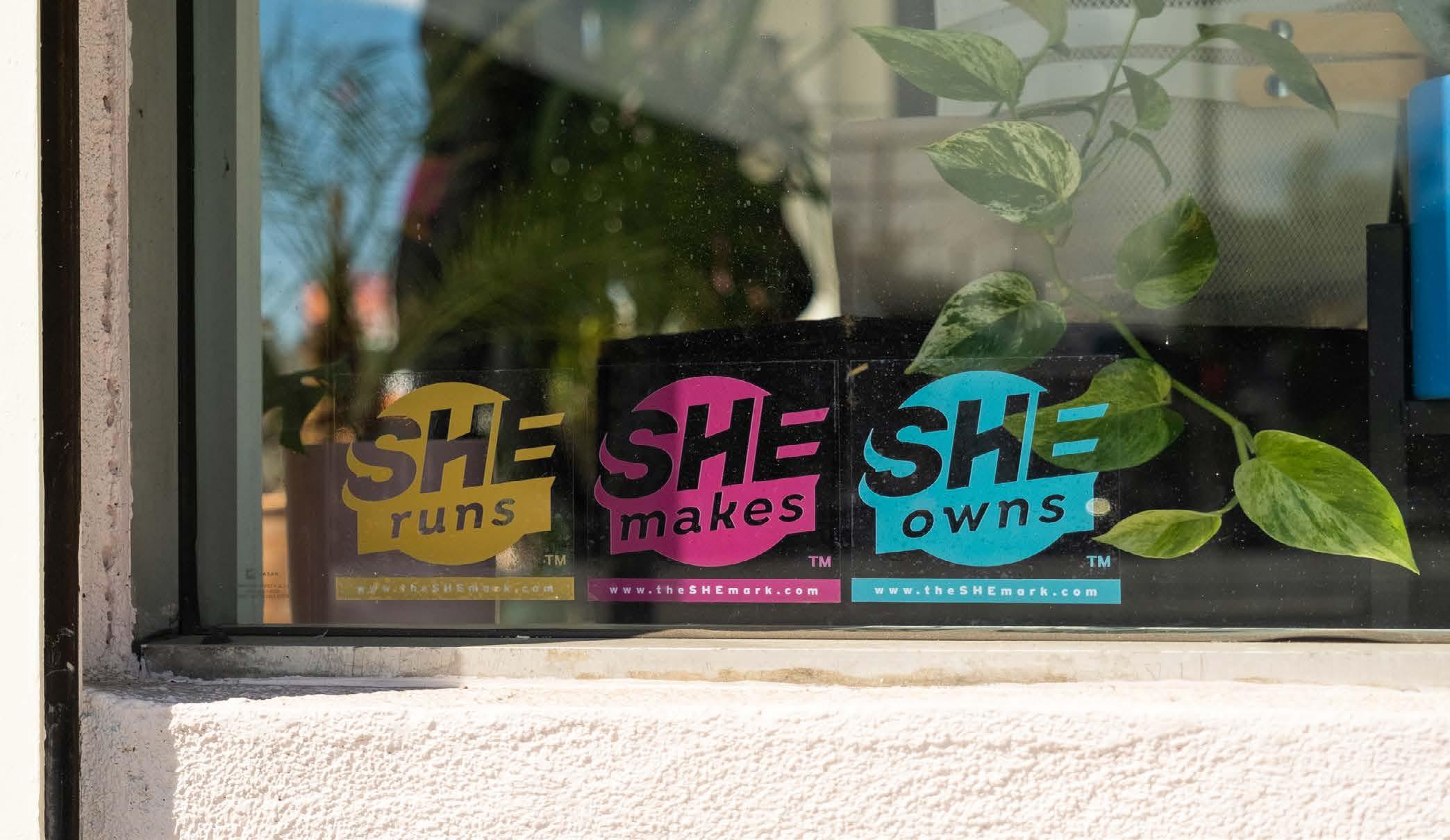
those efforts using three business certification marks.”
“So how did we proceed, or how do certifications work?” said Sterling. “In general, you can certify anything as long as you have an objective set of standards. Our current suite of certifications has four marks right now. Our array of marks recognizes the many ways in which women and gender-diverse individuals can impact a company.”
(see below)
“I came up with the names and criteria and started telling select people about them,” Sterling said. “I also signed up for a free entrepreneur class offered in NYC. It was a 12-week course, particularly for female founders, where they covered every aspect of what was needed to start a company, which I found extremely helpful.”
Over the course of that process, Sterling started discussing the project with her now co-founder, Ilana Broad, who she actually met through a Pine Crest classmate, Molly Baltimore ‘08. Ilana studied and worked in lobbying, digital organizing, and law, specifically intellectual property law, which lies at the core of their business.
In April 2019, Sterling and Ilana registered the entity. Set to launch in April 2020, the COVID pandemic delayed their process, but the company did finally end up launching a few months later in July of 2020. “You’re talking three years from original idea to official product,” Sterling confirmed.
A great deal of thought and intention was poured into all aspects of the company, from language used to standards identified, to the company logo
and even packaging. Sterling went into greater detail about branding on the company website, theSHEmark.com.
Sterling reflected on the difficulty the company faced in its infancy. “It was very challenging in the beginning because we were simply cold-emailing businesses, and many of the responses we received were super strained. At the time, in 2020, everyone was simply trying to survive. The abstract silver lining of the pandemic for us was that it put a giant spotlight on women in the workplace, and not in a manner that, for example, the MeToo movement did. It highlighted the countless issues working women face beyond harassment.”
Working tirelessly to get things off the ground, Sterling confirmed that “our first certifications just after the launch ended up going to companies owned by
SHE Marks recognizes the many ways in which women and gender-diverse individuals can impact a company.” Those marks have the following requirements:
Does a company have 50+% women and/or gender-diverse people with equity in the company?
You qualify for SHEowns
Does a company have 50+% women and/or gender-diverse people in leadership roles or positions of power?
You qualify for SHEruns
Does a company have 50+% women and/or gender-diverse people in creative and/or innovator roles across all employees?
You qualify for SHEmakes
Does a company have 50+% women and/or gender-diverse people on the board of directors?
You qualify for SHEgoverns
PINE CREST SCHOOL | 25
people that we knew personally.”
One of those individuals was Brooke Bal ’10, a fellow Pine Crest alumna and lacrosse teammate. After founding her company in 2017 called bakebars, DIY protein bar kits, Brooke’s would actually go on to become the very first business to receive a SHEowns certification.
Sterling went on to discuss the big-picture goals of the company. “I do believe that doing business for good is becoming more important and relevant. It’s no longer simply about how much a company can profit, but now more than ever, people are asking ‘How is this impacting people and the planet?’”
“Traditionally,” Sterling continued, “all businesses, companies or corporations in the US have a fiduciary obligation to prioritize profit over everything else. But this certification is
that we provide a database housing the women-owned companies that they seek to patronize. Initially, I too envisioned us working from that premise. But as we continue to work with our brands directly in our community, we are figuring out how they want to use the mark.”
As Sterling explained, this could include anything from a plaque sitting next to the register of a business, to window decals placed in storefronts, to metal signage that gets mounted next to a company’s entrance signs. “For us, running this company well means that we are always thinking about getting this information in front of consumers in a manner that is useful to them. More so than an online database, we find that people want to go into a store, have our logo jump out at them, and help them
more personal level? Eventually, when we’ve collected enough of this detailed information, we want to be able to start issuing comprehensive reports that have an impact on consumerism around the world,” Sterling said passionately.
When asked to reflect on her time at Pine Crest, Sterling fondly recalls the impact that lacrosse head coach Eileen Pliske had on her. “Coach Pliske recognized my unrealized talents, and she pushed me to be greater. She taught me how to use my potential to be a good team leader. I’m grateful for her because she was a phenomenal female role model that gave me the opportunity to step into my power which, as I learned post-college, is not always easy for women to do.”
Sharing some final, parting words with this year’s seniors, Sterling said,
DON’T BE AFRAID TO FOLLOW A PATH THAT IS LESS CONVENTIONAL... HAVE FAITH THAT WHILE IT MAY NOT WORK OUT THE WAY YOU WANT IT TO, IT WILL WORK OUT THE WAY IT’S SUPPOSED TO .”
essentially a proclamation of duty, that those individuals commit to running a company for good. They must work toward accessibility, public benefit, diversity, equity and inclusion (DEI), and sustainability.”
Sterling emphasized again that integrity and humanity are what drives The SHE Mark. “We subscribe to the Triple Bottom Line – profit, people, AND planet,” she said. As stated in the company mission statement, The SHE Mark seeks to “make gender equality an everyone issue, one SHE-certified company at a time.”
The utility of the company is something that, as Sterling advised, is evolving. “I think that when people hear about the company, the assumption is
make their decision instantly. I want people to walk into a Whole Foods and see our logo up and down the aisles. It has been a fun way to continue growing our consumer awareness,” said Sterling.
“One of the things that I look forward to in reference to growing our database is that we are collecting information about ownership, demographics, a company’s values, other certifications they hold, what percentage of people own which parts of the company, etc. People are interested in more than just gender equality, and we are excited about being able to create an ecosystem where you start with us, because we’ve helped you identify that women are involved, but what else do you care about? What is going to help you be able to shop on a
“Don’t be afraid to follow a path that is less conventional. Make the most of every opportunity or situation you’re in when it comes to work, because you may not know how that will serve you in the future. Things may not always make sense or feel like they are working for you, but hold steady and trust that those experiences are preparing you. Have faith that while it may not work out the way you want it to, it will work out the way it’s supposed to. Embrace the boring and the mundane, because it is fleeting, and one day you will be too busy to enjoy those moments. Your journey is for you, and everything will be ok!”
26 | PINE CREST SCHOOL
Our culture of philanthropy is instrumental in advancing Pine Crest’s mission of educating a generation of students who are emotionally intelligent, intellectually inspired, and prepared to change the world. Giving provides flexible dollars for Pine Crest to offer every opportunity for our students.
PINE CREST SCHOOL | 27
SCAN HERE TO MAKE A GIFT www.pinecrest.edu/giveonline

I THOUGHT, ‘I HAVE THE RIGHT SKILLSET TO ADDRESS THIS PROBLEM. ’”
– JENNIFER SILBERT ’94
CHANGEMAKER
Finding Wealth in Waste
AAN ARCHITECT BY TRADE, Jennifer Silbert
’94 became an entrepreneur in 2014 when she co-founded Rewilder. Deeply passionate about upcycling and sustainability, Rewilder was born as a way to address the amount of non-recyclable, industrial waste piling up in landfills.
After graduating from Pine Crest, Jennifer attended the University of Pennsylvania where she studied Design of the Environment—a hybrid of art history, art, and architecture. After graduation, she spent a couple of years traveling and working as a photographer and graphic designer before deciding to return to school to earn her masters of architecture degree at Yale University. She began her professional career driven by her personal interests, working with materials and technology.
“As a materials architect, I was problem solving, figuring out how to bring complex designs to life,” Jennifer said. “I translated design created on a computer into the real physical world (my kids would say ‘in real life’)—considering gravity, acoustics, connections, intent. It was my job to answer ‘How do we actually build this crazy thing?’ It was exciting and innovative work for 15 years.”
In addition to her full time job, Jennifer began teaching Materials Innovation courses at Art Center College of Design in Pasadena, California. “I knew very quickly that the class would become about upcycling and creative reuse, changing the way that students looked at trash,” she said. “At the beginning, students would inevitably want to use fancy materials like carbon fiber. I’d ask them: do you have the money or tools to work with this material? Why don’t you use the pile of old magazines in the corner, or collect aluminum? All of that valuable and plentiful material makes for great experimentation. It became obvious to me
that upcycling was the answer. At the same time, I was researching post industrial materials, seeing what was out there. It was detective work, and I quickly realized that the scale of the problem was way bigger than I even knew. I ended up finding a beer filter cloth from a large American brewery, used to filter hops and barley during production. It’s a beautiful and strong material, designed for high performance. This single brewery throws away two tons of filter cloth every three days; it’s a massive amount of waste.”
I thought, ‘I have the right skillset to address this problem.’ In architecture, design always came first, and then material second. Now, I had a material first and I had to decide what to design with it. I flipped the whole process on its head. That was the beginning of the Rewilder journey.”
In 2014, Jennifer and her business partner, Lisa Siedlecki, launched Rewilder, “a sustainable design company on a mission to find wealth in waste. We partner with companies to identify, divert, and upcycle waste materials in their supply chain that are worthy of a second life.” The company got their start with beer filters, discarded airbags and seatbelts, transforming those materials into chic and durable handbags and backpacks.
“Given my background with materials and architecture,” she continued, “and Lisa’s experience as a handbag designer in high fashion, we know that design and sustainability go hand in hand. You can’t have one without the other. We make too much trash, and we can use fashion as a tool to tell this transformative story, to think differently about these discarded materials. Fashion drives culture.”
Another important part of Rewilder is being able to show the environmental impact of the
PINE CREST SCHOOL | 29
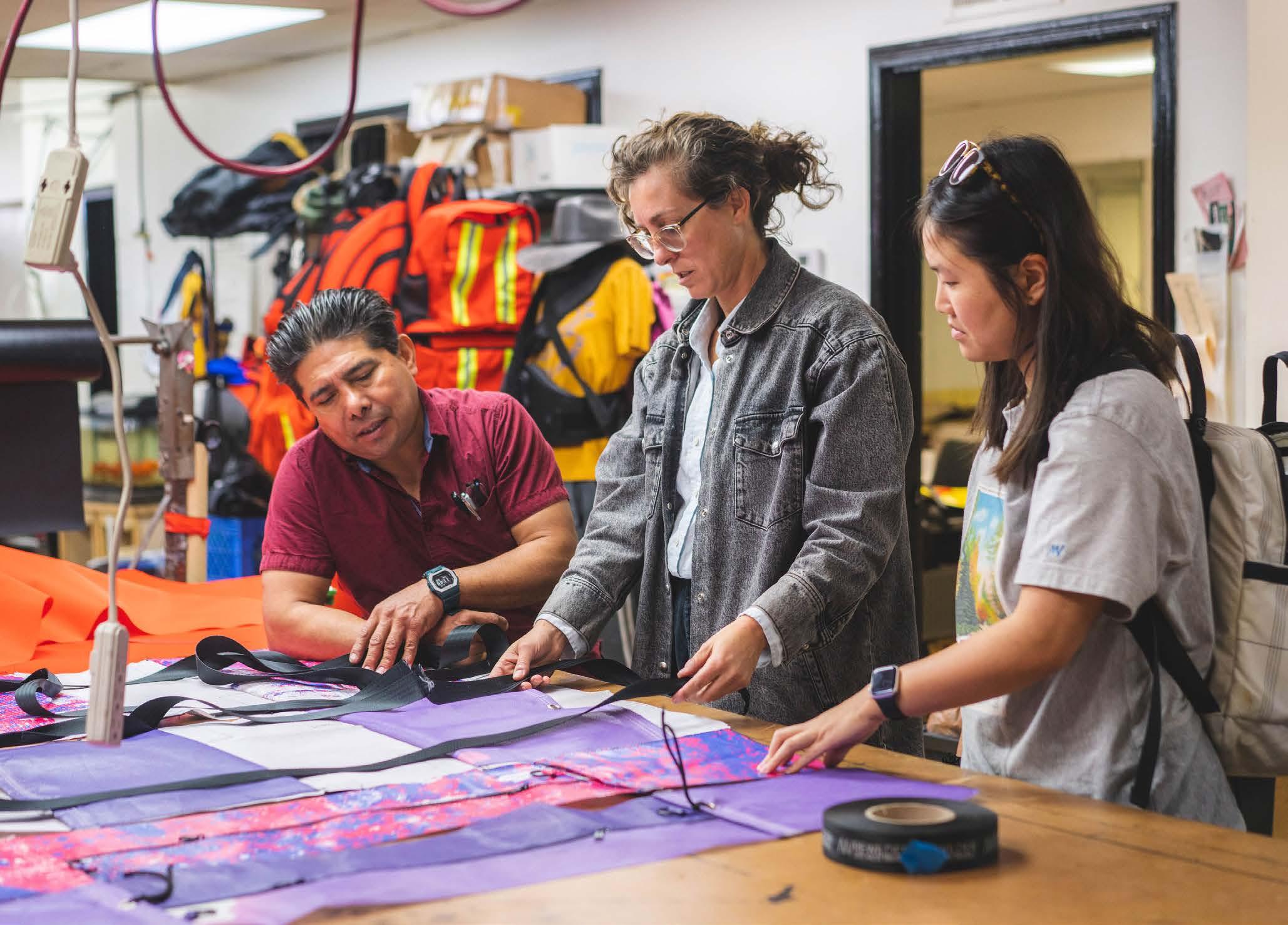
company’s efforts. “Our third partner, Stephanie Choi, joined Rewilder in 2019 to focus on marketing and storytelling,” said Jennifer. “Science and data are now a big part of what we do. Recently, we developed The Comeback Tee, in part through a grant from the Los Angeles Cleantech Incubator (LACI). We have been part of their incubation program for the last year, which is helping us scale our upcycling work. It is an incredible community of people saving the planet in various ways. The grant funded research and development for The Comeback Tee—the most sustainable t-shirt ever made.”
WE MAKE TOO MUCH TRASH, AND WE CAN USE FASHION AS A TOOL TO TELL THIS TRANSFORMATIVE STORY, TO THINK DIFFERENTLY ABOUT THESE DISCARDED MATERIALS. FASHION DRIVES CULTURE. ”
“The journey your typical t-shirt goes through is epic. We all drop our clothes at Goodwill, and think that’s a good solution. It’s really our only solution for trash textiles. But the truth is only 10% of donated clothes get resold. The rest get shipped overseas, to places like Ghana or Indonesia, where our waste is flooding the market, and often ends up in a landfill. Some of it gets sorted into bales (denim, t-shirts), which is re-bought by American rag shops looking for vintage pieces. One or two pieces may get sold to vintage shops, and the rest becomes trash again, after literally traveling around the world. It’s an unfortunate story: good material, bad design.”
Rewilder began as a direct to consumer e-commerce business, however, the company has shifted toward a business to business model as companies are caring more about taking responsibility for their materials. “The majority of our work now is with large companies like Disney, the Hollywood Bowl, and Subaru to upcycle their waste streams,” Jennifer said. “We are also consciously moving away from traditional sales models, toward more thoughtful and patient buying. We are going to do really thoughtful design drops, on pre-order only, and then make exactly what is ordered, without any waste or overstock. This is another way that we can challenge the fast fashion standard.”
Reflecting on her career path to Rewilder, Jennifer says she started with very limited knowledge of business. “I have an art brain, so I had to learn business as best I could,” she said.
30 | PINE CREST SCHOOL
“We did everything ourselves—website design, cost analysis, accounting, design and all the other thousand pieces that birth something. We had a massive list on the wall. And we pivoted A LOT over the years, testing and experimenting to learn what people are ready for. I’m proud to say that many of those original designs are still part of our core line—proving that good design lasts.”
Upcycling and creative reuse was always natural for Jennifer. “I have always been an avid dumpster diver,” she said. “In high school, as soon as I could drive, I was knocking on doors at tile shops and asking to look through their trash for scraps to make art. It’s the same thing I do today, only on a much larger scale.”
Jennifer shares the longer term goal and philosophy of Rewilder, and where the company is headed in the near future.
“Very often and very quickly people say we have to move production overseas to bring costs down,” said Jennifer. “But our ethos is about community, valuing the people that make our things, and we are rooted in Los Angeles. We have a vision for social and environmental change, and it starts simply by using the things we have in front of us. The baseline is that upcycling is the best, most healing solution for our planet.”
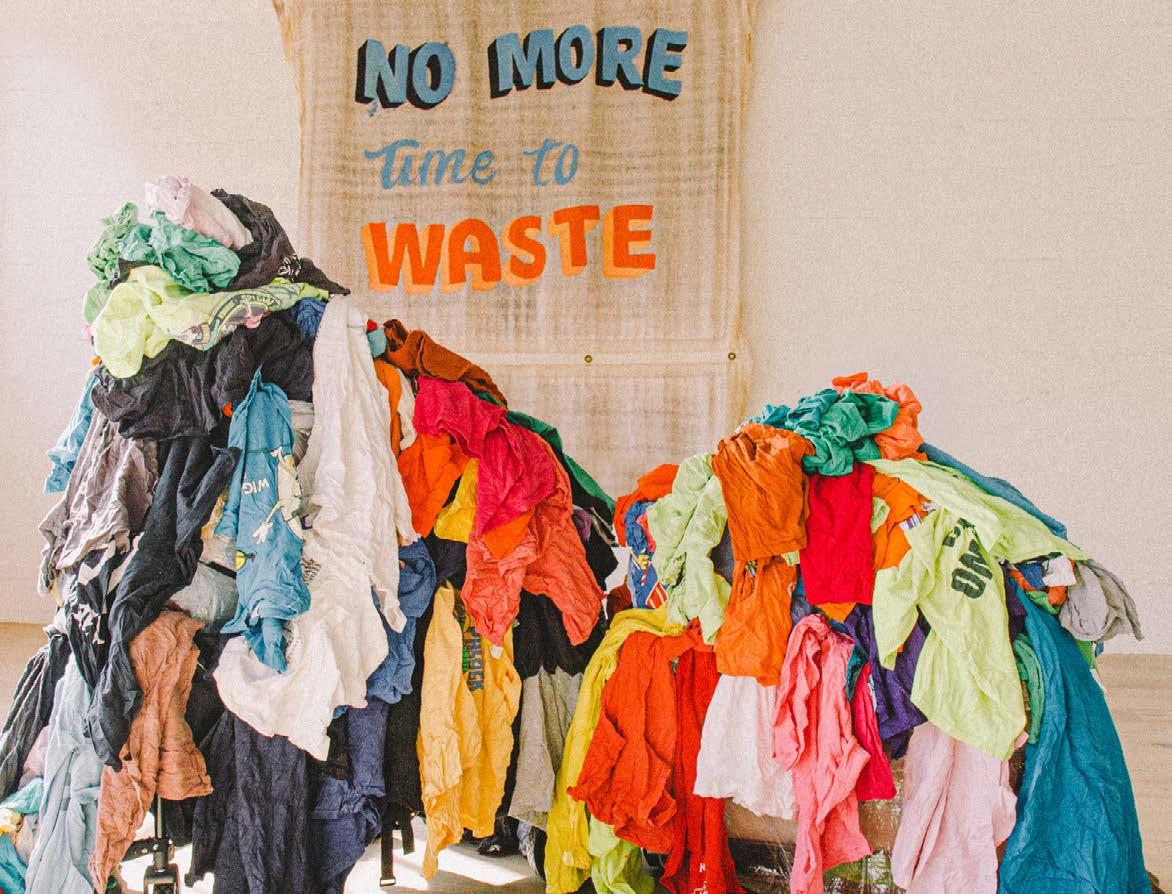
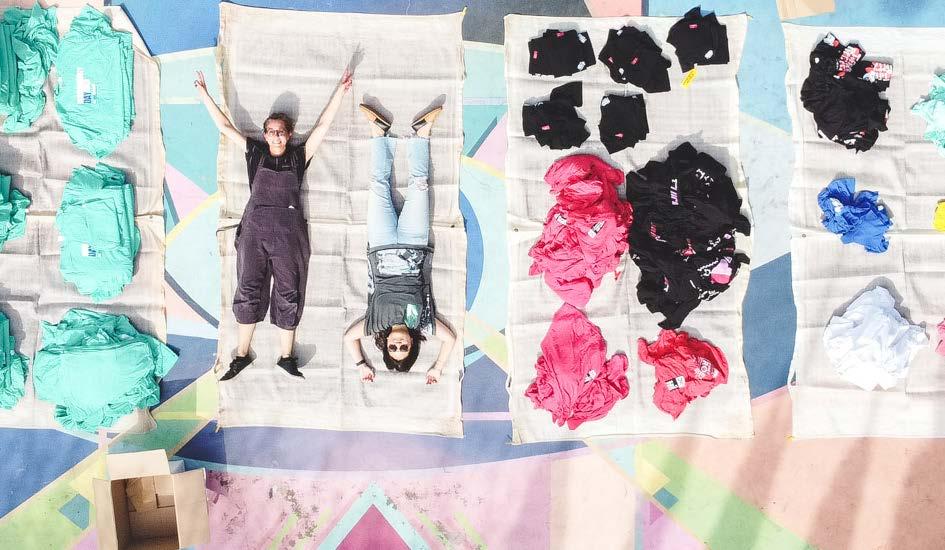
OUR ETHOS IS ABOUT COMMUNITY, VALUING THE PEOPLE THAT MAKE OUR THINGS, AND WE ARE ROOTED IN LOS ANGELES. WE HAVE A VISION FOR SOCIAL AND ENVIRONMENTAL CHANGE, AND IT STARTS SIMPLY BY USING THE THINGS WE HAVE IN FRONT OF US. ”

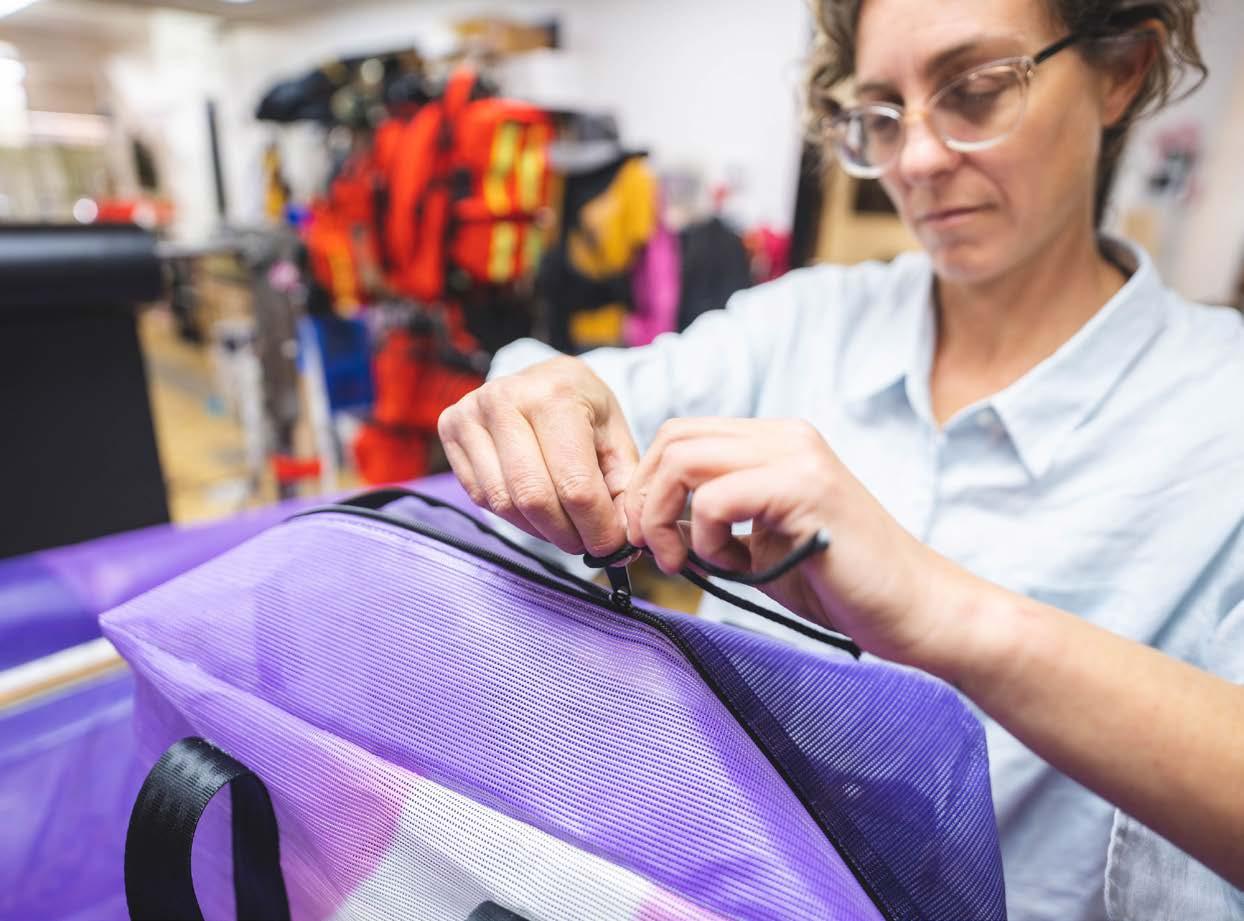
PINE CREST SCHOOL | 31
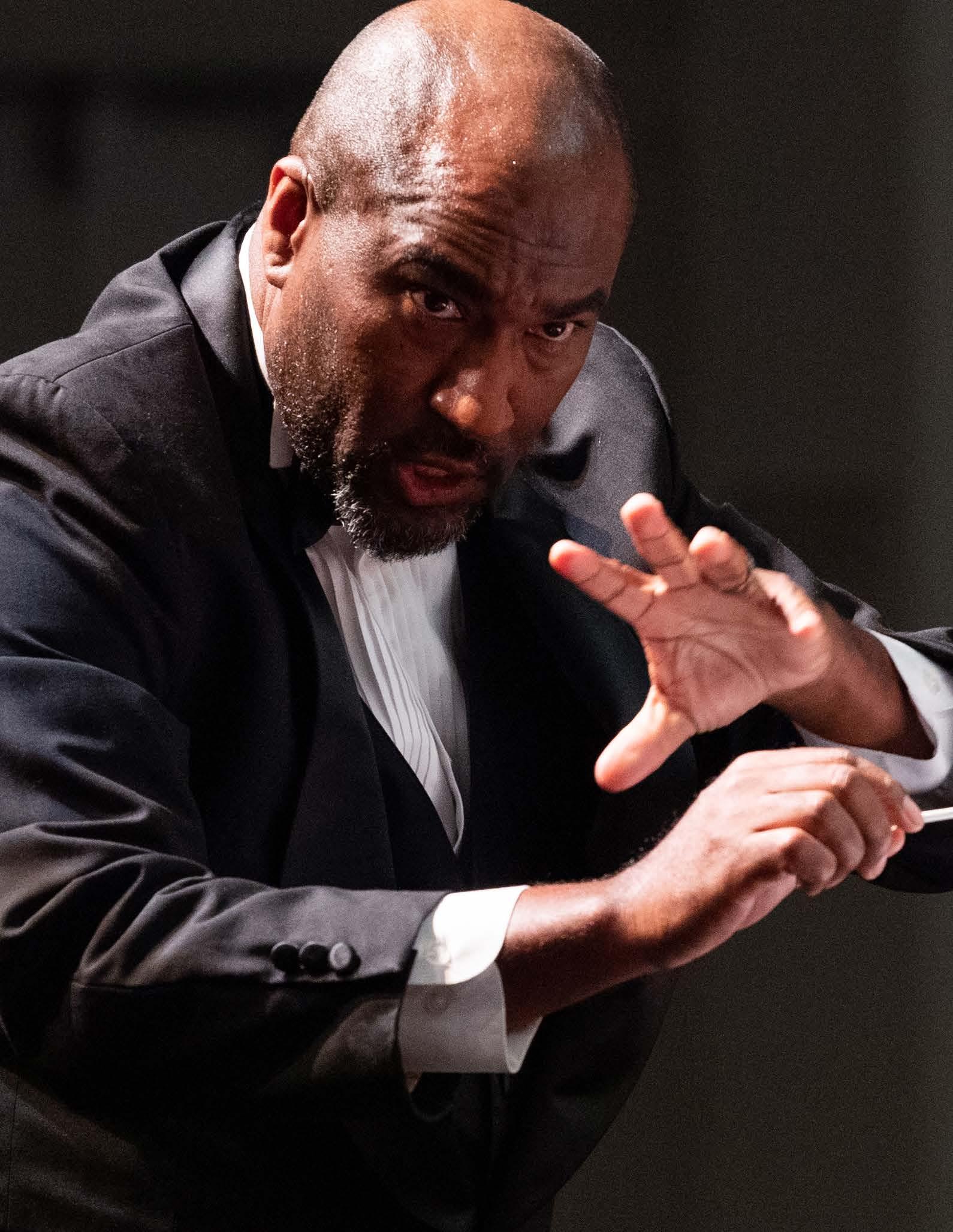
A LIFE IN MUSIC AND EDUCATION MR. ANTOINE KHOURI
MR. ANTOINE KHOURI, ORCHESTRA DIRECTOR ON THE FORT LAUDERDALE
CAMPUS, has loved music since he was a child. His parents and grandparents encouraged him to sing in his church’s choir and begin learning the piano at five years old, with his mother as his teacher.
Picking up a violin for the first time in third grade, he knew immediately it was not for him! “My grandmother bought me a violin and that’s how I was introduced to the strings,” Mr. Khouri said.
“I didn’t like the violin or viola, but I did like the cello and ultimately went for the double bass. That is how orchestra became a part of my life.”
Mr. Khouri didn’t always know that he would be an educator, but he always knew that music was going to be an important part of life.
“When I went to college, I knew I was going to major in music,” he said.
“I wasn’t sure what avenue of music I would follow, but I wanted to produce music—I wanted to be like Quincy Jones! In some aspects, I am a producer of many things. Not just writing music or composing tracks, but a producer of
art—a concert, a record, a music video, a musical, or movie. Education started to resonate with me as an undergrad student when I started to teach summer camps at Florida State University. I realized that it was really fun and that I was touching lives.”
Recognizing how difficult it is to break into the music business, Mr. Khouri shared that while he pursued his passion, the desire for a more steady life began to call to him. “It’s hard to break into the music business. You have to sacrifice your whole life until you get a hit record. So, while I was pursuing that, I started a family and decided to find something more stable and consistent. I loved teaching so that is what I did.”
Having spent time teaching at the university level, he found that teaching middle and high school-aged students ignited something in him. “I had finished an internship and was applying for graduate school when I got a call from a school in need of an orchestra director. I got thrown in and loved it, but I knew that I still wanted to attend graduate school.”
Mr. Khouri did attend graduate
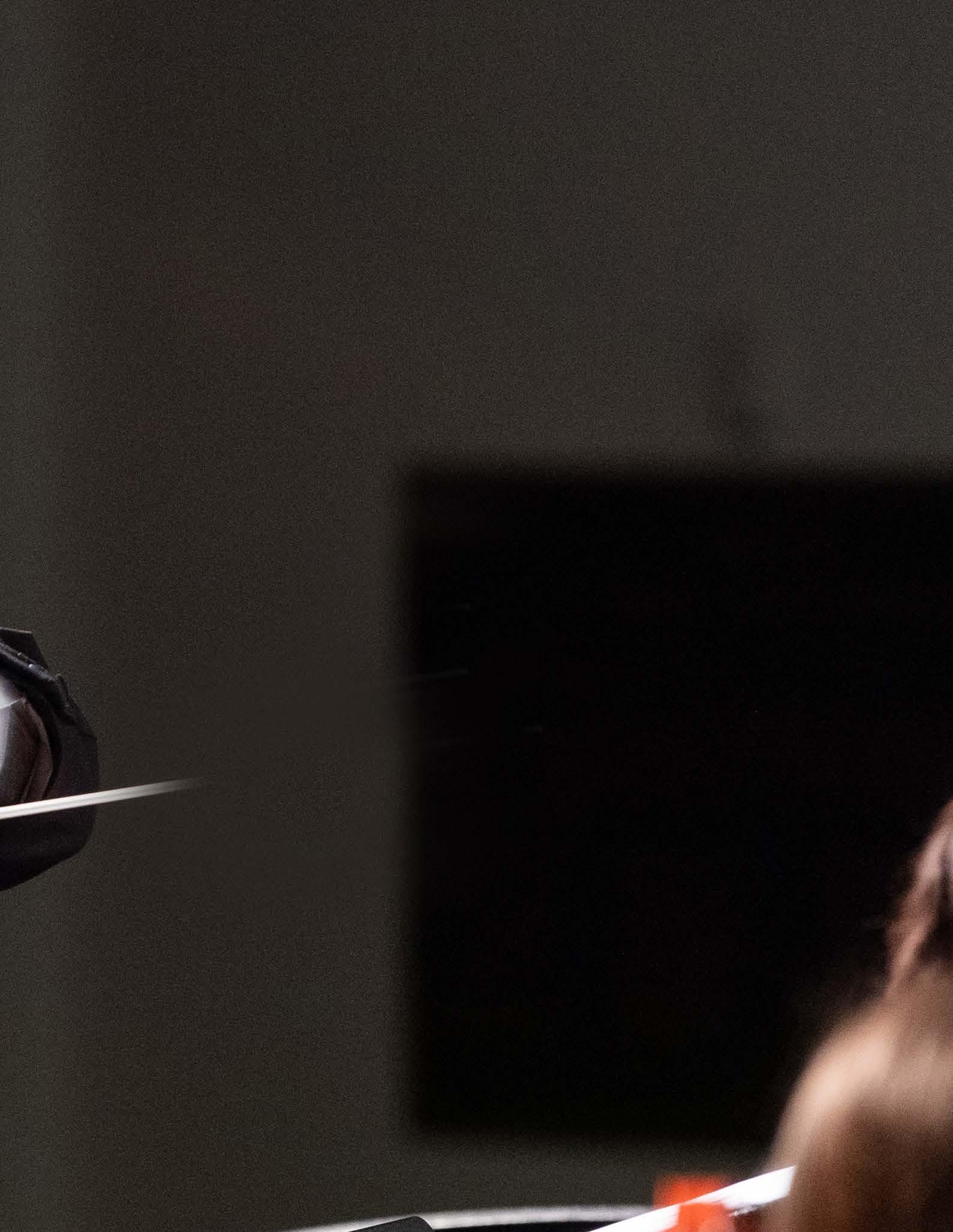
school and enrolled in a joint program with Disney Studios. “I enrolled in a music production degree, but it wasn’t just producing music; it was performing arts production. I learned how to produce everything—live shows, television—anything you can think of to produce in the arts. I got all of that experience with Disney and then started working full time for three years until I decided to go back to school for my doctoral degree in music composition.”
“When I applied, the advisor I met with recommended another master’s degree in music, one that happened to be more aligned with my interests,” said Mr. Khouri. “It was a media writing production degree. It involved some composition, but media writing production meant learning to compose music for film, television, and radio. Because I was chasing a dream, I was trying to find ways to bring skills back into the classroom, in case the dream didn’t work out. I always thought, ‘if it doesn’t happen for me, I can teach the next generation music technology and maybe one of them will be the next Quincy Jones.’”
I AM A PRODUCER OF MANY THINGS. NOT JUST WRITING MUSIC OR COMPOSING TRACKS, BUT A PRODUCER OF ART—A CONCERT, A RECORD, A MUSIC VIDEO, A MUSICAL, OR MOVIE. EDUCATION STARTED TO RESONATE WITH ME AS AN UNDERGRAD STUDENT WHEN I STARTED TO TEACH SUMMER CAMPS AT FLORIDA STATE UNIVERSITY. I REALIZED THAT IT WAS REALLY FUN AND THAT I WAS TOUCHING LIVES.”
One day in 2017, Mr. Khouri received a call from a friend he had gone to high school with, Band Director on our Boca Raton campus, Mrs. Sharon Janezic.
“My wife is in musical theater and we were living in the New York/New Jersey area. I am a Florida guy, and I was dying to get back to some warmth! I got a call from Sharon that Pine Crest was looking for a strings teacher. I sent in my résume, and eventually made my way to Pine Crest in the fall of 2018.”
When Mr. Khouri joined the Fine Arts faculty, he leveraged his love of music production to help build the orchestra program.
“I was asked to come up with a general music course for fourth and fifth grade students on the fence about joining the chorus, band, or orchestra, but who might want to do something else in music. I started teaching music production, which students have really enjoyed. While it is not a general class that students can take as part of their daily schedule, students may sign up for it as a private or semi-private lesson, or during the Pine Crest Summer program.”
When asked what his favorite instruments are to play and teach, Mr. Khouri said that is a trick question. “To be a music educator, you have to learn many instruments. I play several instruments but I wouldn’t consider myself a profes-
sional in many of them. I can play about 20, but professionally, only three. In reference to teaching, it depends on the music. If my students are playing classical music, I prefer the double bass. If we are playing any other genre, I would say the keyboard is my favorite instrument to play.”
Mr. Khouri continued, saying “In the classroom, I’ve come to realize that I have more enjoyment teaching music production and conducting in the orchestra. That involves teaching students to conduct and demonstrate the technical aspects of music, as well as the score study of what they hear. Teaching has also afforded me the opportunity to take the experiences and skills of the different instruments I play and learn to produce music myself.”
As for navigating the juxtaposition between music production and leading the orchestra, Mr. Khouri said he enjoys all of it. “Fusing both areas is really what I enjoy most. When I can take a piece that a student has produced, or even one that I have created, and our students who sing and/or play an instrument record it, that’s quite rewarding. We have many students in the orchestra who are also in the chorus, so if a student loves to play their instrument, or write and arrange music, and sing, why not join all of those things and encourage them to start recording their musical thoughts? They
can play, sing, and actually engineer their own compositions.”
Fine Arts faculty are some of the only teachers on campus who work with students in all three divisions on a weekly basis. Reflecting on what he enjoys most about working with musicians of all ages, Mr. Khouri said that each level has its challenges and perks.
“I knew early on that I wasn’t an elementary school teacher,” he said. “However, when I teach Lower School students privately or in a group setting here at Pine Crest, I love to see how they progress and grow into young adults in the Middle and Upper Schools. It’s really cool! By the time they get to Upper School, I can say ‘I remember you starting here and look at how much you’ve grown!’ The growth is astonishing and so rewarding. The Middle School students know I teach Upper School and get excited that they can continue with me as they move up.”
As Mr. Khouri closed the conversation, he reflected upon how lucky he feels to be teaching at Pine Crest School. “What I love most about being here is the opportunity to grow,” he said. “Not only as an educator, but also as a program director. The school sees something in me. Their belief in me could turn into something else, and that excites me for the future.”

34 | PINE CREST SCHOOL
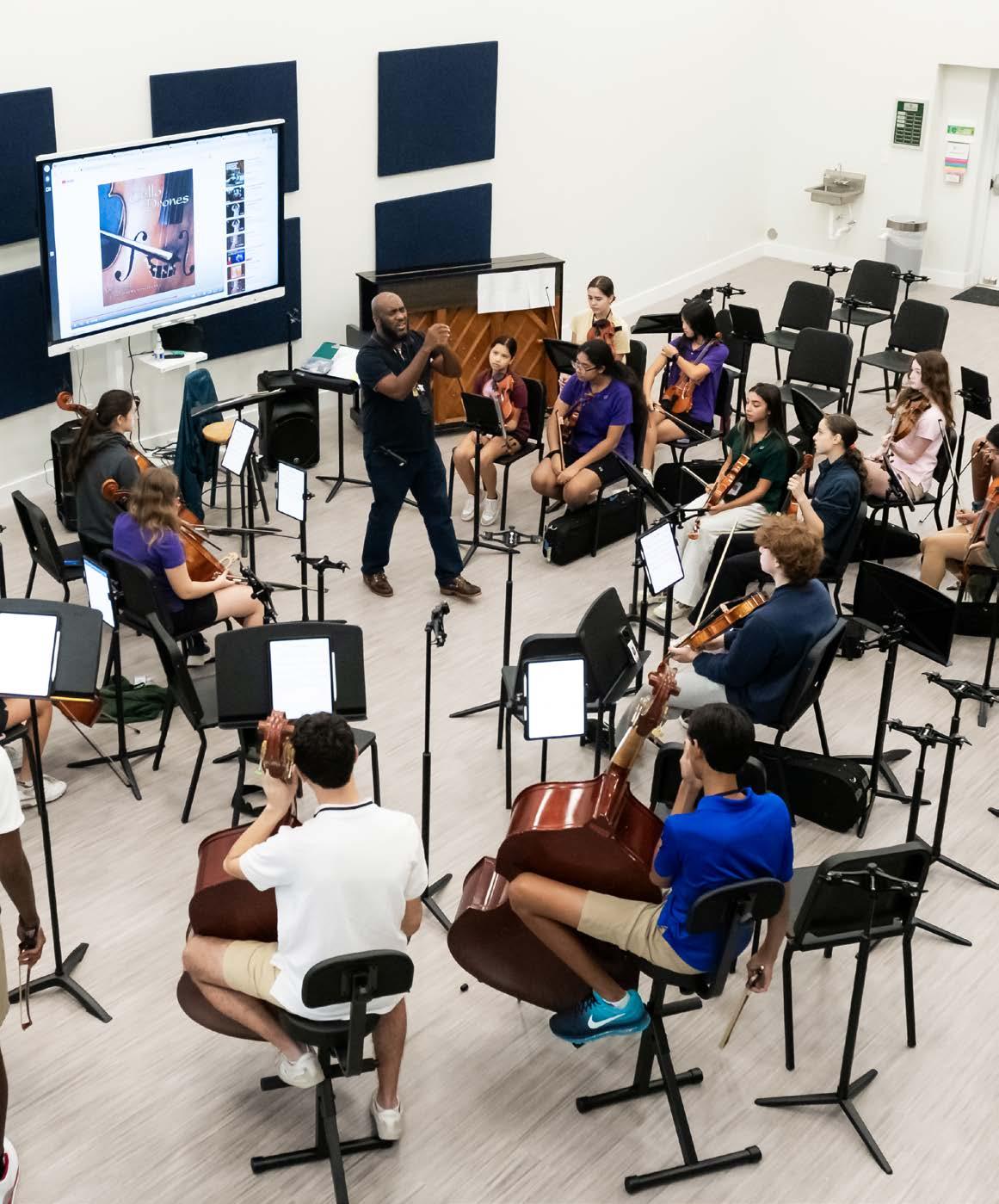
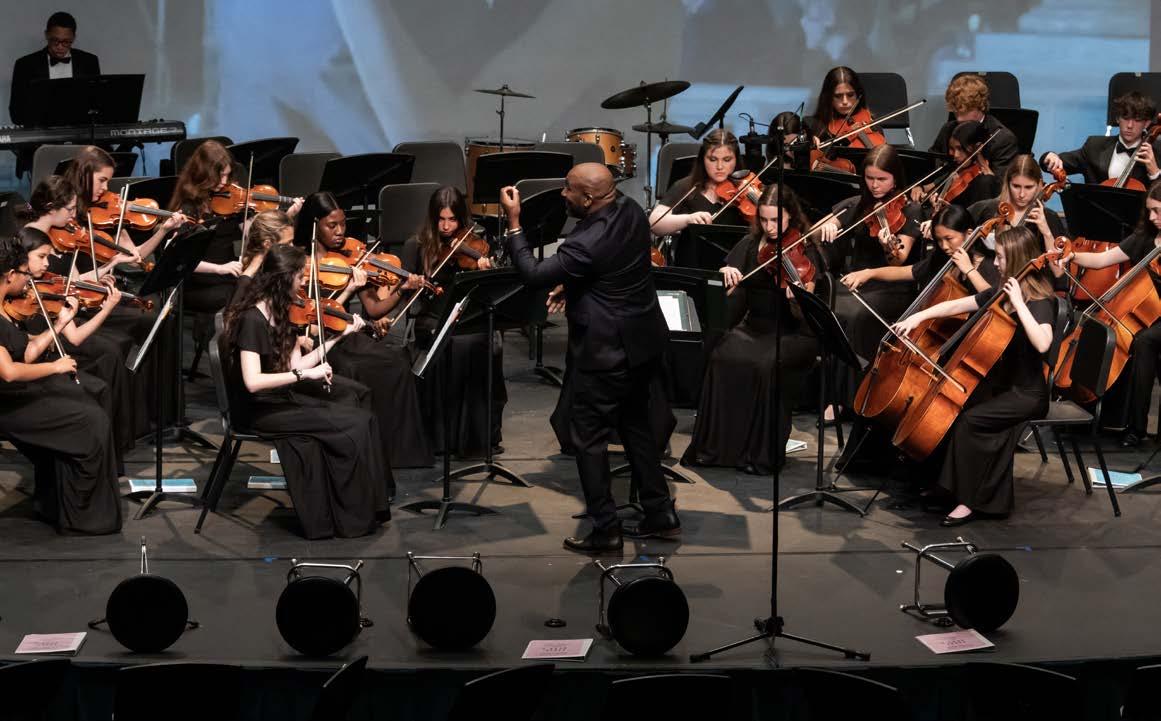
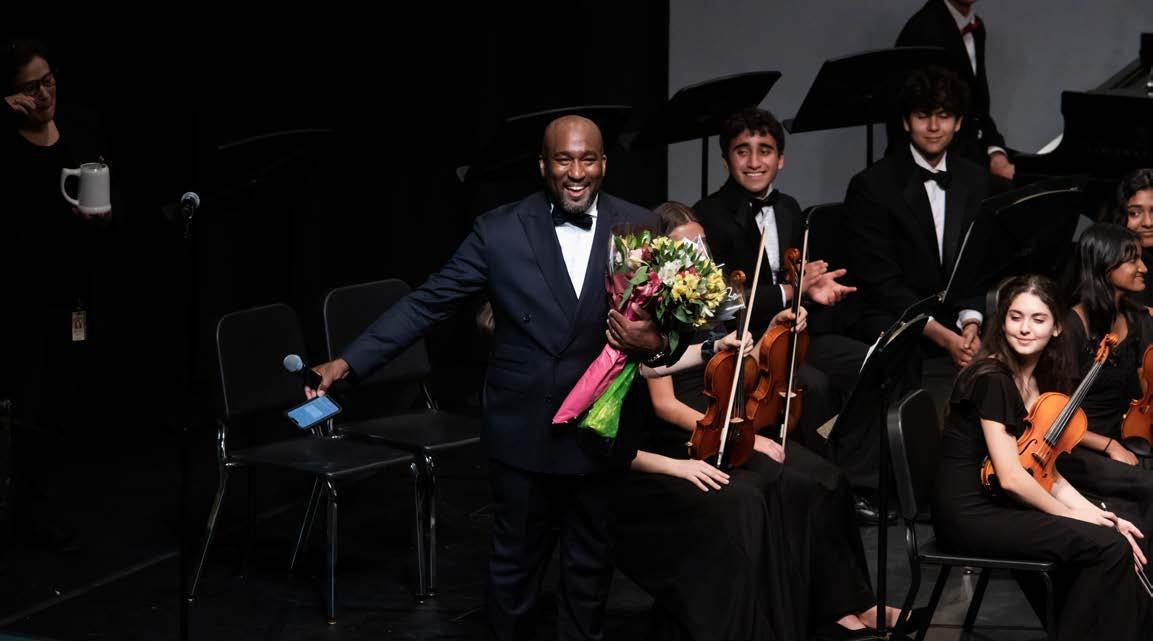
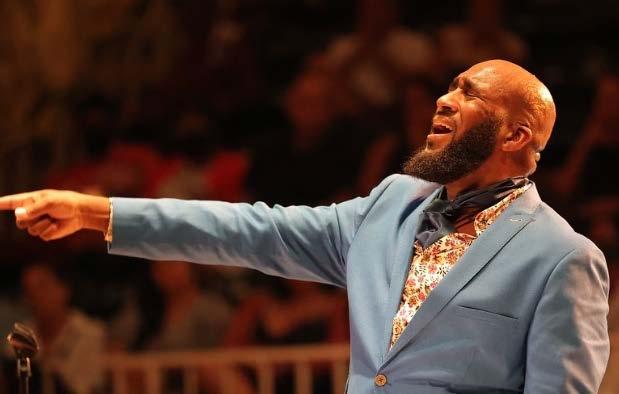
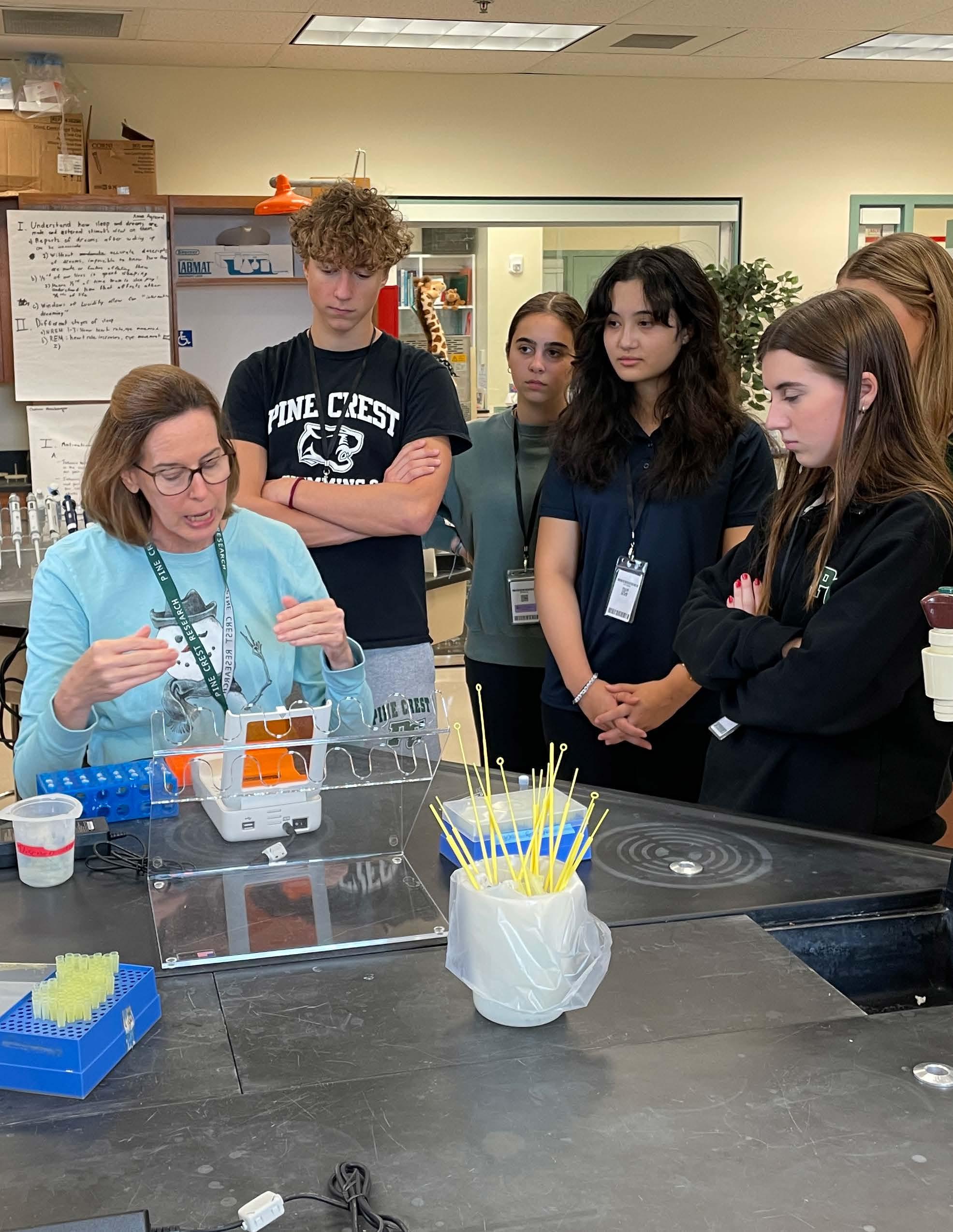
WE CAN SAY WITH ABSOLUTE CERTAINTY THAT THE FUTURE OF SCIENCE IS BRIGHT AND THESE SCIENTIST CHANGEMAKERS ARE LAYING THE GROUNDWORK FOR BOLD IDEAS, DISCOVERIES, AND SCIENTIFIC ENGAGEMENT.”
–MS. JENNIFER GORDINIER
SCIENCE RESEARCH PROFILE
SHAPING THE FUTURE OF SCIENCE
IIN THE HUIZENGA FAMILY SCIENCE CENTER, a unique program has taken root over the past 23 years, nurturing the scientists of tomorrow. The Pine Crest Science Research Program is one of our school’s most unique opportunities. The program has grown significantly in the number of students who pursue independent research in a variety of science, technology, engineering, and mathematics (STEM) disciplines and the different approaches a student uses to conduct research. The program, under the leadership of Ms. Jennifer Gordinier and Mrs. Katherine Ganden, has seen these endeavors earn national and international recognition, setting the stage for a bright future in the world of scientific research.
Rebecca Adler ’23 is a recent graduate of the program. She was drawn to the program as an eighth-grade student after
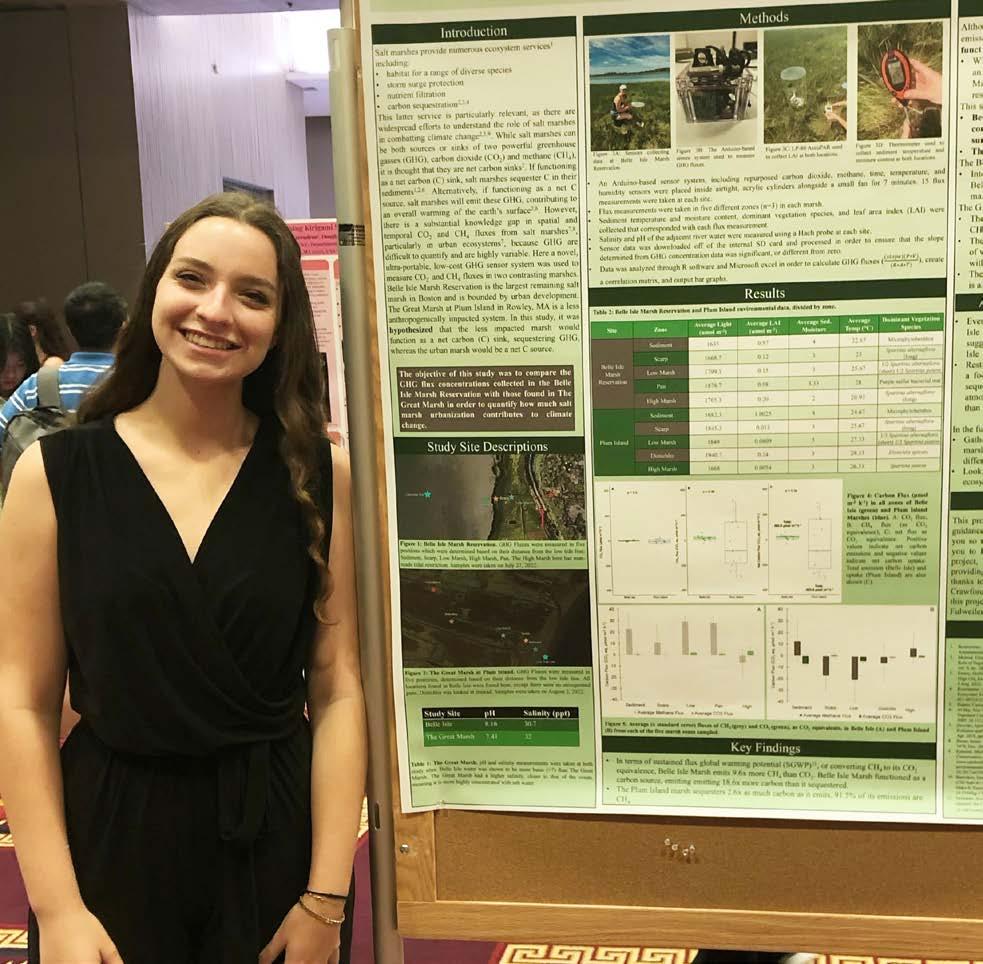
competing and winning an award from NASA and second place in the state science fair for her independent research project utilizing math to explore the expansion of the universe. Upon meeting Ms. Gordinier and the rest of the Pine Crest Upper School attendees at the state science fair, she was thrilled to learn that her scientific exploration could continue with expert faculty guidance and within a cohort of teen scientists.
Over the course of five years, Rebecca conducted seven independent research projects that have been awarded state, national, and international honors. One of her most notable accomplishments was winning first place in the Florida Junior Science, Engineering and Humanities Symposium (JSEHS), for her research titled ‘Assessing the Sensitivity of Acropora Cervicornis Resulting from Exposure to Polycyclic Aromatic Hydrocarbons’. This outstanding regional achievement allowed her to represent the state of Florida at the Junior Science and Humanities Symposium (JSHS), a national symposium organized by the United States Department of Defense whose aim is to connect talented students, their teachers, and research professionals at affiliated symposia and reward research excellence.
“Presenting my work at JSHS provided me with the invaluable opportunity to meet extremely intelligent high school researchers from across the nation and hear about their research, as well as learn about impactful nationwide research being conducted through the Department of Defense,” Rebecca recalled of her experience.
Rebecca was also the recipient of the Environmental Challenges Interdisciplinary Award for her research on coral reefs. She earned this distinction, among fellow high school, undergraduate, and graduate students at the International Forum for Research Excellence (IFoRE), hosted by the Scientific Research Honor Society, Sigma Xi.
PINE CREST SCHOOL | 37
Rebecca Adler ’23 poster presentation at JSHS
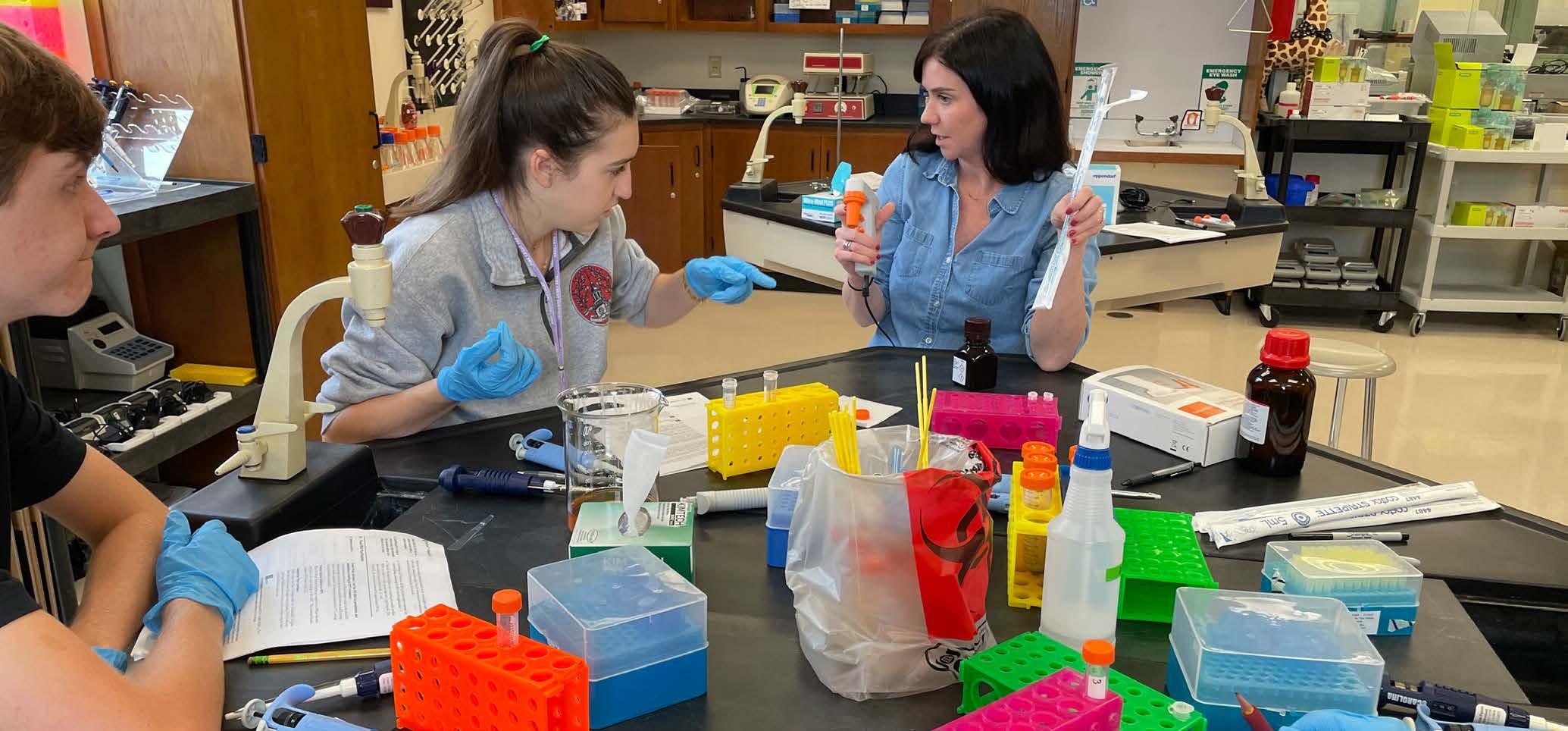
“I learned so much from the other student researchers through their presentations,” Rebecca said, “as well as from the professors who were invited as keynote speakers. Presenting my own research to a room filled with high school students, undergraduate students, graduate students, and professors helped foster my confidence and presentation skills.”
Students may apply to the program in the Spring of their freshman year. Once students are selected to join the Science Research program, sophomores are encouraged to do a lot of reading. “If they have an idea of what they want to study, their interest helps them narrow down options. If they don’t know, they may research in many categories, working to pinpoint a topic before their first conference. This flexibility early on in the process gives students the opportunity to explore different things without committing to something they may not be passionate about,” said Mrs. Ganden. Sophomores have the exciting opportunity to present a literature review on a selected topic at JSEHS in the non-competitive division, and the experience of presenting and being around their classmates and other researchers from around the state is invaluable.
The Pine Crest Science Research Program’s curriculum is both rigorous and rewarding. Starting in their sophomore year, students are encouraged to read and narrow down their topics for study. Under the guidance of their mentors, they present literature reviews and gradually dive deeper into scientific literature and lab techniques. This groundwork sets them up for more intensive research, often conducted over the summers. These immersive experiences in established labs propel their learning. As juniors, the students fine-tune their findings, focusing on communicating their research through presentations, posters, and written articles. The senior year marks the culmination of their efforts, with many submitting their work to the Regeneron Science Talent Search, a hallmark of high school scientific achievements.
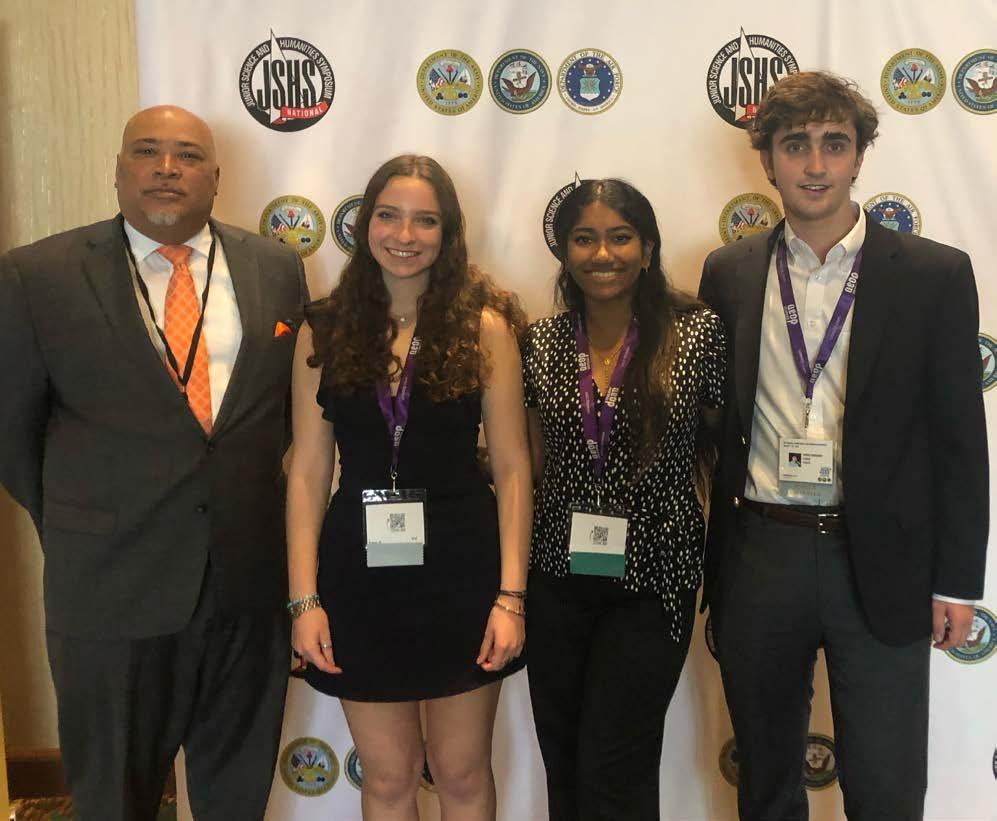
“We also focus on teaching students how to analyze scientific literature, and research it—basic lab skills. Historically, we have focused on techniques in molecular biology and we find that a lot of what we’re doing in the lab is transferable to any discipline they want to explore,” Mrs. Ganden explained. Students learn how to record procedures in the lab, troubleshoot, make modifications when necessary and thoroughly document their process. “We are able to investigate rather sophisticated questions because of the resources, equipment, and software the Pine Crest research lab has,” said Ms. Gordinier. “Connecting their results with methods is something we emphasize with them; asking why was this method selected to investigate a particular question and how do their results illustrate what occurred is something they’ll hear again and again.”
Many students spend the summer before their junior year conducting lab work, and a great deal of time is dedicated to modeling how to contact potential mentors whose interests mirror their own. “We have a saying in the program: ‘Research
38 | PINE CREST SCHOOL
Mrs. Kate Ganden works with students on their gene expression experimental model.
Rebecca Adler ’23 receives an award at JSHS
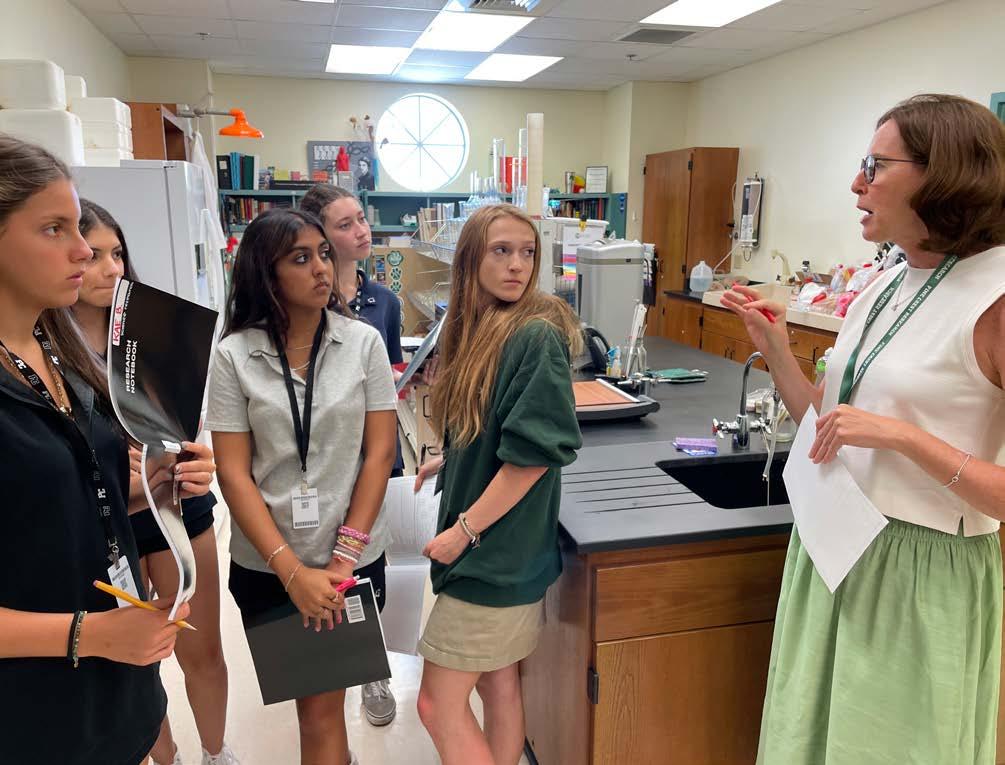
cannot be done in 45 minutes,’” said Ms. Gordinier, “So setting aside a portion of a student’s summer vacation provides a large block of uninterrupted time for students to make significant progress towards their research. This also requires a commitment on behalf of students and their families to do so. For many students, they see this as their first research experience and despite what we accomplish in the sophomore year, the initiative to commute to and from their lab each day, exposure to working in a research lab at a university with expectations of independence and knowing their contributions are being relied on by others is significant.”
Mrs. Ganden continued, “Summer work is not a requirement, but it gives them an advantage going into junior year. In the fall, as juniors, they take a step back and reflect on the work they did, why they did it, and what it means. Many continue their summer research or begin research when they return in the fall.” Throughout the junior year, communication is emphasized. Students are building oral presentations, posters, and written reports. There aren’t timing requirements for these research outcomes, so class time is more independent and student-directed. During the school year juniors host Science Cafés, where they present where they are at that moment in their research. If they are far enough along, students can apply to a variety of different research symposia. “IFoRE, which happens annually in November, is not just for high school students; it is more focused on practicing scientists which lets students see the work being done in prestigious universities and get feedback on their work,” said Mrs. Ganden. “Any student who presents and places at IFoRE is inducted as an honorary member of the Sigma Xi organization.”
Other competitions include JSEHS (which they would have already experienced as sophomores), and the Broward County Science Fair. “We host an internal science fair,” continued Mrs.
Ganden, “and from that, 15 students are selected to participate in the county fair. Depending on how students do, they can qualify to compete at the state science fair and then at the International Science and Engineering Fair (ISEF). The goal for students is not competition or product—it is the process. If their research is recognized it’s fantastic, but a win factors less for us than students continuing to become better at communicating their findings and in their understanding of the research aims they are investigating. Flexibility in the program emphasizes our focus on the science research process overall.”
A majority of students will spend the summer before their senior year conducting research. When asked about her time in completing research in labs, Rebecca highlights that she loved being involved in the bustling lab setting. “I learned so much not only from professors and mentors, but also from the many undergraduate and graduate students working on their own projects and researching in the lab.” She emphasized how these experiences allowed her to have multiple years of research under her belt before heading off to college.
“Research allowed me to expand on my interests beyond the classroom through hands-on work and exploration,” said Rebecca. Throughout Upper School, Rebecca worked in two different labs to conduct research. The first was the Nova Southeastern University Oceanographic Center under the guidance of Dr. Abigail Renegar. There, she spent two years exploring the endangered coral species, Acropora cervicornis, and its ability to withstand toxic chemicals. Her research resulted in the discovery of a toxin-resistant coral that could serve to rebuild South Florida’s rapidly deteriorating coral reefs. “I learned a lot about marine science and the importance of coral reef ecosystems as an essential barrier to sea level rise and global warming,” she explained.
Rebecca’s lab experience during the summer before her senior year was as an intern at the Boston University Department of Earth and Environment’s Fulweiler Lab through the BU RISE Summer Internship Program. There, Rebecca studied nutrient cycling, specifically the carbon cycle. “That summer was truly exciting,” she said. “I extended what I learned from AP Biology to real life through many days spent in the marshes of Boston, where I calculated greenhouse gas fluxes as a way to seek solutions to global warming.”
One of the principal goals in the final year of the program is for senior researchers to submit their research report and application to the Regeneron Science Talent Search, the nation’s oldest and most prestigious science and math competition for high school seniors. “The application is extensive and emphasizes the whole of a student’s research experience,” explains Ms.
PINE CREST SCHOOL | 39
Ms. Jennifer Gordinier explains the equipment to be used for a lab assignment.
Gordinier. “It is more than the completion of a research report although that is an important component, and asks students to comment on the impact of their research and how doing research has shaped their experience as a student-scientist.” Semi-finalists, announced in January, are determined by a student’s research report, personal essays, transcript, research experience, and letters of recommendation.
“During their second semester, all seniors participate in the science fair and help review junior research in addition to a continuation of our journal club series, where students present on timely current events in science allowing them to explore different disciplines. They also do a presentation on a lab they are interested in reaching out to at the college or university they will attend that fall. A favorite of our seniors because they may find a new area of interest, different from what they’ve investigated in high school, or realize that the tools they’ve used in their research can be applied to new questions is especially motivating for students as they consider future opportunities for themselves. Finally, they participate in mentoring other students interested in science research at local schools. Last year, we worked with students at Northeast High School in Oakland Park. We had students pair up with freshmen there to talk about what research looks like, how to find professors, and how the literature looks. Our students are invaluable resources for their peers who may not have the same access at their own schools. We’re excited to see other local programs build and grow and for our students to contribute their expertise reveals so much about their character and dedication to science.”
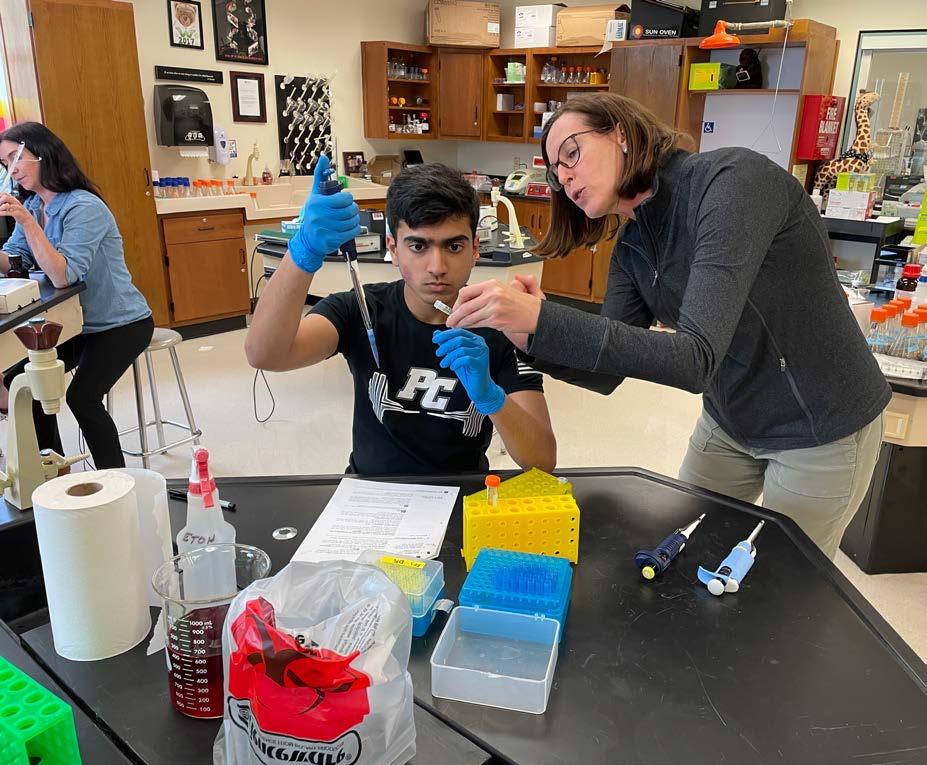
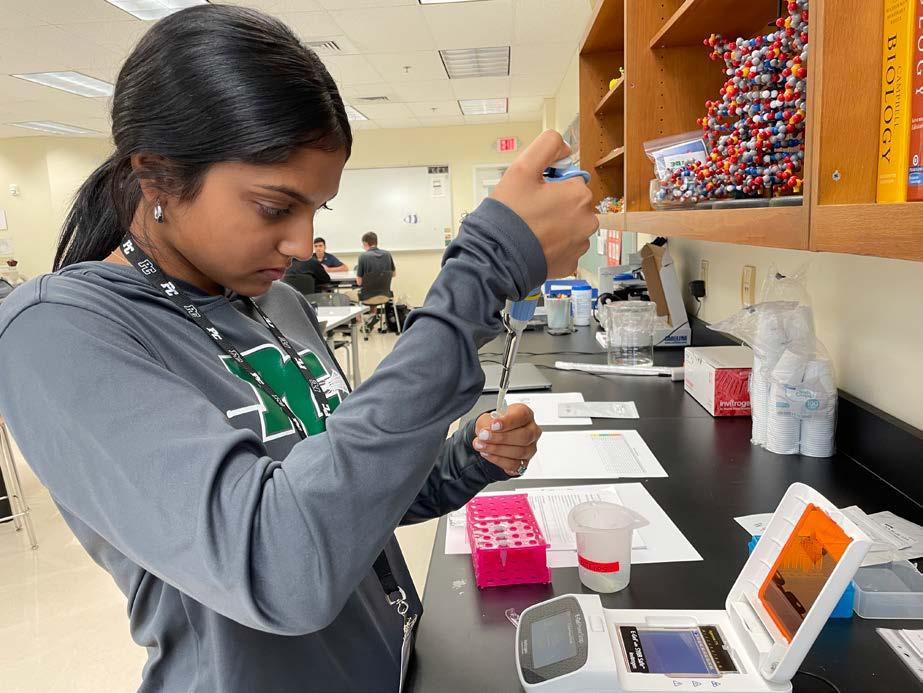
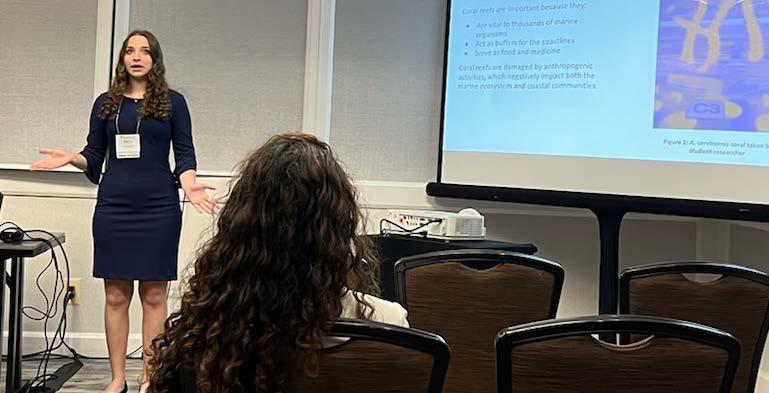
40 | PINE CREST SCHOOL
Ms. Jennifer Gordinier explains pipetting technique to Akshat Badgamia ‘23
Rebecca Adler ’23 presenting at iFoRE
Diya Jain ’23 runs gel electrophoresis to analyze her group’s PCR samples.
“The goal of the three-year program is to train students to think and work like scientists,” said Mrs. Ganden. “Each year of the program is really tailored to a student’s individualized interests and goals, but it is our hope that all students who conduct research in high school approach the process as a continuum with plenty of tangents, successes, and failures, and who graduate as strong critical thinkers and communicators recognizing the impact science and technology plays in fields such as medicine, climate science, and artificial intelligence (AI),“ said Ms. Gordinier. “We can say with absolute certainty that the future of science is bright and these scientist changemakers are laying the groundwork for bold ideas, discoveries, and scientific engagement in ways we are privileged to provide the initial foundation for.”
Rebecca’s journey exemplifies the transformative nature of this program. Her years of exploration, from the coral reefs of Florida to the marshes of Boston, have equipped her with unparalleled knowledge and skills, ready to address global challenges such as climate change and sea level rise. However, it is not just about individual accomplishments. The program lays significant emphasis on nurturing scientific curiosity and shaping the changemakers who will reshape the landscape of science in the future.
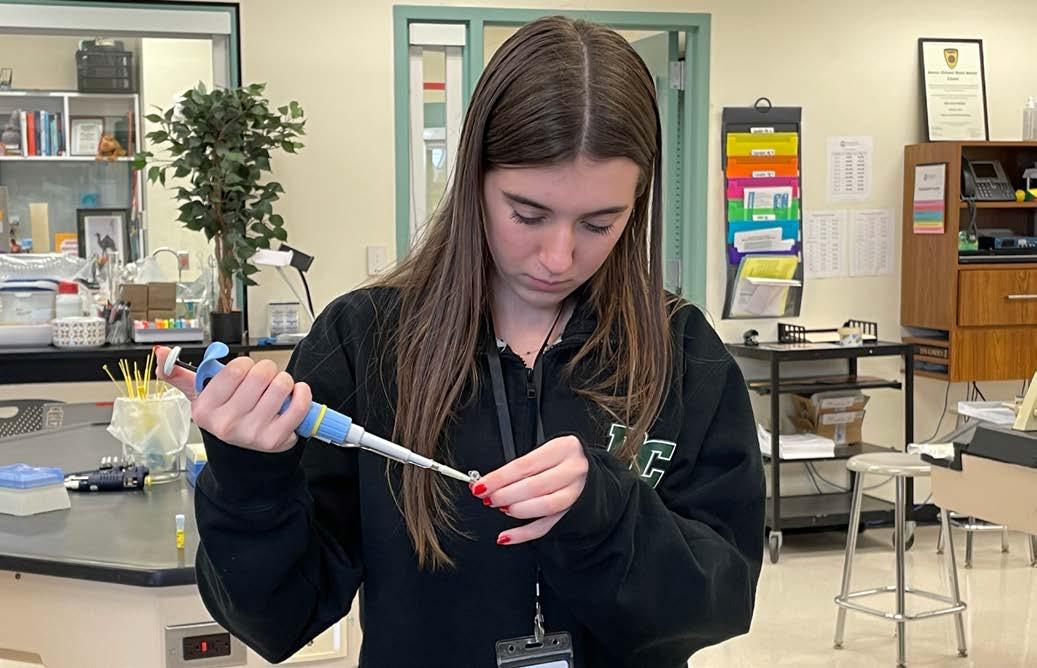
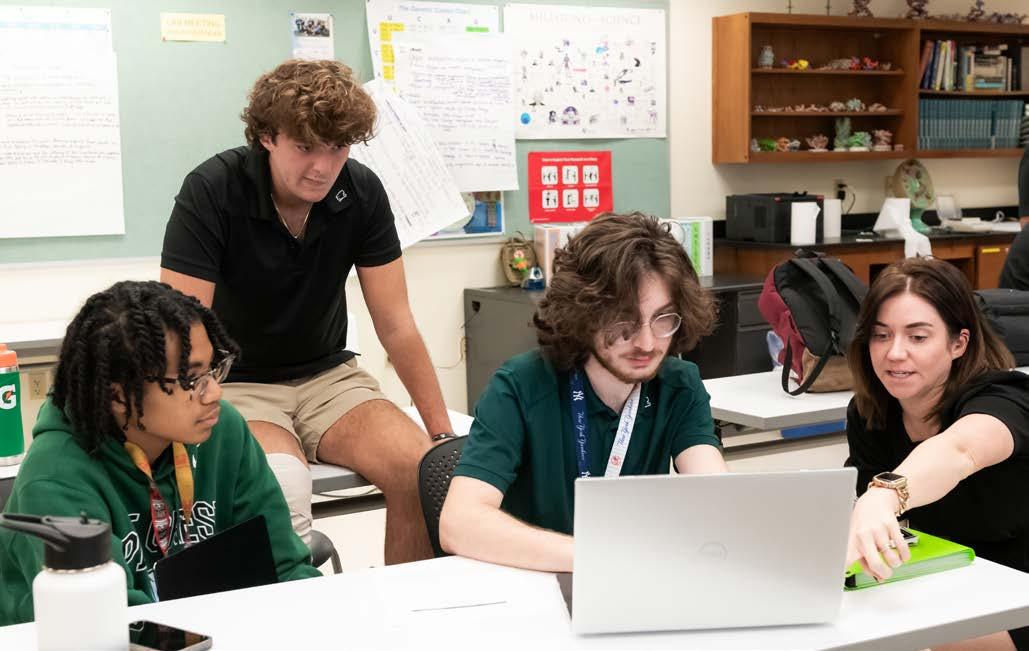
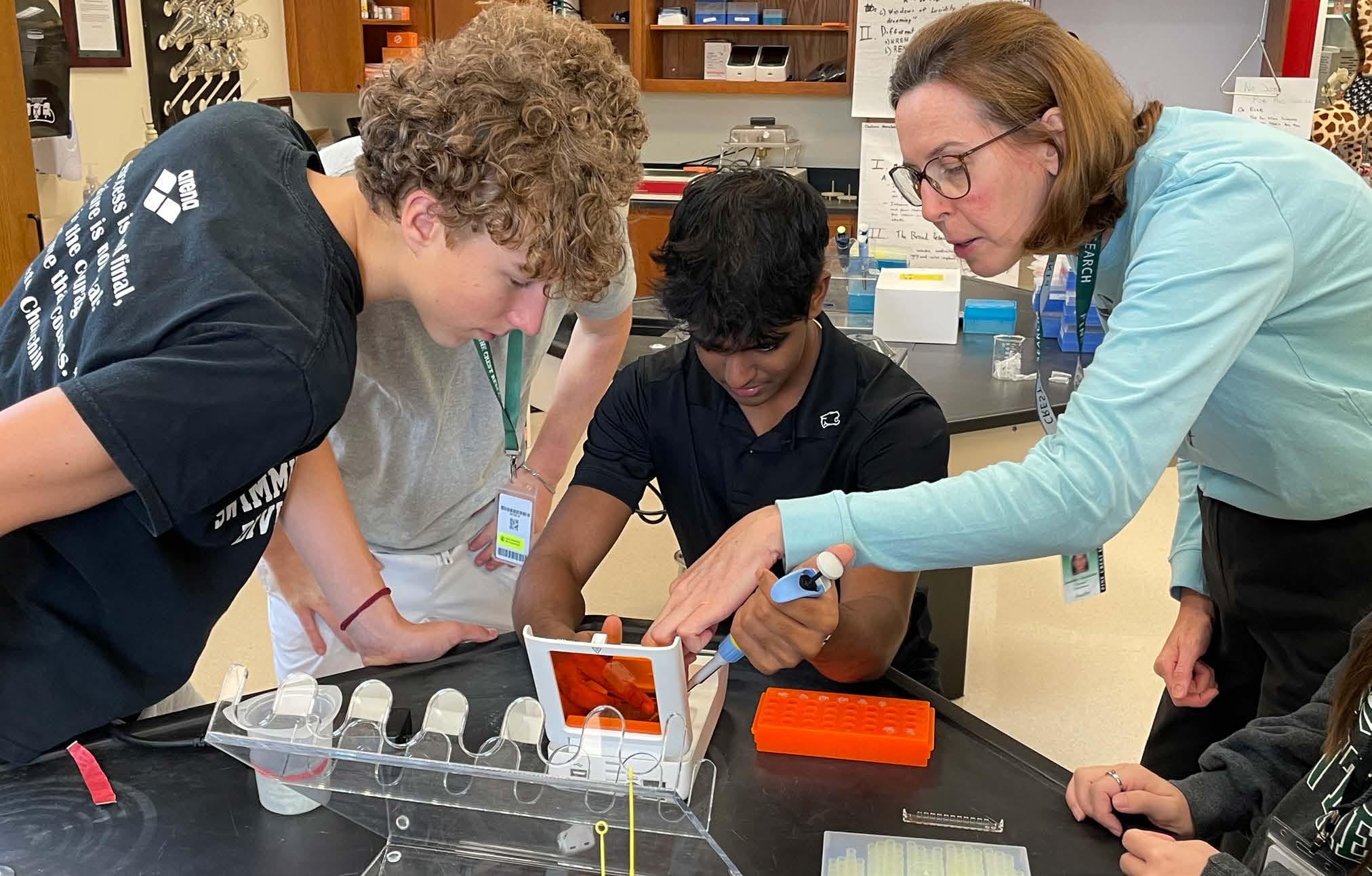
PINE CREST SCHOOL | 41
Mrs. Kate Ganden helping students in a group project
Mia Farber ‘26 carefully pipetting a solution during class
Ms. Jennifer Gordinier offers feedback to students as they run gel electrophoresis.
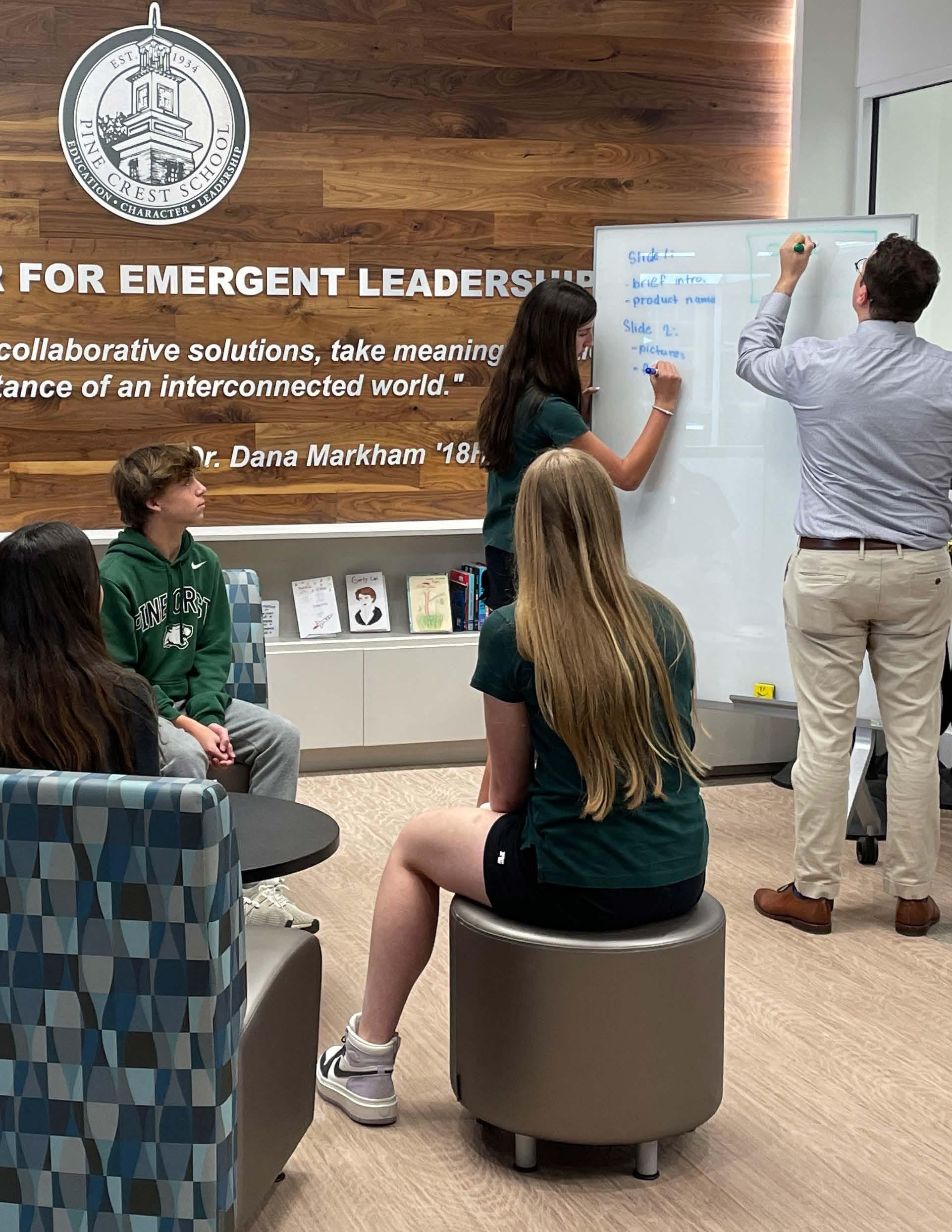
LEADERSHIP CURRICULUM IN MIDDLE SCHOOL
AAT PINE CREST MIDDLE SCHOOL, EIGHTH GRADE STUDENTS ARE OFFERED A UNIQUE COURSE OPTION CENTERED AROUND EMERGENT LEADERSHIP. This course aims to nurture emergent leadership abilities, with a particular focus on developing skills essential to becoming entrepreneurs and leaders. Students will learn valuable skills such as collaboration, the art of public speaking, resiliency, and adaptability which are critical for their development as future leaders.
“All students are leaders,” said Middle
School Instructor on the Fort Lauderdale campus, Mrs. Amanda Holender. “Sometimes, they just don’t know it yet. Our approach is to help all of our students discover their leadership ability, and to believe in their capacity to lead.”
“As education evolves,” said Dr. Kristi Combs, Middle School Head on the Boca Raton campus, “we have realized that training our students to be leaders is an important foundational skill. Emergent leaders enhance the performance of an organization while improving the lives of

those around them. As the future unfolds and new skills are needed, emergent leaders will rise to meet those challenges.”
“During Middle School, students are starting to explore what type of leader they want to be,” Dr. Combs continued. “The leadership course asks ‘what is needed in the community and how can it be achieved?’ They look at their own personal traits and skills, as well as those of the people around them, and ask ‘how can we tap into our passions and make it a reality?’ This sets students up for a reflective and forward-thinking mindset. The course expands students’ vision beyond themselves, and creates an openness to new ways of working and an awareness that their actions can impact others positively.”
Mrs. Holender believes the leadership course is well-suited for eighth grade students. “Eighth graders are the leaders of the Middle School. Sixth and seventh grade students look to them as role models. At the same time, eighth graders are looking forward to a new division, a new way of life as they move into Upper School. There they will be presented with more opportunities, not just academically, but socially, athletically, and more. So many doors open for them in
PINE CREST SCHOOL | 43
Leadership students collaborate for a class assignment.

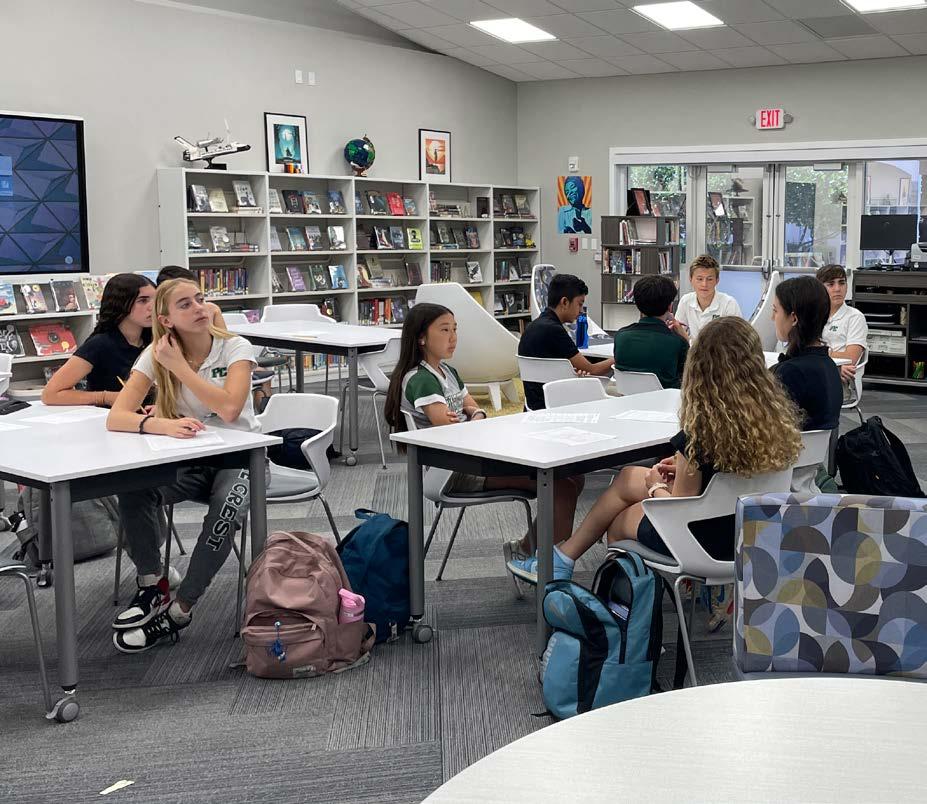

Upper School and developing that confidence and leadership in them now will help them choose to seize the right opportunities.”
Reflecting on why this course is important to have now, Mrs. Holender notes a recent email from Pine Crest School President Dr. Dana Markham ’18H. “Dr. Markham said in her recent letter to the faculty, that many of our students’ future careers don’t exist yet—the things they will do don’t exist yet.
As educators, we believe that our students need to have the skills not to just fill these jobs, but to create them. They are going to create our future.”
“I think adults can often underestimate what children are capable of, so children may underestimate what they are capable of. We needed to carve this space out in the curriculum to highlight our belief in students’ ability to do important things,” Mrs. Holender said.
The addition of emergent leadership to the Pine Crest School curriculum began during the 2021-22 school year to fulfill our mission of being global leaders and problem solvers. “This curriculum introduces more opportunities for hands-on, actionbased learning projects so that students and teachers are not speaking abstractly about leadership,” said Dr. Combs. “We embed leadership, social emotional education (SEE), communication, and public speaking in our teaching starting in pre-kindergarten, and now with leadership being
taught intentionally, we are able to reinforce these critical skills.”
In defining emergent leadership, Mrs. Holender said, “Every student has the potential to be a leader. Depending on their individual skills and strengths, one student might rise to the occasion in a certain situation and there could be other situations when someone else might be a better fit. By default we think of leaders as the elected, but there are many opportunities where people step up voluntarily or help galvanize a movement. Those are the emergent leaders—they did not ask to lead, but fulfilled that role naturally because of their passions. They saw a need and rose to the challenge.”
“We believe that coaching students to see themselves as leaders will give them the mindset to tackle whatever comes their way.”
The learning objectives for this course are to explore and assess effective models of leadership and to practice leadership.
“The class starts with an exploration of what it means to be a leader,” said Mrs. Holender. “The course encourages reflection, as we look at what characteristics leaders share and what characteristics the students already have that we need to recognize. Then we’ll move to what a leader does, and look at what actions leaders take. Our passion is to help students identify the various scenarios where they can lead; in their communities, among their friend groups, in the classroom, and in the sports arena. Then we will build
44 | PINE CREST SCHOOL
Mr. Christopher Harrison leads the eighth grade leadership class on the Boca Raton campus.
Leadership students in a discussion at the Fort Lauderdale campus
Abigale Alexandre ’28 presents to the class.
OUR APPROACH IS TO HELP ALL OF OUR STUDENTS DISCOVER THEIR LEADERSHIP ABILITY, AND TO BELIEVE IN THEIR CAPACITY TO LEAD.”
- MRS. AMANDA HOLENDER
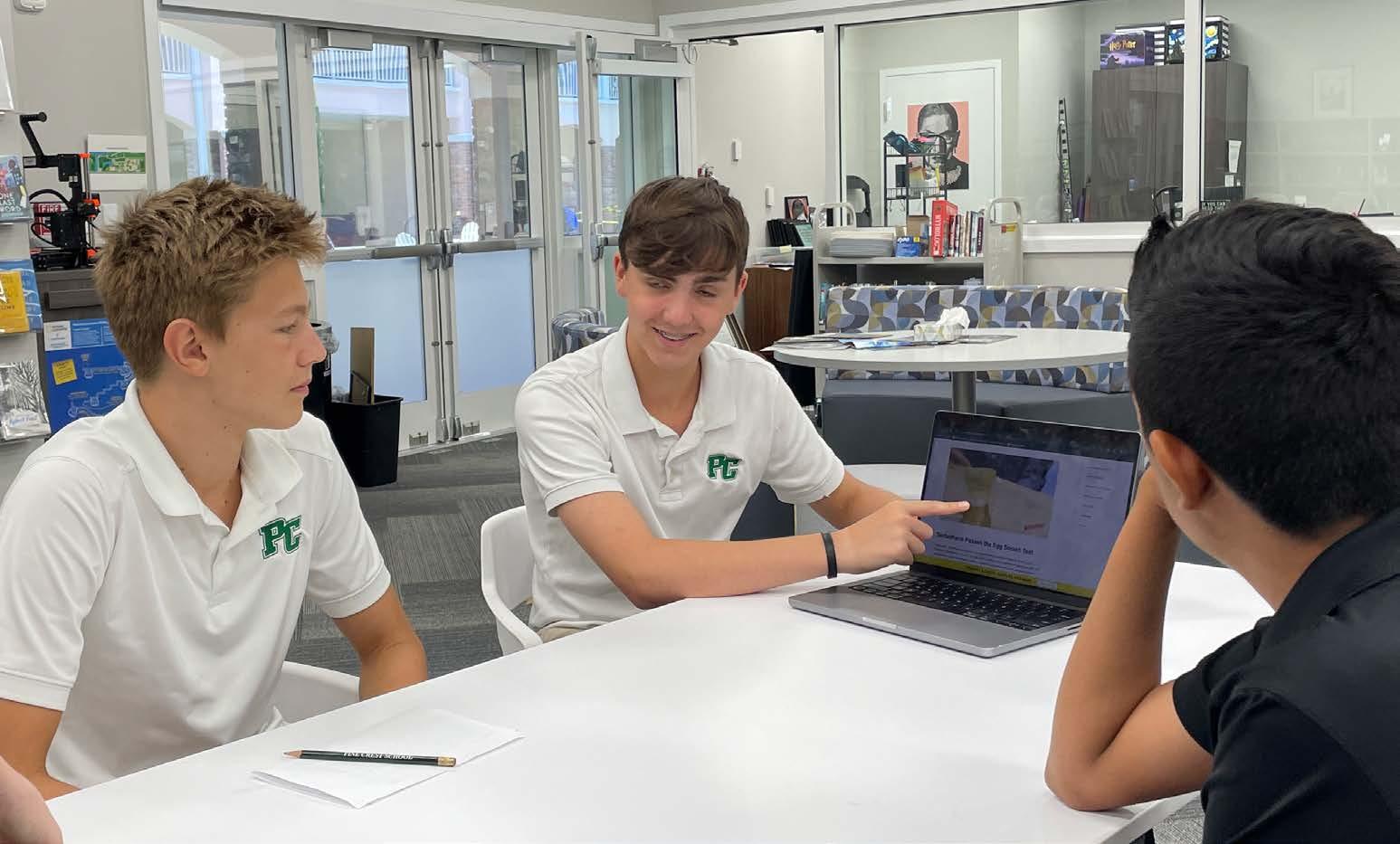
the mindset of a leader and help students understand how to take action.”
Eighth grade students on the Boca Raton campus will take this course in the recently constructed Beyer Center for Emergent Leadership. The new facility was realized as part of Dr. Markham’s vision for our students in the 2019–24 strategic plan. The intentional design of the building is to teach students the skills to make them successful in taking on global challenges. The two story building features classrooms for 2D and 3D design fabrication, computer science, robotics, and emergent technologies including augmented and virtual reality, eSports, artificial intelligence and coding. It is also home to the Middle School library, service learning space, and emergent leadership programming.
“Using a space designed for collaboration promotes elements of leadership like challenging our own perspectives and promoting discussions,” said Dr. Combs. “The building is equipped with technology to facilitate the sharing of ideas, presenting and engaging with others, not necessarily as a big group but in small groups and cohorts. The flexibility of the spaces lets us teach differently than we do in a standard classroom.”
“We know that the global challenges students will face within the next five or 10 years are unknown,” said Dr. Combs. “We
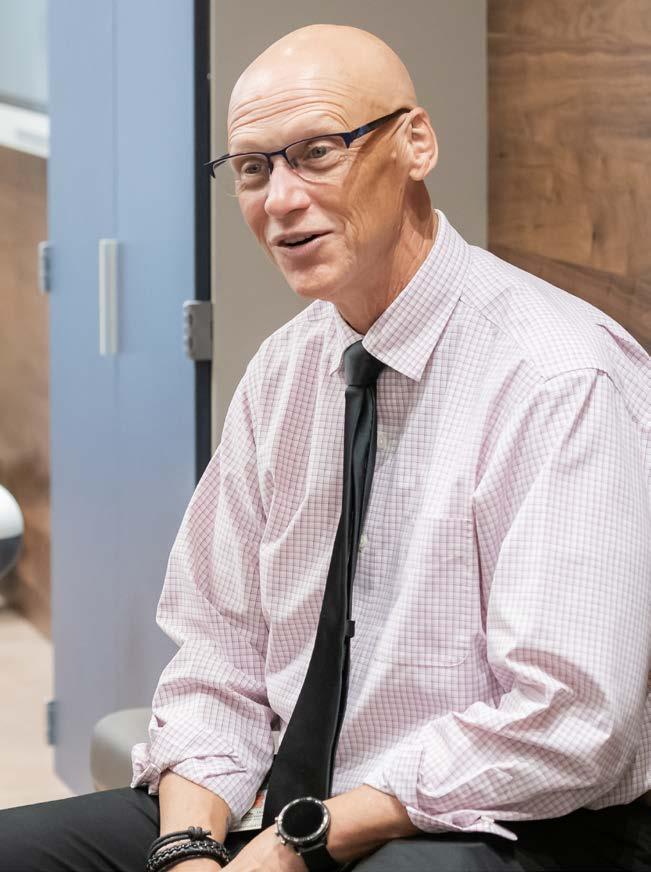
also know that Pine Crest students are the leaders of the future and are marching into the unknown—the jobs they will have may not exist yet. This vision came directly from Dr. Markham to make students successful. She is the most direct and clear leader about student growth and supporting students in all aspects of their development. She consistently asks the faculty, ‘How do we help each student grow to be their best self?’ We can do that by teaching them to be collaborative, inclusive, and to respect others. All of this comes alive in her guidance to us as faculty and staff when we talk about learning and inspiring teachers to create opportunities for students.”
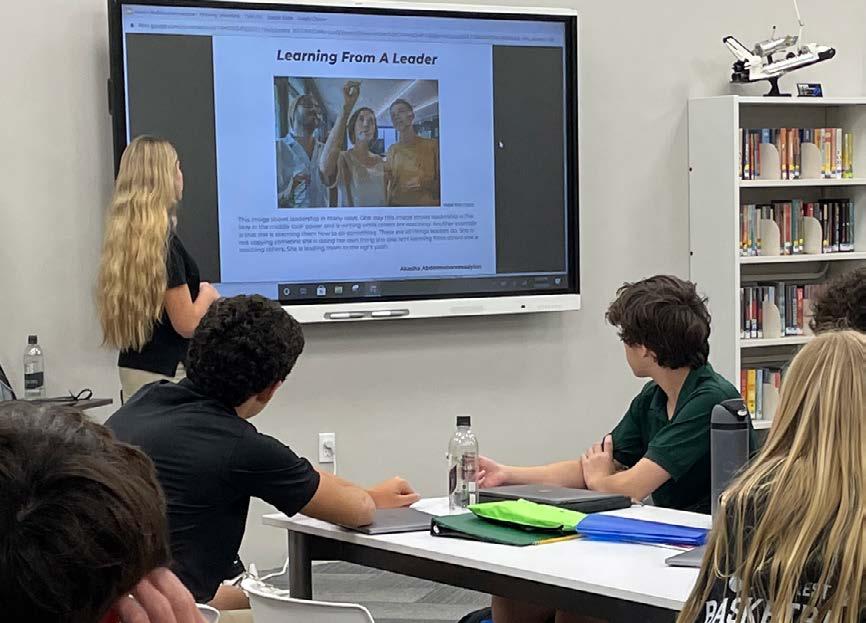
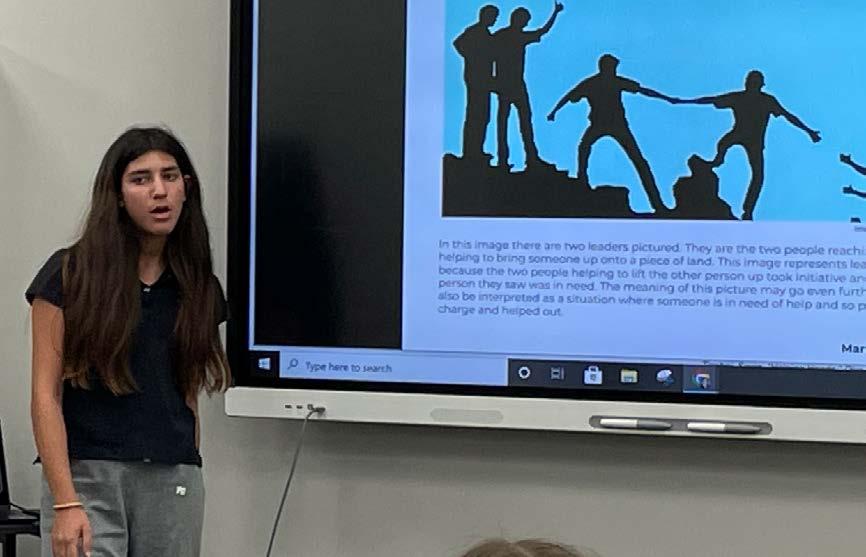

PINE CREST SCHOOL | 45
Eighth grade students working together in class
Mr. Christopher Harrison, Dean of Middle School and Emergent Leadership provides feedback and encouragement.
Fort Lauderdale eighth grade students present different types of leadership.
FOSTERING THE ENTREPRENEURIAL SPIRIT
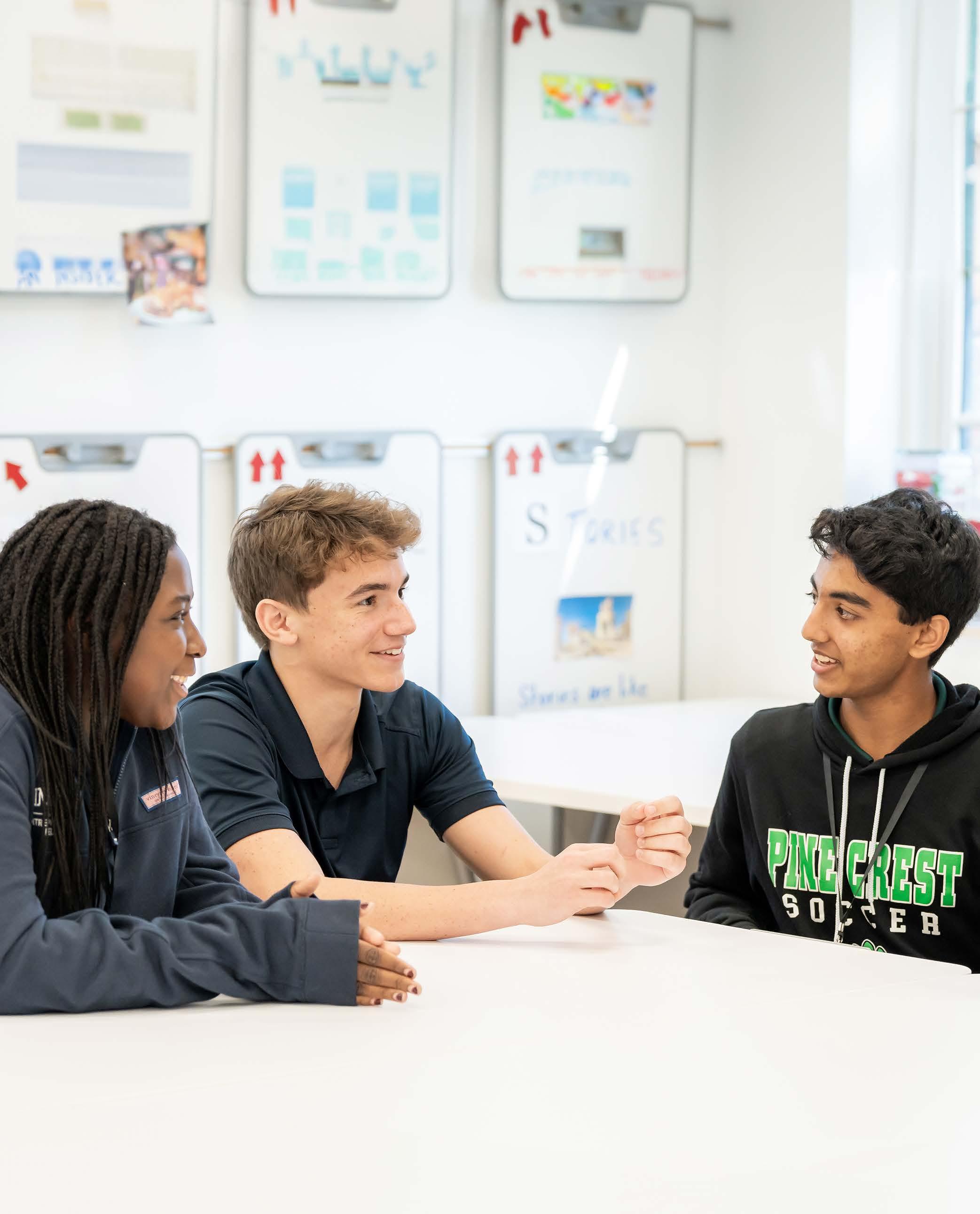
STUDENTS ARE LEARNING HOW TO BE A VOICE FOR THOSE WHO DON’T HAVE ONE.”
–MRS. KERI KOLETTIS
46 | PINE CREST SCHOOL
OOVER THE LAST FIVE YEARS, PINE CREST UPPER SCHOOL STUDENTS WITH AN INTEREST IN ENTREPRENEURSHIP have had the opportunity to apply for the three-year social entrepreneurship program.
Taught by Mrs. Keri Kolettis, Head of Innovation and Entrepreneurship at Pine Crest, this unique curriculum focuses not just on the traditional elements of entrepreneurship but challenges students to think about how they can make a positive impact on communities.
“The curriculum was designed beyond simply learning about ‘business principles,’” said Mrs. Kolettis. “It is unique to Pine Crest Upper School. This program serves as an extension of Dr. Markham’s vision for students to gain practical experience and make an impact in a realworld setting.”
The course incorporates service learning, experiential learning, collaboration, leadership development, emerging technologies, and research-based practices that encourage students to think critically and creatively. “Students delve into com-
plex issues across academic disciplines,” continued Mrs. Kolettis, “and develop a deep understanding of global challenges. We have embedded experiences in the classroom to ensure cultural competence and worldly perspectives both in the curriculum and through guest speakers. Students are learning how to be a voice for those who don’t have one, whatever their interests may be.”
The application process to join the program spans eight weeks and includes interviews with current students in the program. “I am a coach putting together a multifaceted team,” said Mrs. Kolettis.
“I need the actor, the mathematician, the graphic designer, the yearbook editor, the quarterback—a group of likeminded individuals with different talents and interests who possess an entrepreneurial mindset to analyze, engage in critical thinking, collaborate, be communicative and resilient. I am looking for students who demonstrate accountability and advocacy, have stress tolerance, can take mentorship feedback, can fail
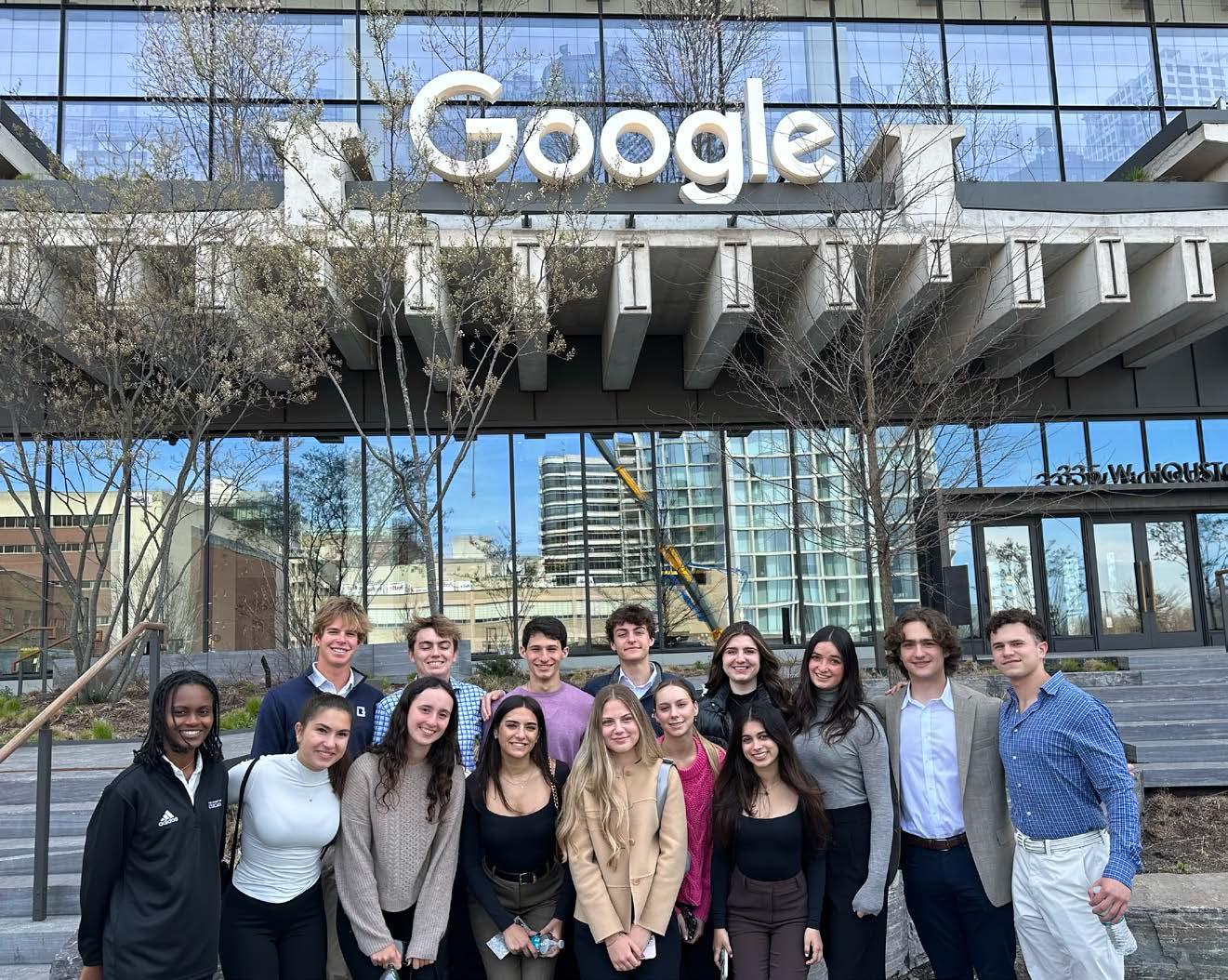
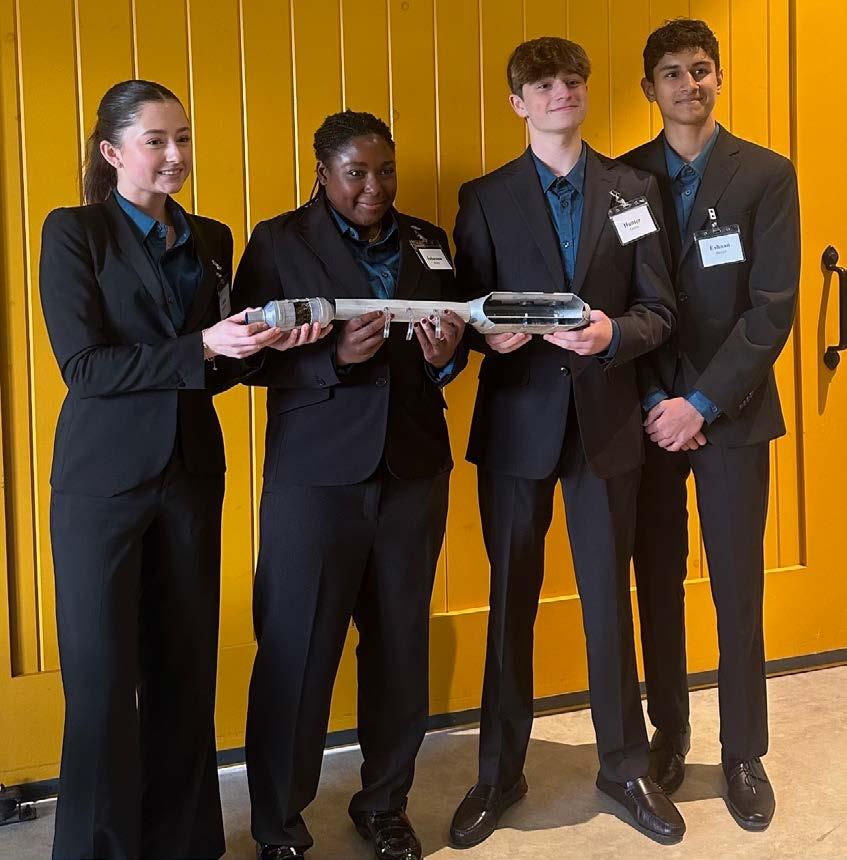
forward, and who can be reflective.”
The first year of the class focuses on the science of team building and skills to pinpoint far-reaching issues that need solutions. “Every incoming cohort has a culture,” said Mrs. Kolettis. “They have to answer ‘what binds us, brings us together, and what do we stand for?’ We learn how to identify problems on a community, regional, and global level, and discuss opportunity recognition.”
“We distinguish traditional entrepreneurship and social entrepreneurship,” Mrs. Kolettis explained, “which focuses on conscious capitalism and corporate social responsibility. We look at the entrepreneurial landscape which refers to passion, people, purpose, and profit. I tell students that they must be passionate about what they’re doing—a passion-first approach. Then they have to look at sustainability, feasibility, and how they will capture value. Students identify potential mentors, opportunities for venture capitalism, and how to raise seed money to launch their ideas. But they must also be proficient presenters and storytellers. “You can be the smartest person in the room, but if you can’t articulate your ‘why,’ no one is going to get it.”
The second year of the program shifts the focus to finance—business models, budget, expenditures, cost analysis, profit and loss statements, three-to-five
PINE CREST SCHOOL | 47
The Class of 2024 cohort traveled to New York City for their senior trip where they met with alumni working at Google, Snap Inc, and Expanding Capital.
Logan Schwedelson ’26, Johanna Henry ’26, Eshaan Atreya ’26, and Hunter Gittlin ’26 of team DeCarb won first place at the 2024 Diamond Challenge.
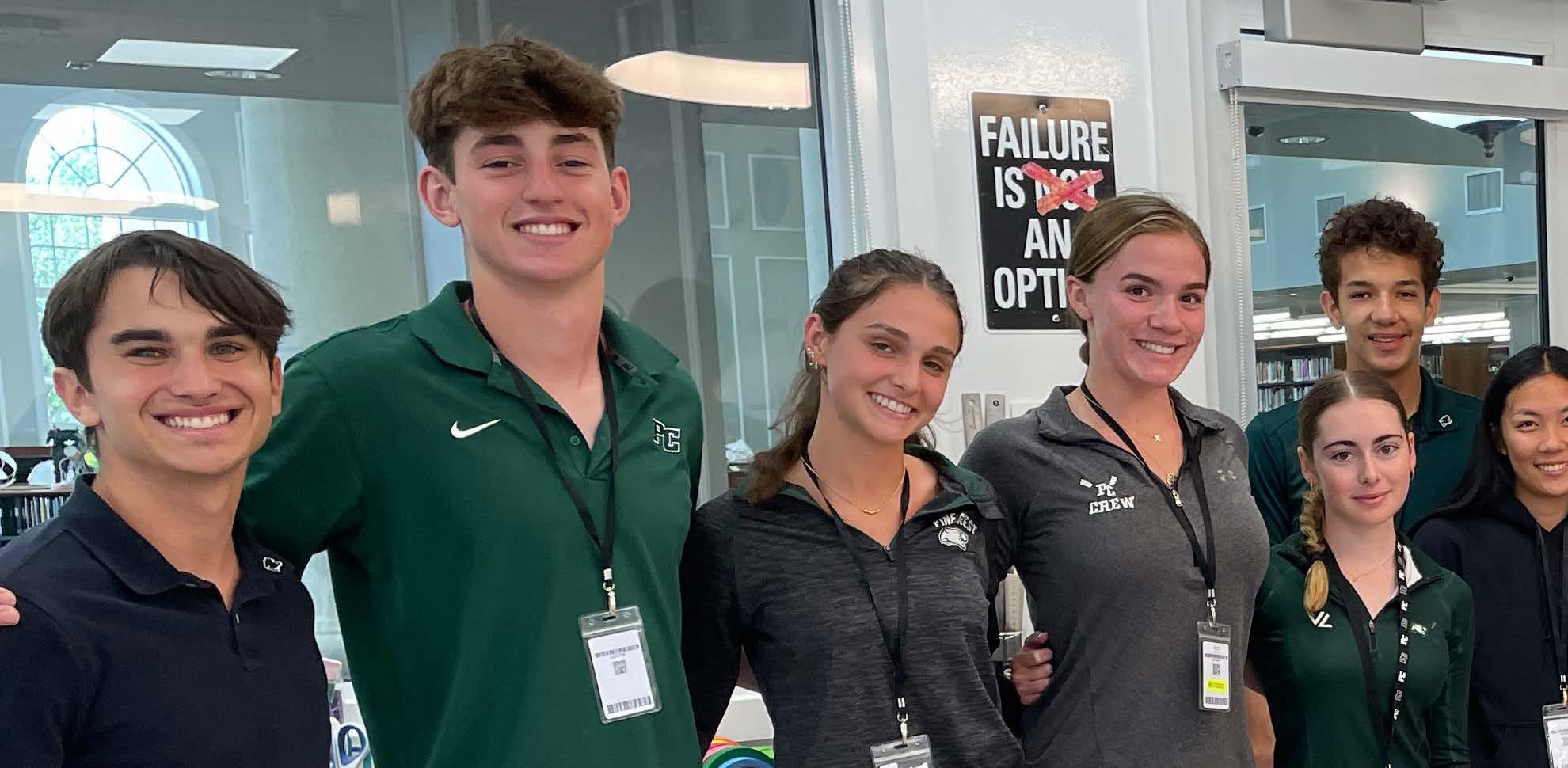
I WANT STUDENTS TO LEAVE THE PROGRAM PREPARED TO LOOK AT THE WORLD, RECOGNIZE PROBLEMS, AND IDENTIFY SOLUTIONS.”
–MRS. KERI KOLETTIS
year projections, branding and marketing, and work in the School’s makerspace, the Zimmerman Family iLab, for prototyping.
During the final year of the program, students focus on customer discovery, including journey maps and personas, and exploring leadership styles such as Level 5 Leadership, which encompasses personal humility and professional will.
Throughout the three years, students are required to complete two 80-hour internships and hold a sustained mentorship with a fellow entrepreneur in addition to participating in a variety of competitions.
“Competition breeds innovation, and innovation breeds entrepreneurship,” said Mrs. Kolettis. “Every year has a capstone element like design sprint, which takes place over three to five days where teams of students are tasked with solving a problem.”
Students recently traveled to the Dunn School in Los Olivos, California
to compete in the Diamond Challenge, the world’s top-rated entrepreneurship competition for high school students. The competition was created through Horn Entrepreneurship, the creative engine for entrepreneurship education and advancement at the University of Delaware. Teams from around the world pitched their social innovations and business models to industry leaders.
Five Pine Crest teams were chosen to pitch their products and services in front of a live panel of judges, where 850 other teams from 77 countries also pitched.
Logan Schwedelson ’26, Johanna Henry ’26, Eshaan Atreya ’26, and Hunter Gittlin ’26 of team DeCarb won first place at the competition and will advance to the Diamond Challenge Global Summit to compete against the 50 top teams in the world. Their product is a catalytic converter that minimizes carbon emissions. Follow Pine Crest on Instagram (@ pinecrestschool) for updates.
“I want students to leave the program prepared to look at the world, recognize problems, and identify solutions,” said Mrs. Kolettis. Rather than fixating exclusively on business principles, economics, and finance, students also need to be exposed to an array of content curricula that encompass innovation, entrepreneurship, design thinking, engineering, marketing, and social media. Many will leave and continue building out their start-ups, but entrepreneurship is not necessarily what every graduate of the program wants to pursue.”
Looking ahead, Mrs. Kolettis continues to integrate globally-focused learning opportunities into the program.
In 2022-23, a cohort of juniors participated in a Pioneer Academics Global Problem Solving Institute pilot program where they worked with peers from five other countries on two prompts: Disabling Non-Communicable Diseases and Food Fixes and the Climate Crisis.
48 | PINE CREST SCHOOL
The Class of 2025 cohort with Will Conway ’04, COO of City Furniture and Entrepreneur in Residence
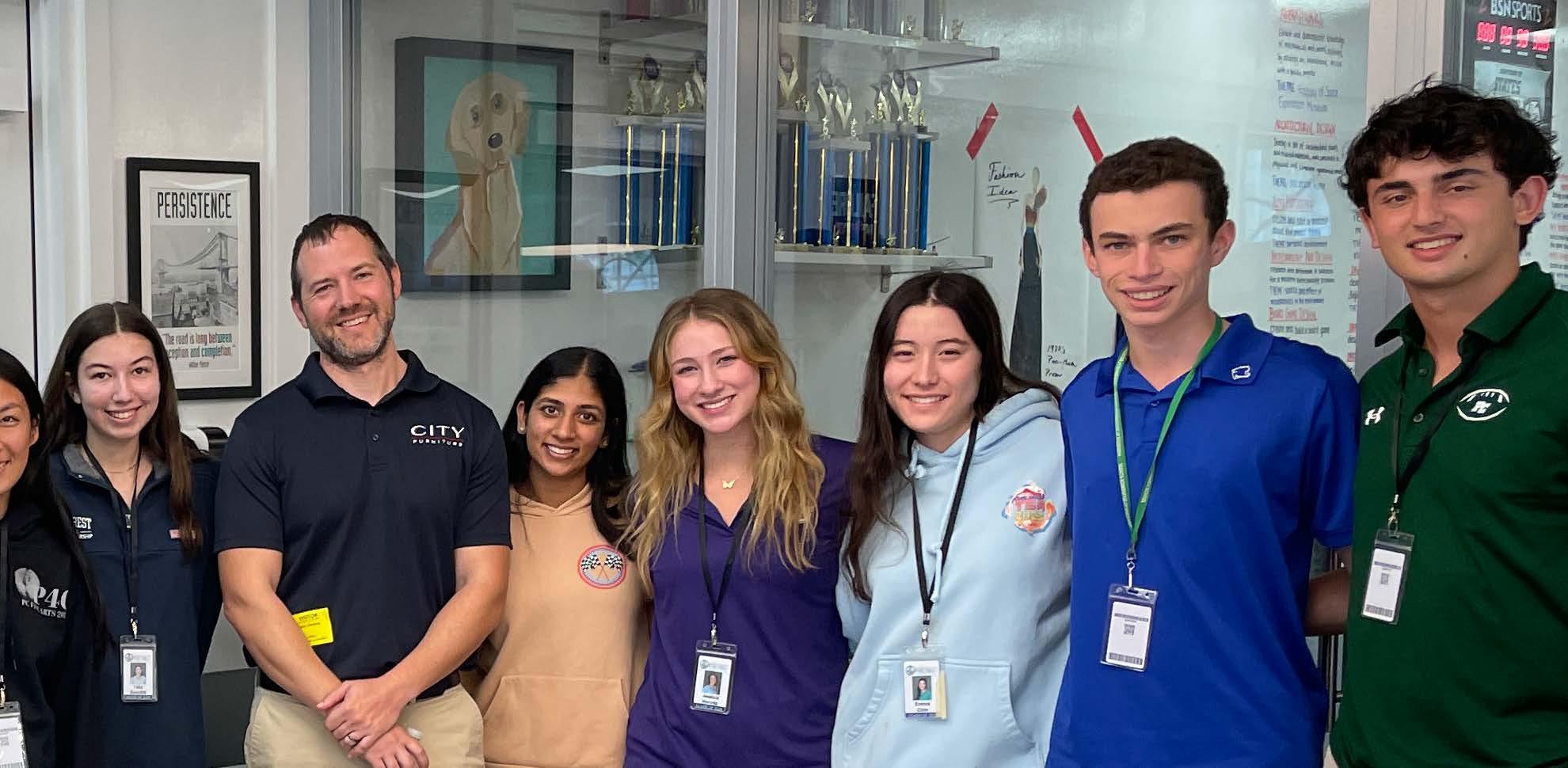
Mrs. Kolettis presented pilot results with Pioneer researchers at a co-curricular summit. Following, Pine Crest received an invitation from Pioneer for three groups of five students each to participate in the 2023-24 program focusing on Analyzing AI: Taming the Technology that is Shaping our Future, Addressing the Challenges of Chronic Conditions, and Improving Access to Clean Water. Pilot Program. Hover over the QR code with your mobile device to read “Pine Crest Upper School Students Participate in Global Problem-Solving Institute Pilot Program” by Elani Kodner ’24.
New this year is an Entrepreneur in Residence program aimed at bridging the gap between academia and the real-world business environment, providing students with valuable insights into entrepreneurship and innovation through sustained mentorships with industry leaders. In collaboration with the Polsky Center for Entrepreneurship and Innovation at the University of Chicago Booth School of Business, students are actively participating in a virtual Instructor Series. The first session focused on Identifying and Understanding a Problem with a Sustainability Mindset and
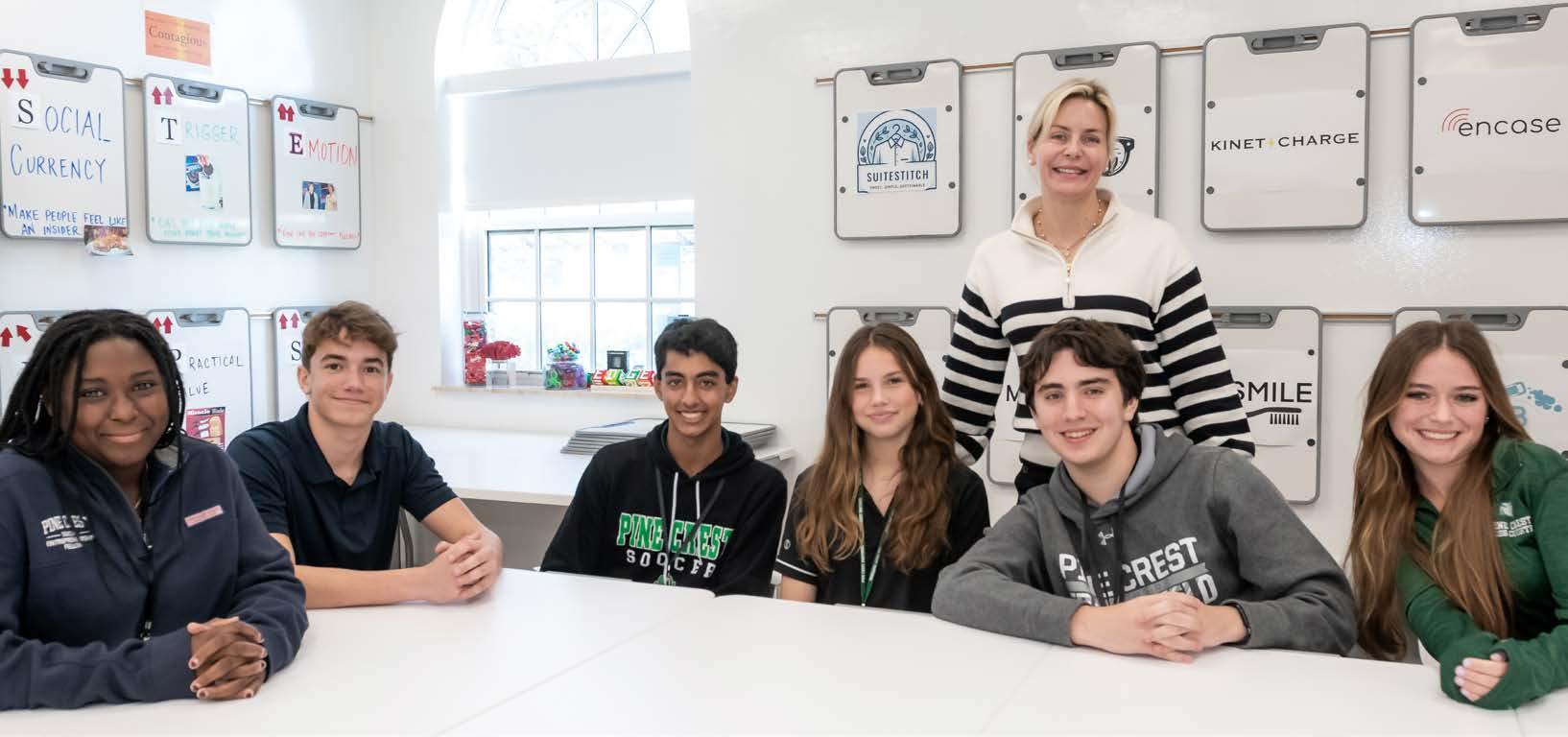
innovating for resilience, and throughout the semester will learn from Polsky Center experts about translating deep technology innovations into startups that bring world-changing science and technology to market.
“As Dr. Markham says, our world needs leaders who think deeply with a global perspective, and who have the courage to challenge the norm, break barriers, and move forward with confidence,” said Mrs. Kolettis. “The social entrepreneurship program is equipping students with skills and this mindset. We are educating students to own the future.”
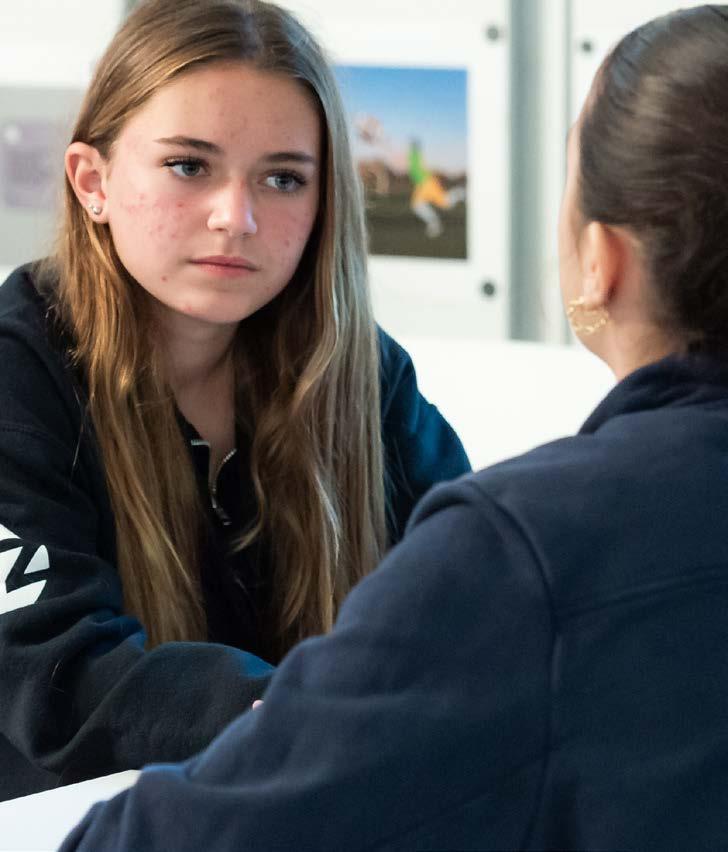
PINE CREST SCHOOL | 49
Mrs. Keri Kolettis and members of the Class of 2026 cohort
Aurora Christiansen ’26 listens as her group member shares an idea.

PINE CREST SCHOOL ATHLETICS REINTRODUCES WRESTLING
WRESTLING HAS BEEN REINTRODUCED TO PINE CREST SCHOOL ATHLETICS! Not only has the program generated fond memories for Pine Crest alumni, but in just three years, wrestling has already made proud additions to the Stacy Gym trophy case!
“There is a committee that reviews new sport requests twice a year,” said Dr. Jeff Johnson, Athletic Director. “The process to start a new sport is extensive, and it must be a thoughtful and intentional process. The timing of the wrestling season does not dilute the pool of athletes from our other programs, and it provides another participatory opportunity for students. We are also able to host wrestling off-campus, which means that we do not have to reallocate resources or spread ourselves too thin with our other programs. That weighed heavily in favor of reinstating the program.”
Wrestling fills an athletic void in the winter season for student-athletes who do not play basketball or soccer. “Wrestling is a contact sport that complements football,” said Dr. Johnson. “It’s easy for football players to transition to wrestling after the season to stay in shape and continue competing at an elite level. It is an individual team sport and one of the most physically challenging sports there is from a strength and endurance standpoint.”
Since the team’s first season during the 2021-22 school year, Nathan Chen ’25 has been a standout student-athlete. A football player in the fall, Nathan said he was excited to follow in the footsteps of his dad, Dr. Gordon Chen ’97, and his uncle, Dr. Christopher Chen ’94.
“My dad wrestled when he was a student at Pine Crest, and so did my uncle,” he said. “I have been practicing jiu-jitsu since I was 12, so I am comfortable with mat work and very familiar with that kind of sport.”
In his first year, Nathan was the district runner-up in the Florida High School Athletic Association (FHSAA) district meet, qualifying to compete at the regional meet. There, he finished in the top 15 in the region for the 185-pound weight class.
In the 2022-23 season, Nathan earned the district title, advancing with four teammates to the regional final, where he finished sec-
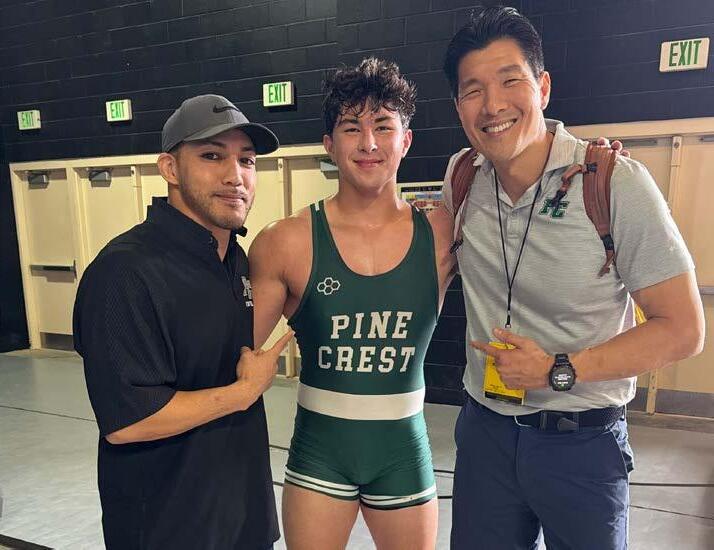
ond and advanced to the state meet. There, he competed in the 215-pound weight class and finished seventh in the 1A classification for the State.
“Wrestling is a lot harder than the other sports I play,” said Nathan. “The group that wrestles is a lot smaller than the other teams I am a part of. Wrestling builds perseverance and mental toughness through its level of difficulty. Training is more intense than my other sports in some aspects, like cardio, which we do quite a bit of. We run with people on our backs, do bear crawls, and spar, and unlike football where you get short breaks, you have to be always alert and engaged, or you’ll be beaten.”
This year, the wrestling team had another successful season, posting a strong showing with Nathan finishing third in the FHSAA 1A state championship in the 215-pound weight class.
The team finished the season with four wrestlers ranked in the top 25 in Florida for their weight class. Nathan is ranked second in the 215-pound weight class, Ethan Stone ’26 is ranked seventh in the 175-pound weight class, Parker Dettor ’25 is ranked 14 in the 152-pound weight class, and Andrew Chen ’27, Nathan’s younger brother, is ranked 21 in the 157-pound weight class.
The reintroduction of wrestling has been exciting for current and former student-athletes. “Wrestling has rallied our alumni—they’re happy to see it back,” said Dr. Johnson. “It continues to make our athletic offerings strong. It is exciting to provide more opportunities for student-athletes to compete without jeopardizing our other programs.”
Pine Crest Wrestling Coach Miguel Rodriguez, Nathan Chen ’25, and Gordon Chen ’97.

SAVE THE DATE!
ALUMNI REUNION WEEKEND
APRIL 25 AND 26, 2025
We are looking forward to welcoming you and your fellow Pine Crest alumni back to campus! Join us for a weekend of events and reconnecting with old friends, former teachers, and more.
FOR MORE INFORMATION VISIT info.pinecrest.edu/alumni-reunion-weekend
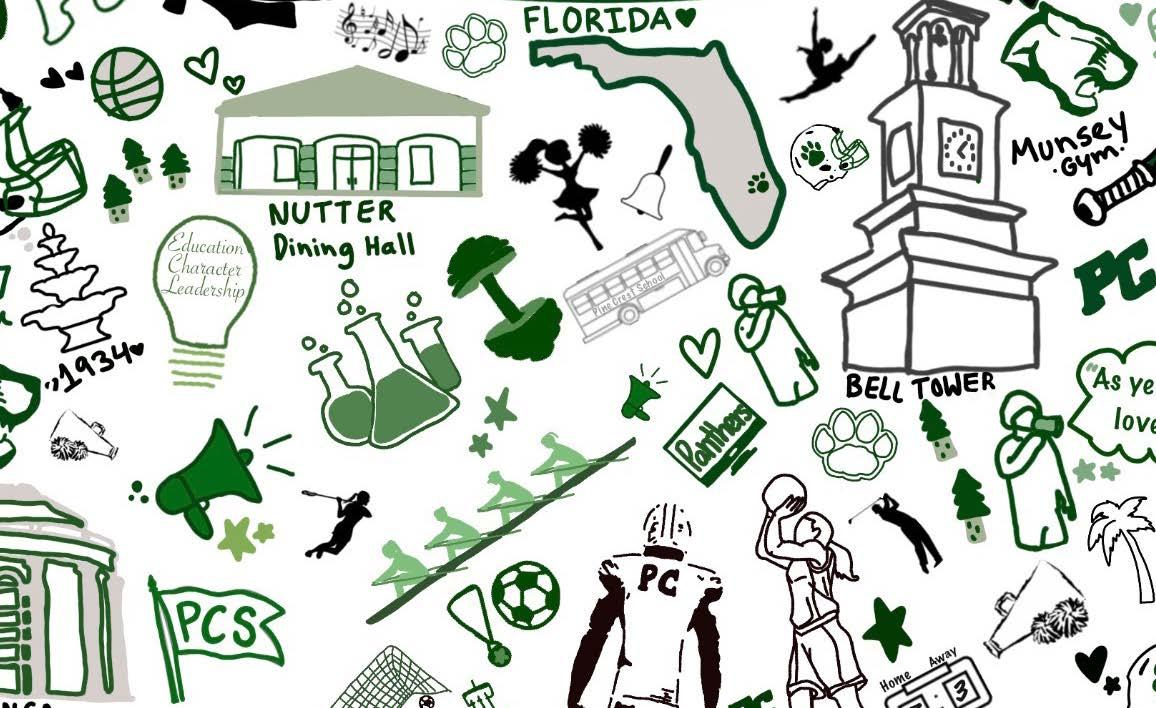
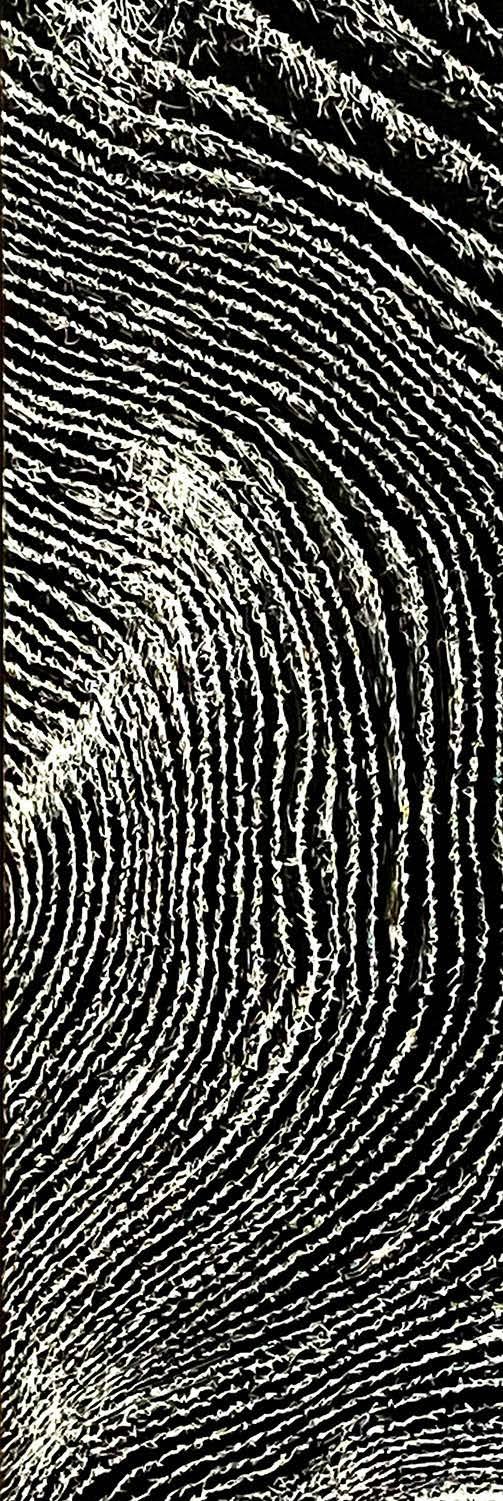















 Dr. Dana Markham ’18H President
Dr. Dana Markham ’18H President












































































